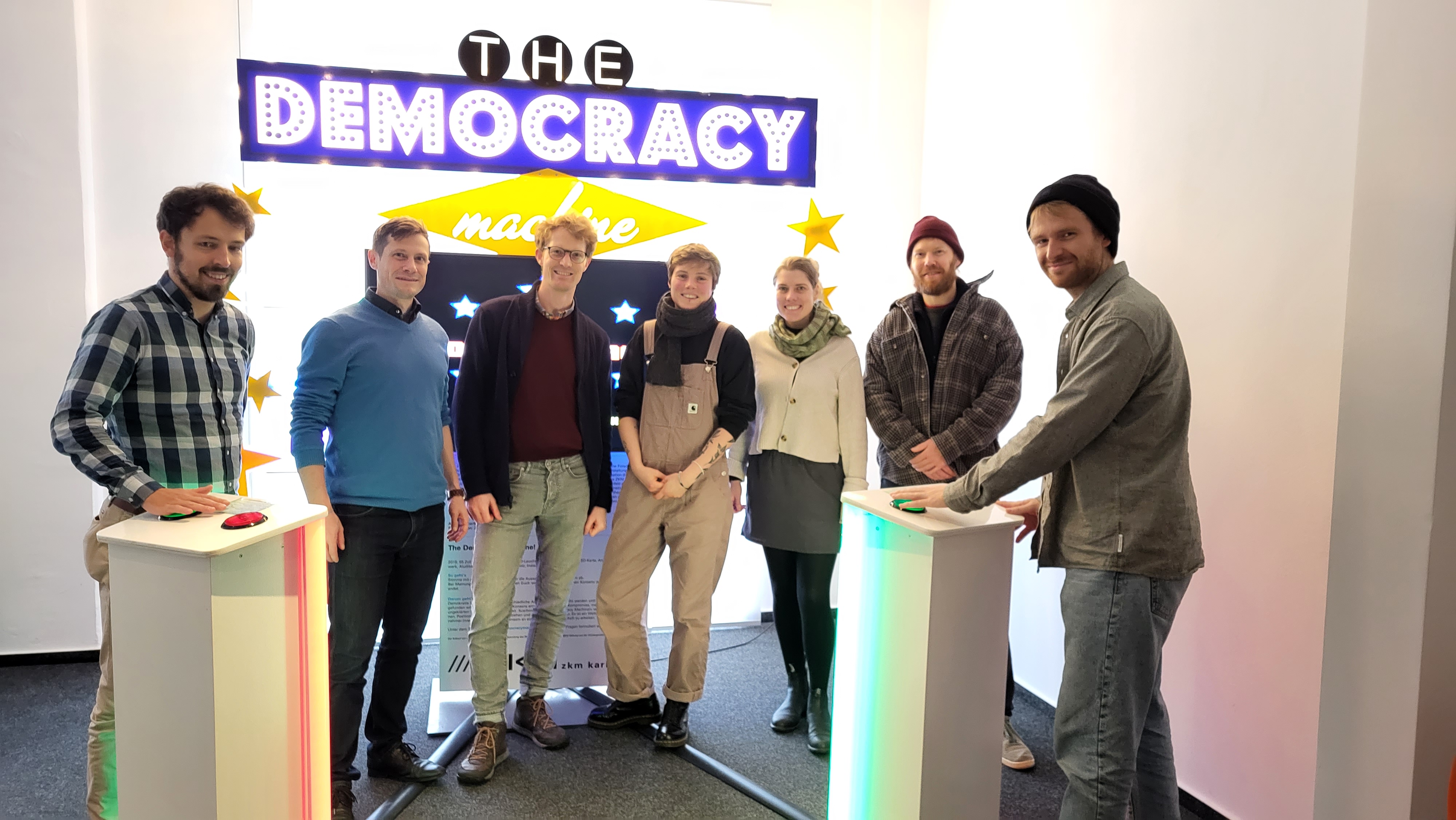News
August 2025: Presentation of chair members at EAAE congress
This year's annual congress of the European Association of Agricultural Economists (EAAE) took place at the University of Bonn, Germany. It was also the 50th anniversary of this association. Chair member Marcel Böhl presented his work "Can Inequality & Biodiversity Loss Be Tackled Together?" (joint work with T. Kopp and M. Nabernegg).

Prof. Kopp presented the papers "Reducing Negative Effects of Risk Aversion on Farming Outcomes: Evidence for Systematic External Selection into Profitable Contracts" (with A. K. Mishra and A. Dsouza) and "The Relation between Income Inequality and Dietary Diversity" (with A. Risius and M. Nabernegg).


August 2025: 9th International PhD Meeting in Economics 2025
Group member Dilsuz Nurmukhanmatova participated in the 9th International PhD Meeting in Economics 2025, held in Thessaloniki, Greece on July 10–11. She presented the working paper “Market Power, Digitalization, and Income Inequality in Europe,” where she discussed how digitalization and corporate markups interact to shape inequality trends across European economies.
The Meeting brought together doctoral researchers from across Europe and beyond, offering an excellent opportunity to exchange ideas, receive constructive feedback, and engage in discussions on cutting-edge topics in economics.

August 2025: Advertisement for student assistant position
The Professorship for Global Nutrition and Trade at the University of Gießen advertises the position of a Research Assistant with a Bachelor's degree to start on 01.10.2024 with the following conditions:
- 8 Hours per week at a monthly salary of EUR 486.
- Permanent presence in Gießen will not be required.
- Candidates must have obtained a BA degree and be enrolled in a German university.
Applications are to be sent to thomas.kopp@uni-giessen.de before September 14, 2025.
More details can be found under this link:
August 2025: Rethinking Economics Summer School on Heterodox Strategies on Housing, Energy, and Agriculture against the New Right
Group members Aimen Abbas, Ayça Akçakoca, and Vipul Chawla participated in the Rethinking Economics Summer School, organized by the Institute for Transformation and Economy Studies . The Summer School brought together academics and practitioners to explore diverse economic schools of thought and to engage in discussions on anti-fascist economics—its causes, consequences, and potential courses of action.
During the Summer School, participants examined topics such as housing system transformation through systems thinking and financialization, the role of agriculture in sustainable food transitions, and energy policy and climate action in the context of politicization and populism.

Vipul Chawla presented his work on “Income Inequality and Housing Living Space in Europe.” His workshop invited participants to reflect on critical questions, including what constitutes adequate housing, how housing living space can be measured, and which factors influence housing adequacy. His study explores the relationship between income inequality and housing living space, with a focus on how this relationship differs between post-socialist and non-post-socialist countries in Europe.

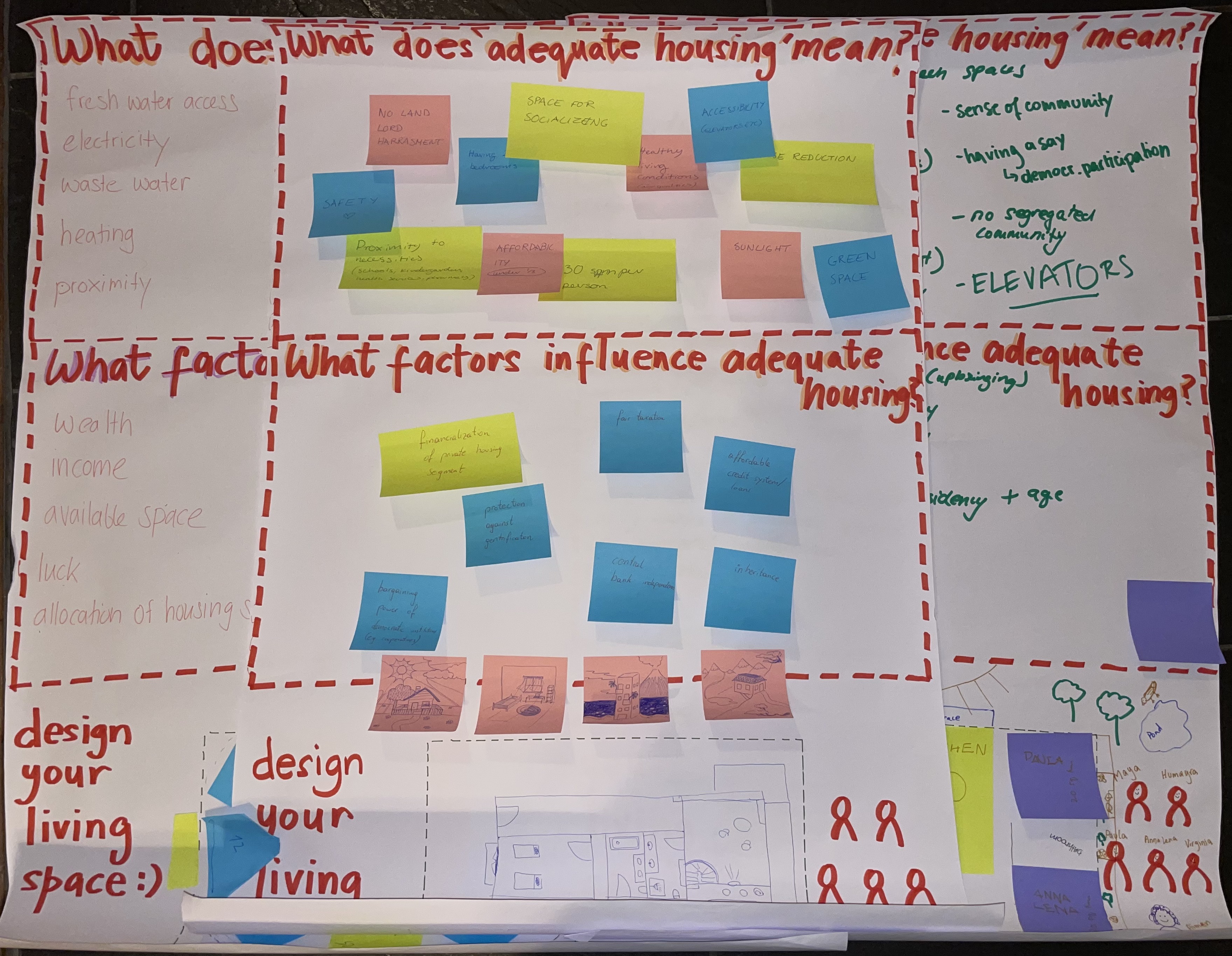
August 2025: Annual Meeting of the Applied and Agricultural Economics Association in Denver, Colorado and research stay at UC Davis
This year's annual meeting of the AAEA took place in Denver Colorado. Tom Kopp presented the joint work with Alwin Dsouza (New Mexico State University) and Ashok K. Mishra (Arizona State University) entitled "Reducing Negative Effects of Risk Aversion on Farming Outcomes: Evidence for Systematic External Selection into Profitable Contracts." The attendance at the conference was followed by a visit to friend and colleague Richard J. Sexton at the University of California, Davis.
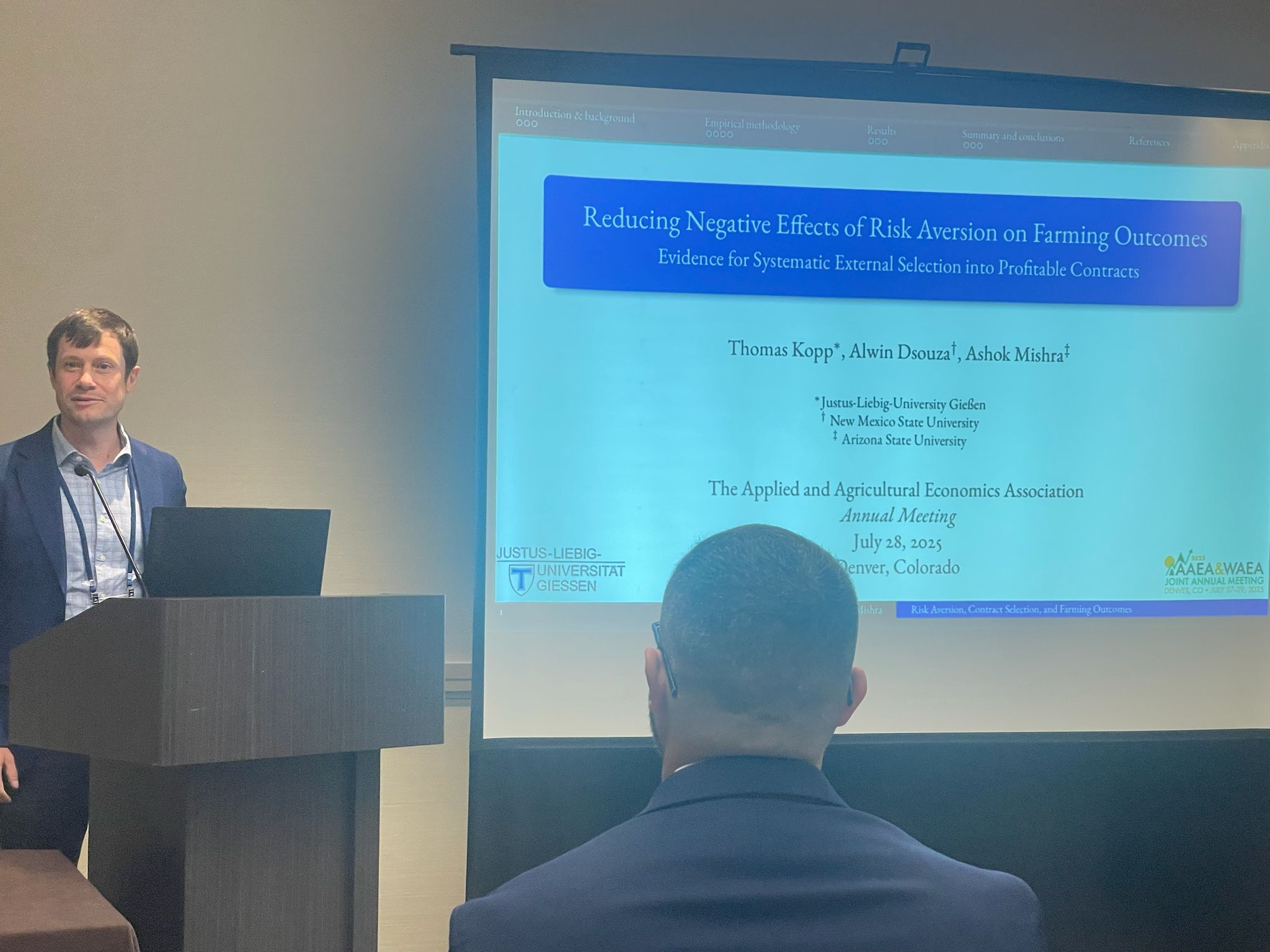
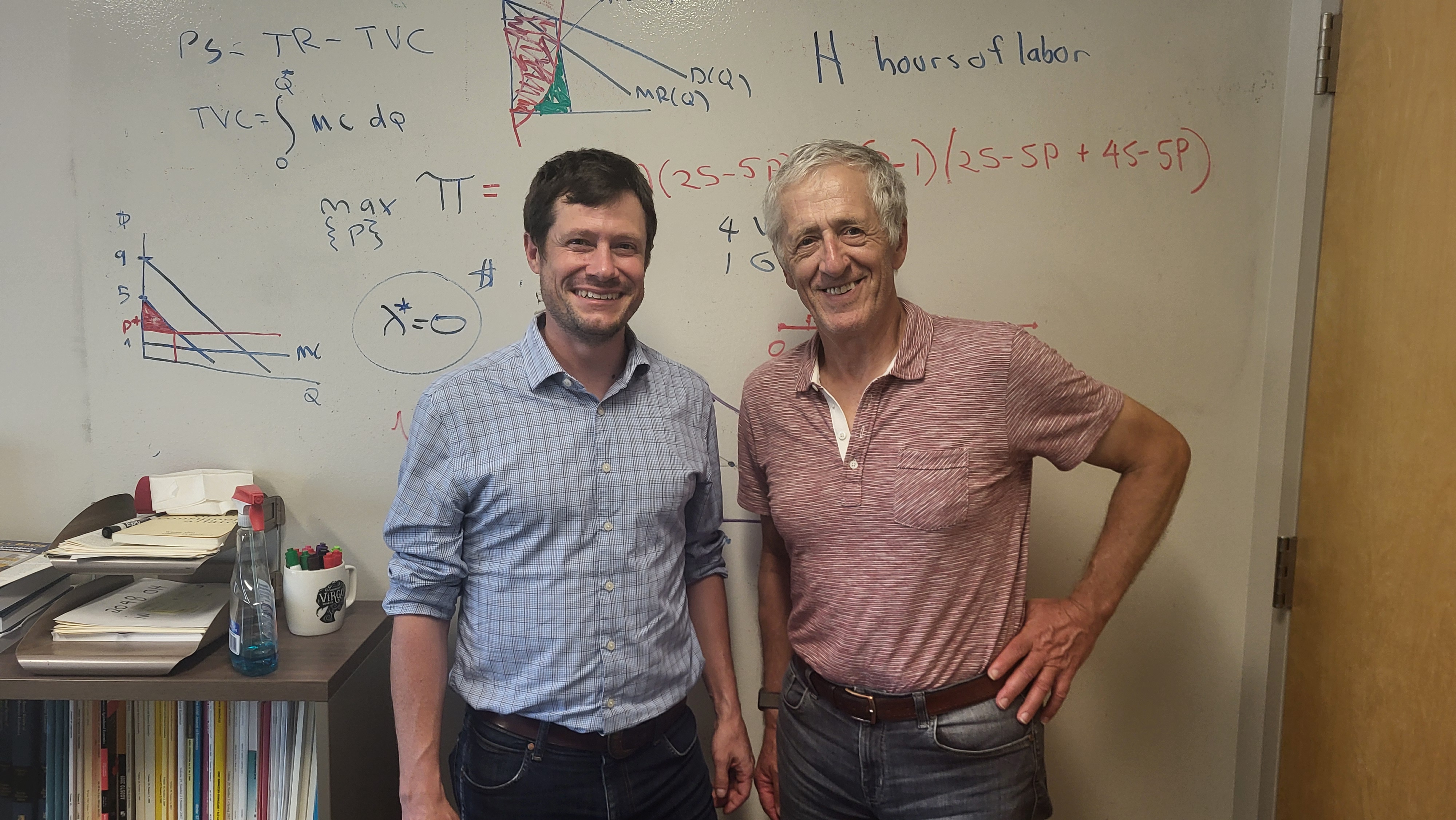
June 2025: Participation of several group members at ISEE/Degrowth Conference in Oslo
Several members of our group visited Oslo/Norway to attend the 18th Conference of the International Society for Ecological Economics (ISEE) which was also jointly organized as the 11th International Degrowth Conference.
Five Phd candidates as well as Professor Kopp presented their current work and enjoyed the discussions with the attendees of the conference.
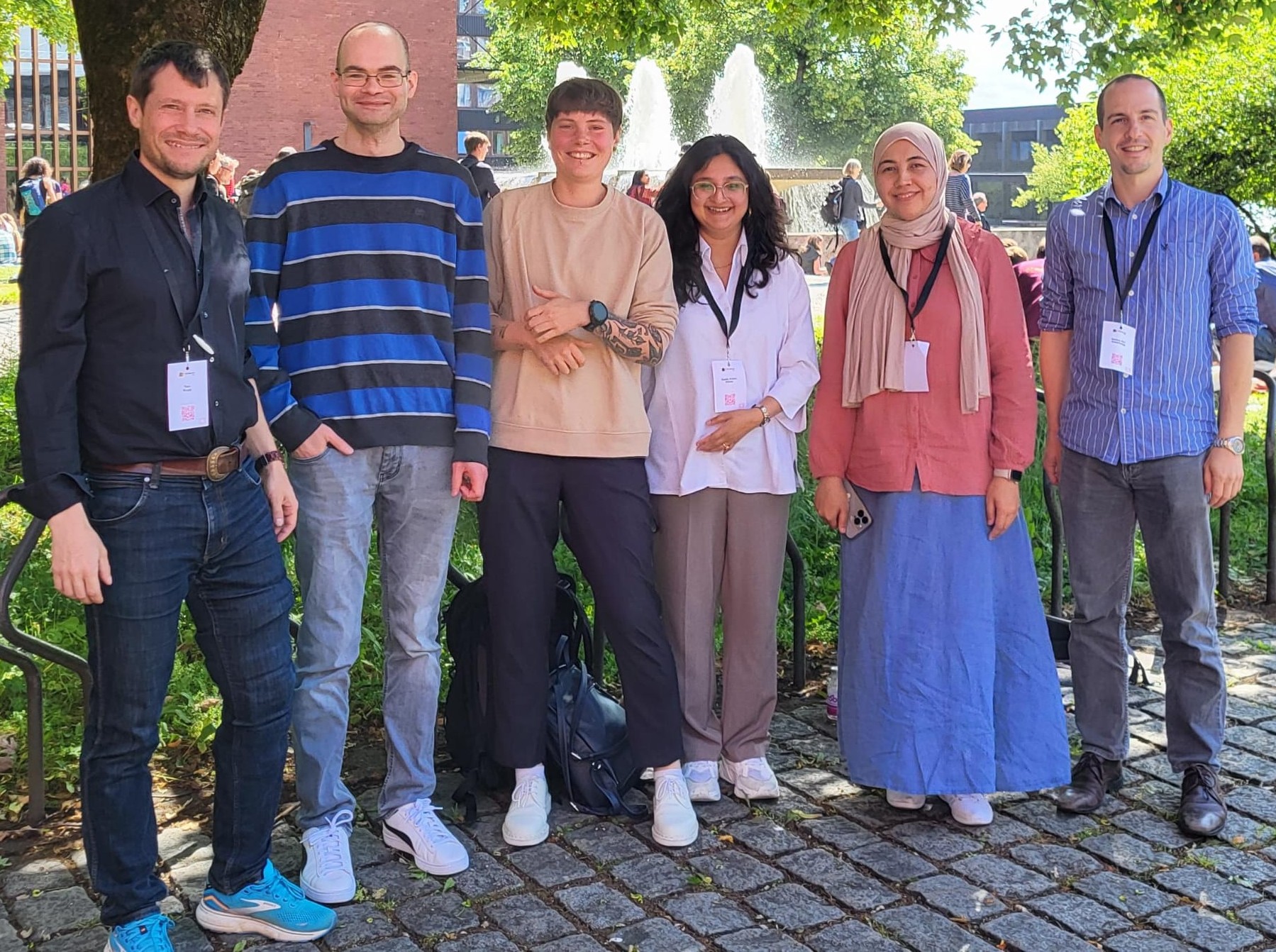
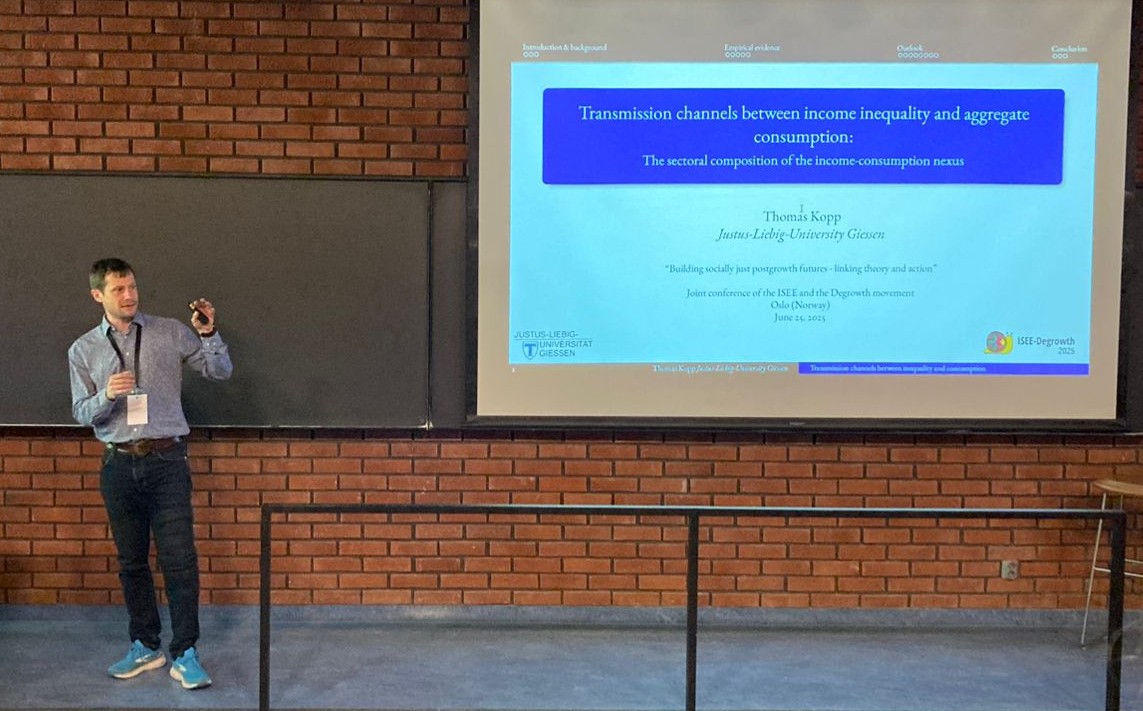
Dilsuz Nurmukhanmatova presented her study, "Market Power, Digitalization, and Income Inequality in Europe", in which she revealed that while higher firm‑level markups tend to amplify income inequality, increased ICT investment significantly attenuates these inequality‑widening effects of market power.
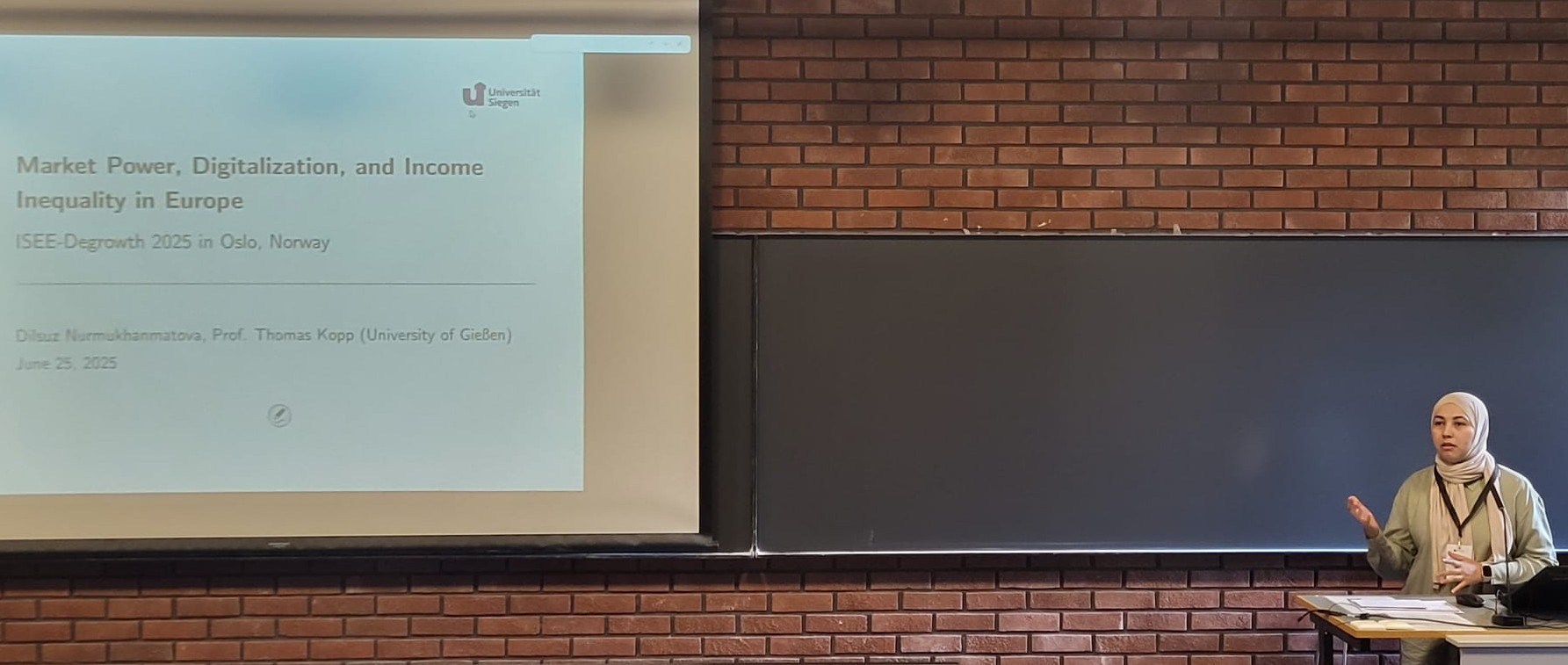
Aimen Abbas gave insights on her study "Assessing the Distributional Impact of Environmental Policy Stringency in the EU". This study finds that stricter environmental policies raise pre- and post-tax national income inequality, but, thanks to taxation and in-kind transfers, have no significant effect on disposable income inequality.
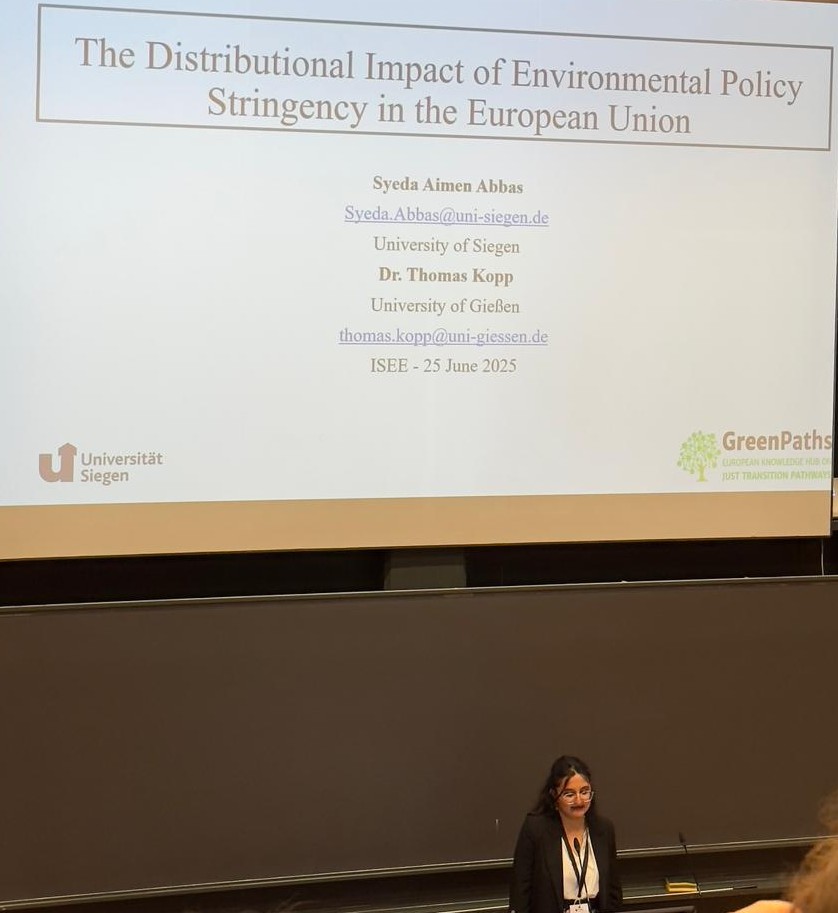
Marcel Böhl’s study, “Can We Tackle Inequality & Biodiversity Loss Together?” indicates that in high‑income countries, efforts to reduce inequality alone can inadvertently harm biodiversity, highlighting the necessity of pairing redistribution policies with targeted conservation measures to safeguard ecosystems in these countries.
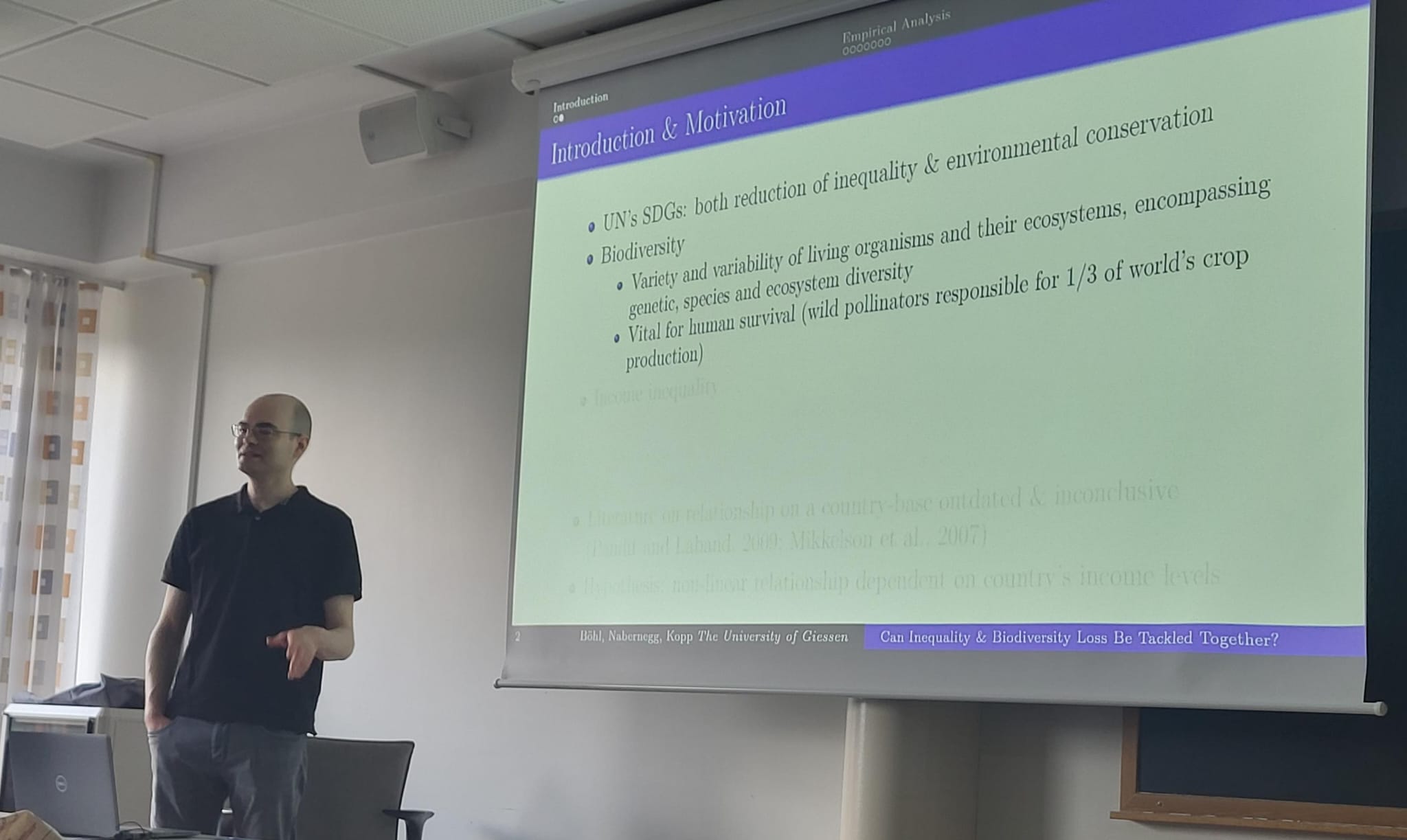
Inga Stademann presented her work "Success determinants and impact of sustainability projects on overall sustainability of universities" in the form of a poster. She finds that early planning for project continuation and aligning project goals with institutional sustainability strategies contribute meaningfully to long-term transformation efforts.
Markus Nabernegg presented his work "Extreme Income Inequality in Ecuador - Dollarization, Commodity Price Boom, and Citizen Revolution in Ecuador", revealing that Ecuador's economy shifted from an extractive to a weakly inclusive system during commodity booms, but rising economic power concentration and the COVID-19 shock have eroded redistribution and threatened this fragile process.

Thomas Kopp displayed his research titled "The Relation between Income Inequality and Dietary Diversity". This study finds that cutting income inequality boosts dietary diversity in moderately and highly unequal societies but can reduce it in already equal ones, so efforts to lower inequality should also protect diet variety.
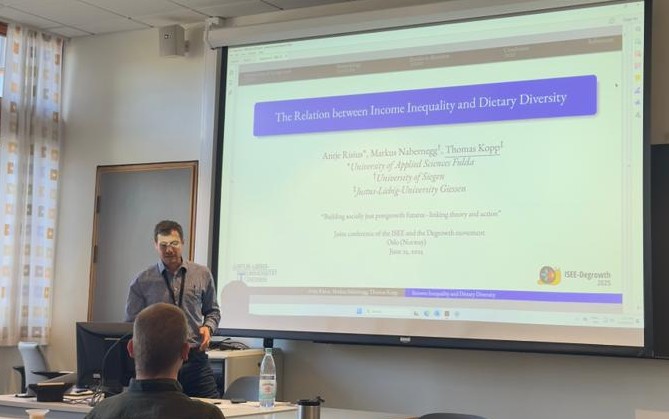
Thomas Kopp and Markus Nabernegg also organized a special session entitled "New Research on the Relationship between Economic Inequality and Environmental Impact", which brought together leading scholars in the field - including Lutz Sager, Ilona Otto, Svenja Flechtner, and Steffen Lange - to examine the trade-offs between inequality and environmental degradation and to challenge the political and economic paradigms shaping the inequality-ecology nexus.
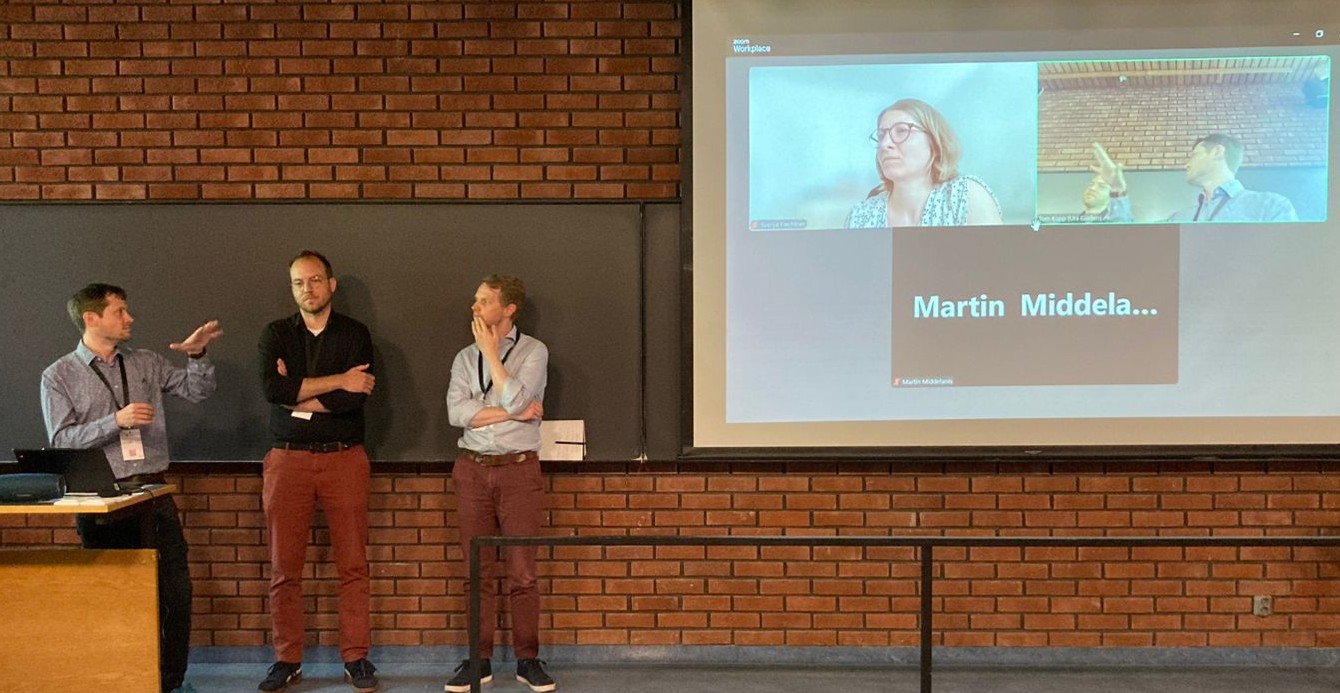
April - July 2025: Hybrid lecture “World Food Systems in Transition” (ICODICE project)
We are running hybrid online classes with students from the University of Gießen (JLU) and Kerala Agricultural University (KAU) on “World Food Systems in Transition.” The course is part of the “Internationally Connected Digital Classroom Education” (ICODICE) project.
Students follow lectures by Prof. Dr. Thomas Kopp (JLU) and Prof. Dr. Archana Sathyan (KAU), give joint presentations in cross-university groups, and take part in small-group discussions in online breakout rooms. The course examines alternative models for sustainability in global food systems.

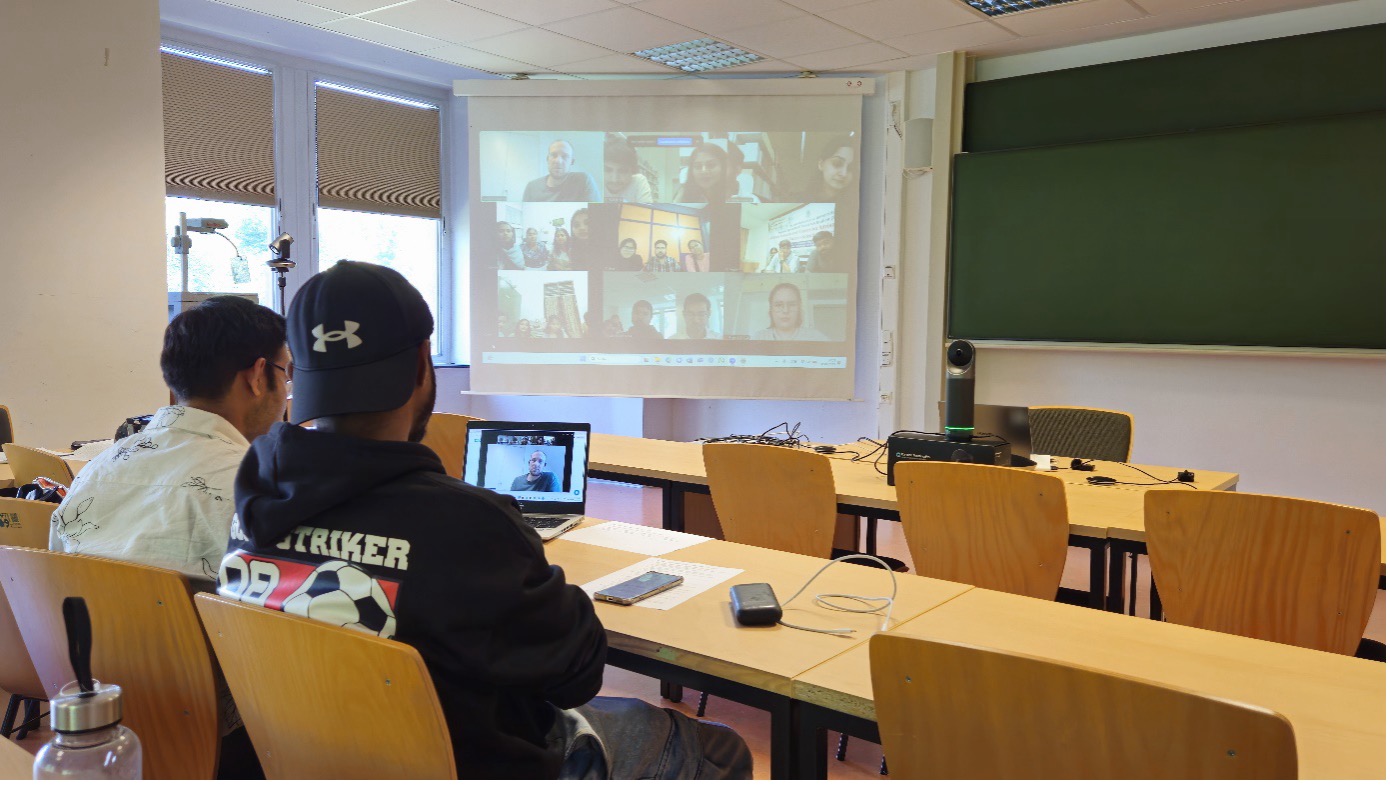
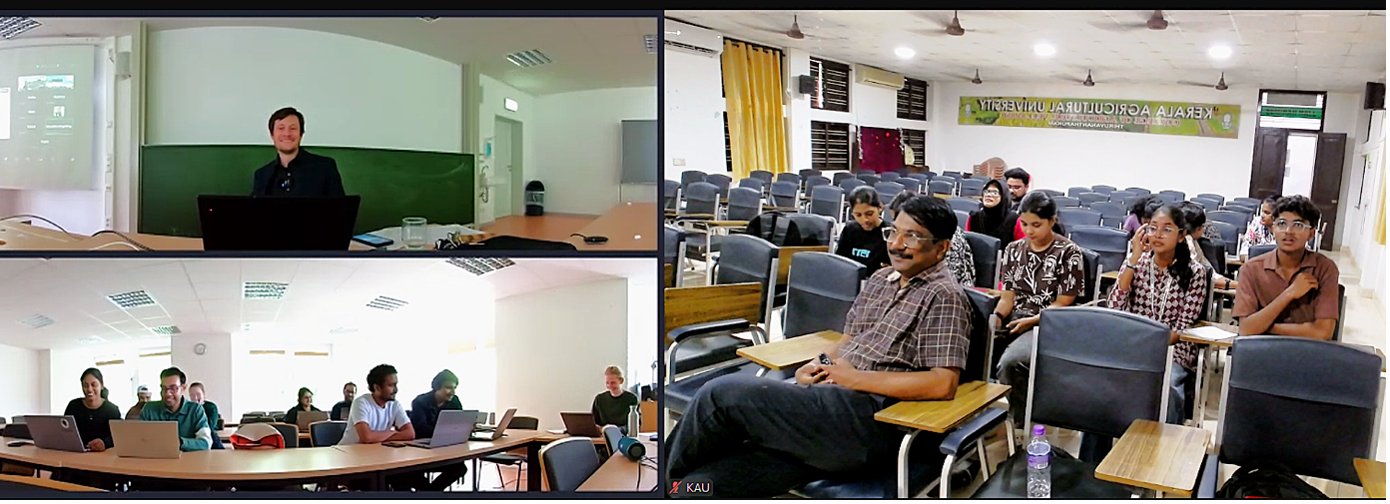
June 2025: Last ICODICE online seminar of the summer term took place
As part of the ICODICE (Internationally connected digital classrooms education) project, students from the University of Siegen and the Kerala Agricultural University (KAU) worked together online to design activities for an upcoming online session between school classes in Kerala and Germany.
The goal of the session was to prepare the achievement of learning objectives on urban agriculture and watershed management in the context of sustainable farming during the school exchange. This was the final session of the summer term, and everyone is now looking forward to finalizing the planning and carrying out the online exchange with the school classes in the winter term.
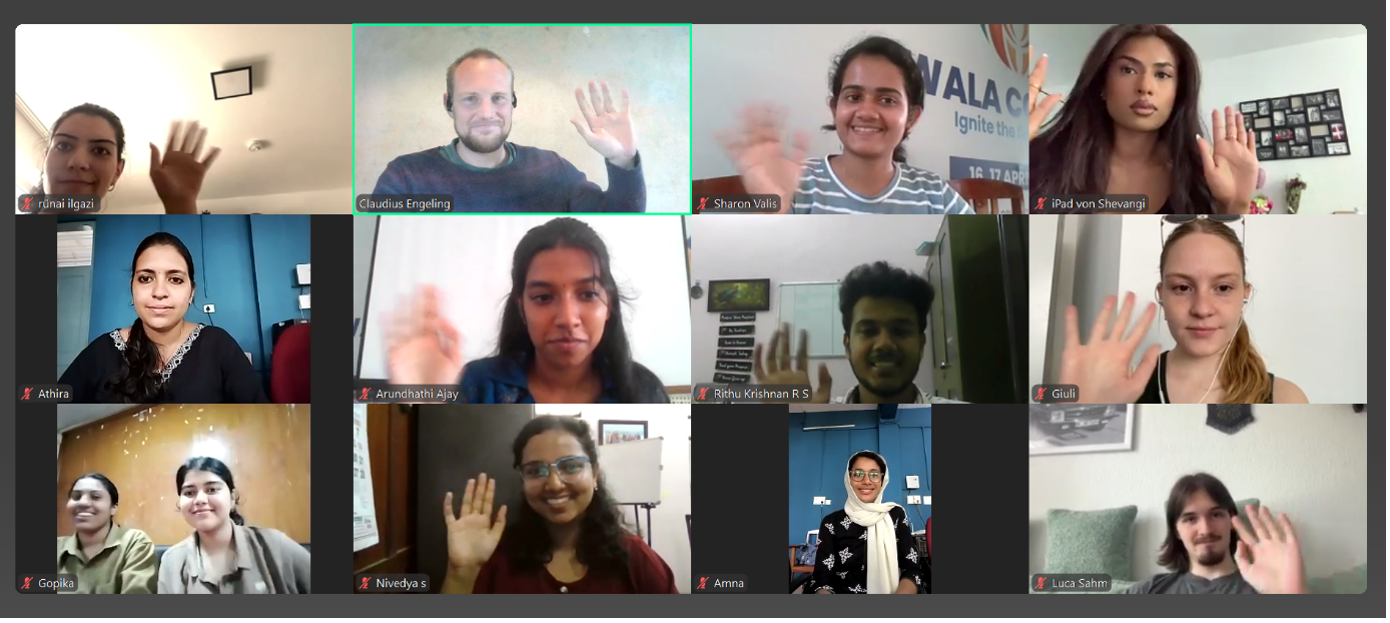
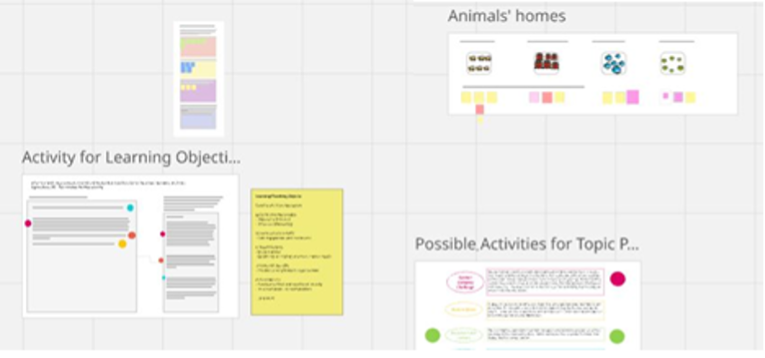
June 2025: Kick-Off Chair Meeting in Gießen
The Chair of the Professorship Global Trade and World Food Security conducted a team meeting on June 12 and 13 at the Zeughaus building at Justus-Liebig-Universität in Gießen. Chair members shared updates on their respective ongoing research projects and provided helpful feedback to each other's work. Since this was the team's first meeting in Gießen, the members enjoyed exploring the beautiful city and its surroundings.
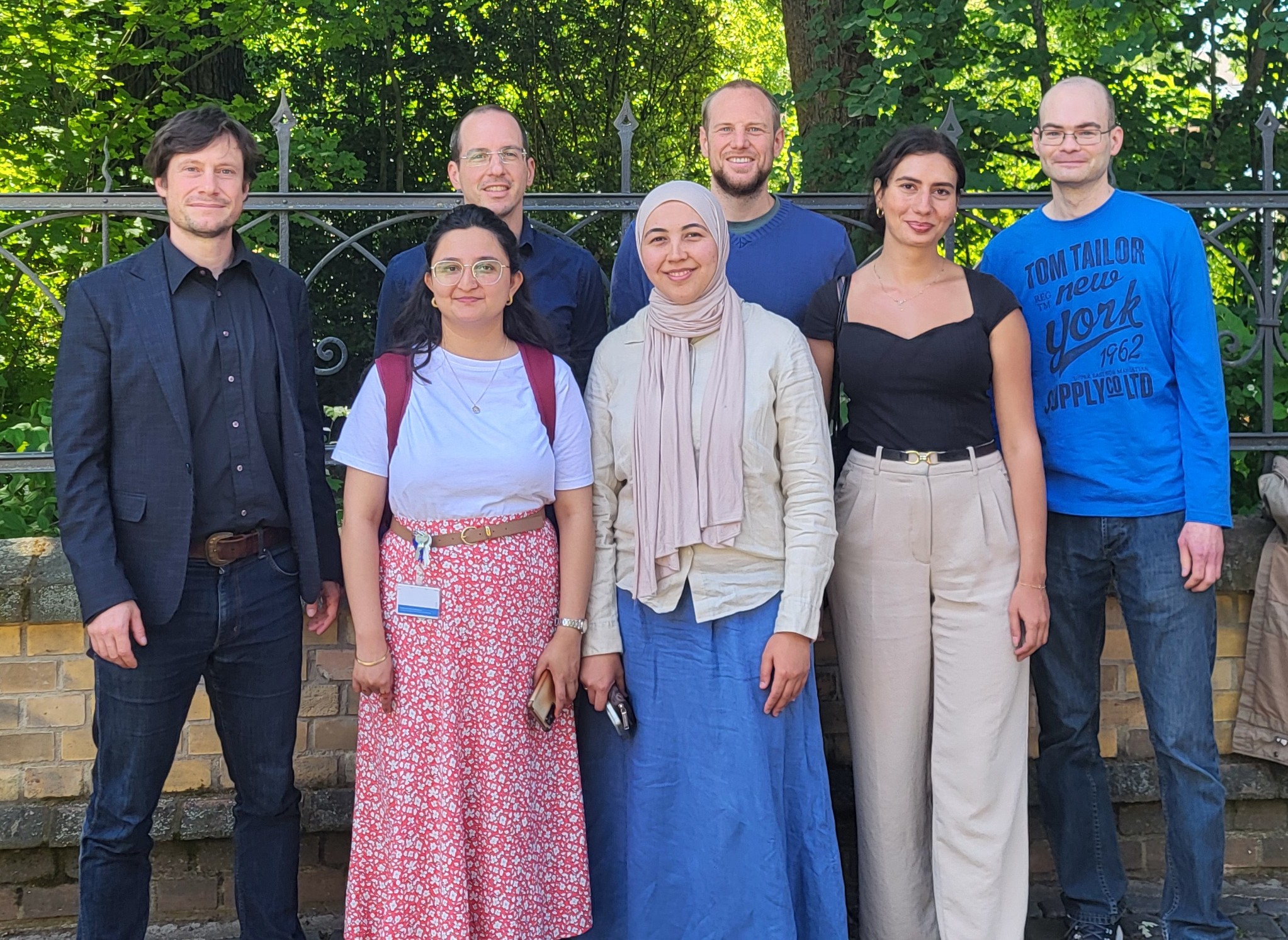
June 2025: GreenPaths Project Review Meeting in Brussels
Prof. Kopp and project staff member Aimen Abbas participated in the intermediate project review meeting of the Horizon Europe-funded GreenPaths initiative, held at the European Commission in Brussels. The meeting provided an opportunity to present the project's progress and outcomes to date. The contributions from the University of Siegen / Justus-Liebig-Universität Gießen were positively received.
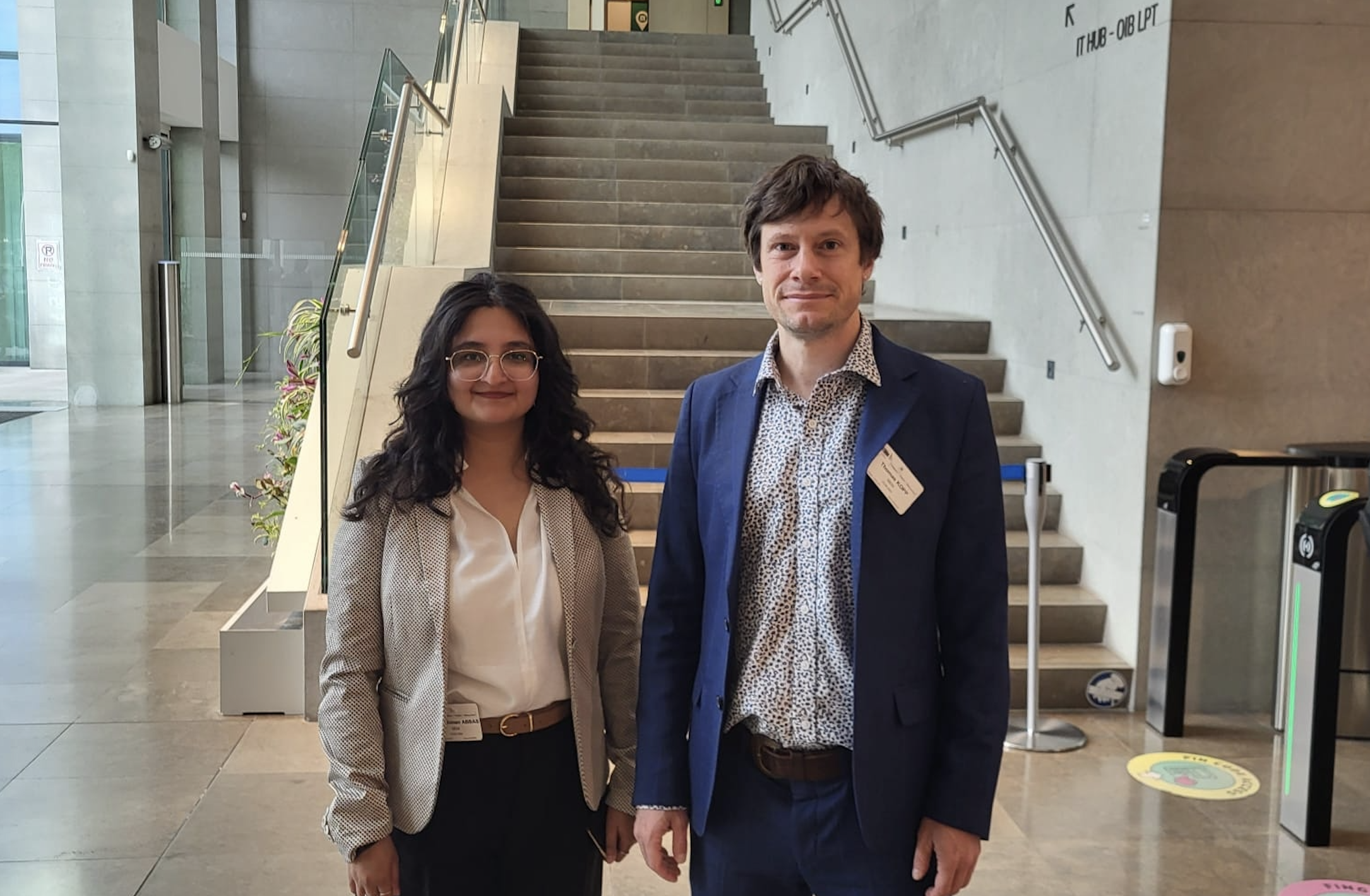
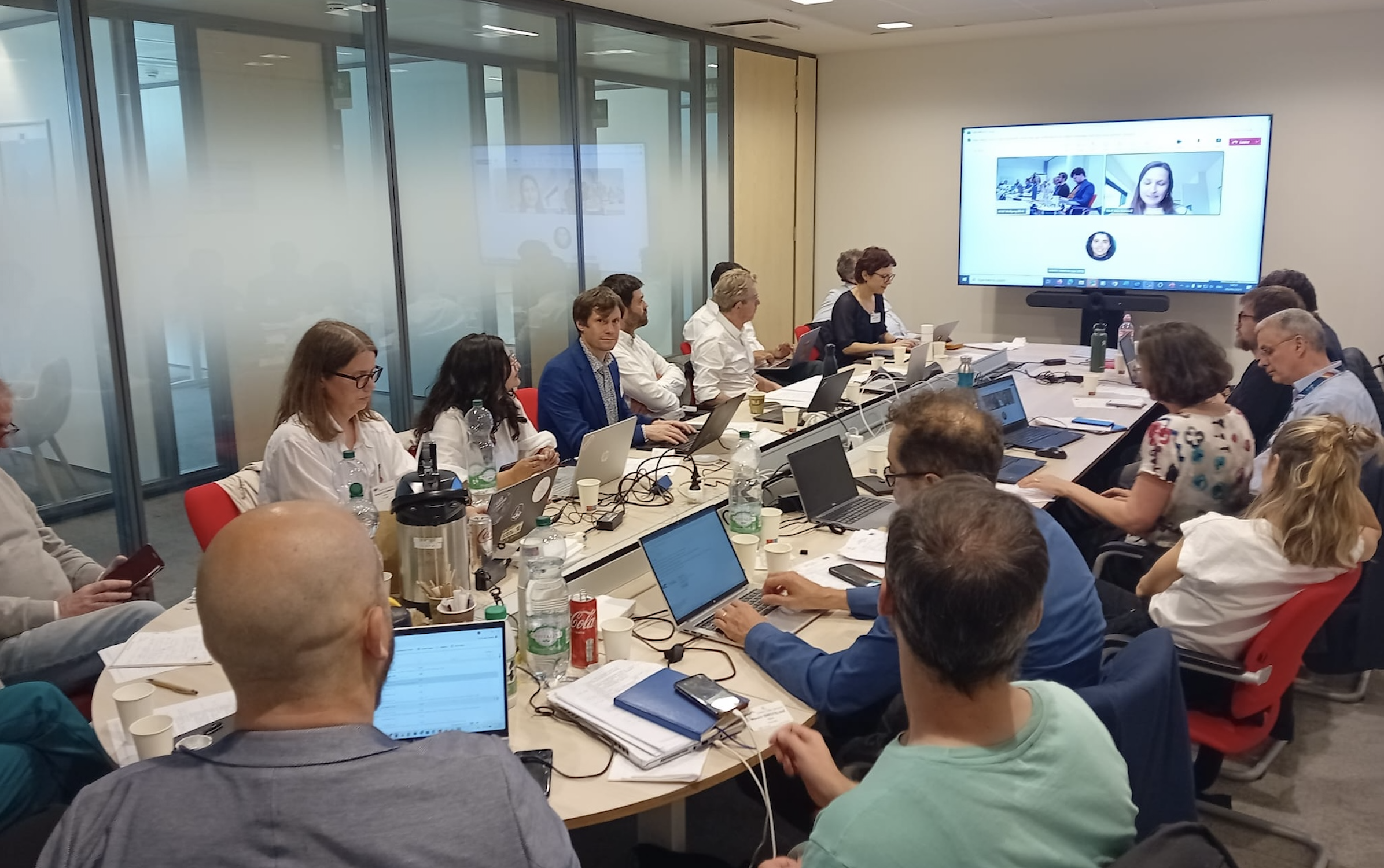
May 2025: Key Note Speech at the conference Sustainable Campus Thuringia
On May 22nd, Prof. Kopp opened the conference "Sustainable Campus Thuringia" which took place at the University of Jena, Germany. In his key note address, Tom Kopp gave an overview of the concept of Experimental Organisational Development and presented various applications, including the projects RAUM (Rooms, Work, Environment, Co-Creation) and Wo.W (Wellbeing in Science) which were and are conducted within the higher education system in Germany.
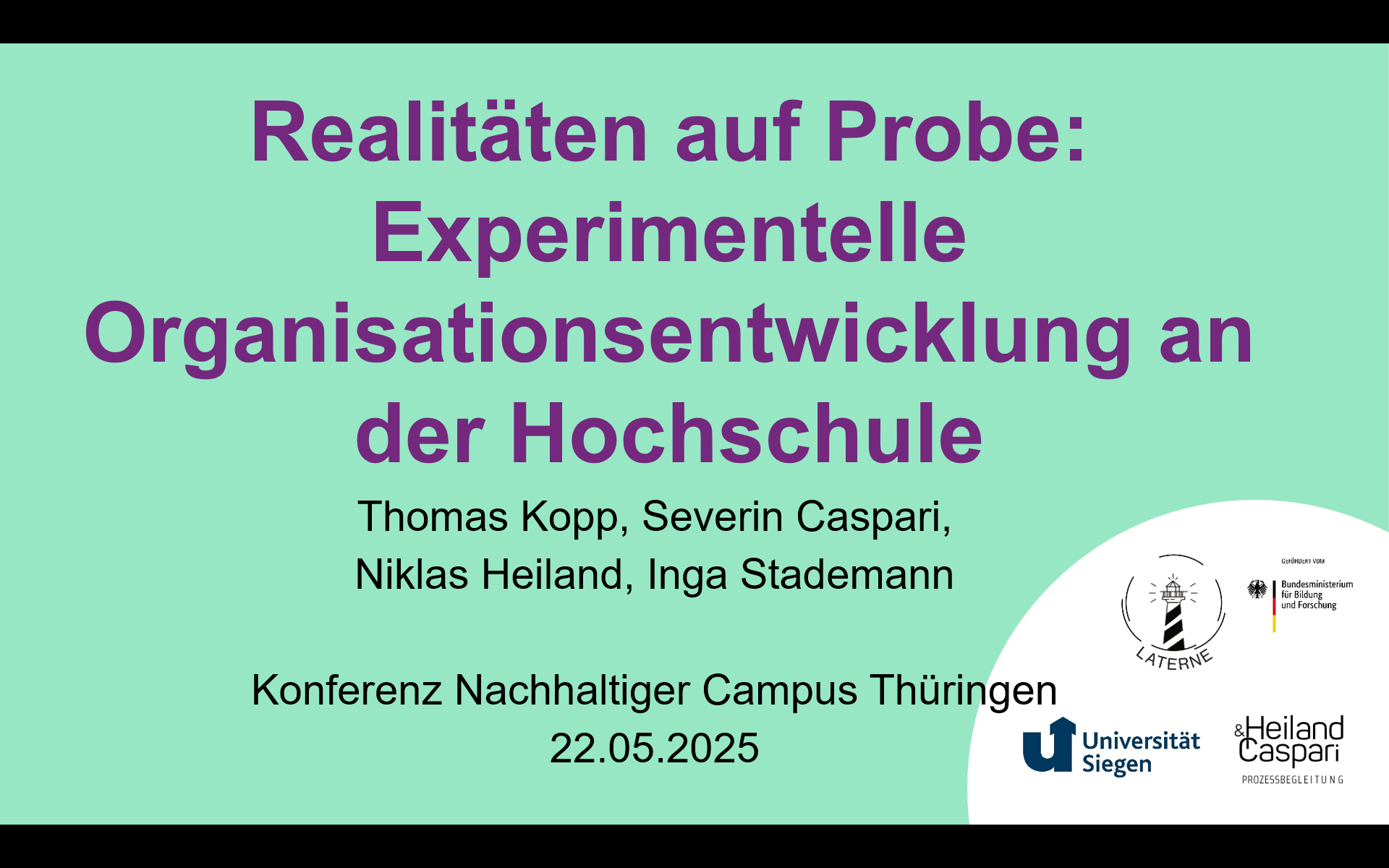
May 2025: Conference on Sustainable Transformation of Private and Public Organizations
In collaboration with the Plural Economics department at the University of Siegen, the chair organized a conference on the sustainable transformation of private and public organizations. The event began with keynote speeches by Dr. Maike Gossen (TU Berlin) on sustainability strategies for companies and Prof. Dr. Thomas Kopp, who presented a practice-oriented case study on experimental organizational development. A discussion with participants followed, providing an opportunity for exchange and reflection. The morning concluded with networking sessions, allowing participants to connect and share ideas.
In the afternoon, the conference focused on two thematic areas. The first explored the sustainable transformation of public institutions, featuring key insights from the Lantern project. Simultaneously, participants engaged in discussions on alternative economic models. Within this session, Hannes Wender and Dr. Dr. Johannes Halbe from the University of Osnabrück examined the complexities of regional transformation processes, highlighting obstacles and detours. Jana Schmidt from the University of Siegen presented the Nascent project on Community Supported Agriculture (CSA), while Elena Schiff contributed a practical perspective by showcasing the work of IGLU gUG in Cologne. These interdisciplinary insights and hands-on approaches provided valuable contributions to the sustainable development of organizations and economic structures.
May 2025: ICODICE started its second year
Students from the University of Siegen and the Kerala Agricultural University (KAU) followed Ms. Riza Mathew's lecture on urban gardening. A series of digital participation formats allowed students from Germany and India to interact with each other. The lecture was the kick-off for the second year of international digital teaching within the ICODICE project.
The ICODICE (Internationally connected digital classrooms education) project of the University of Siegen and KAU designs courses in teacher training and makes digital teaching methods tangible based on the topics of global inequality, socio-ecological sustainability and climate justice from the perspectives of the Global North and South.
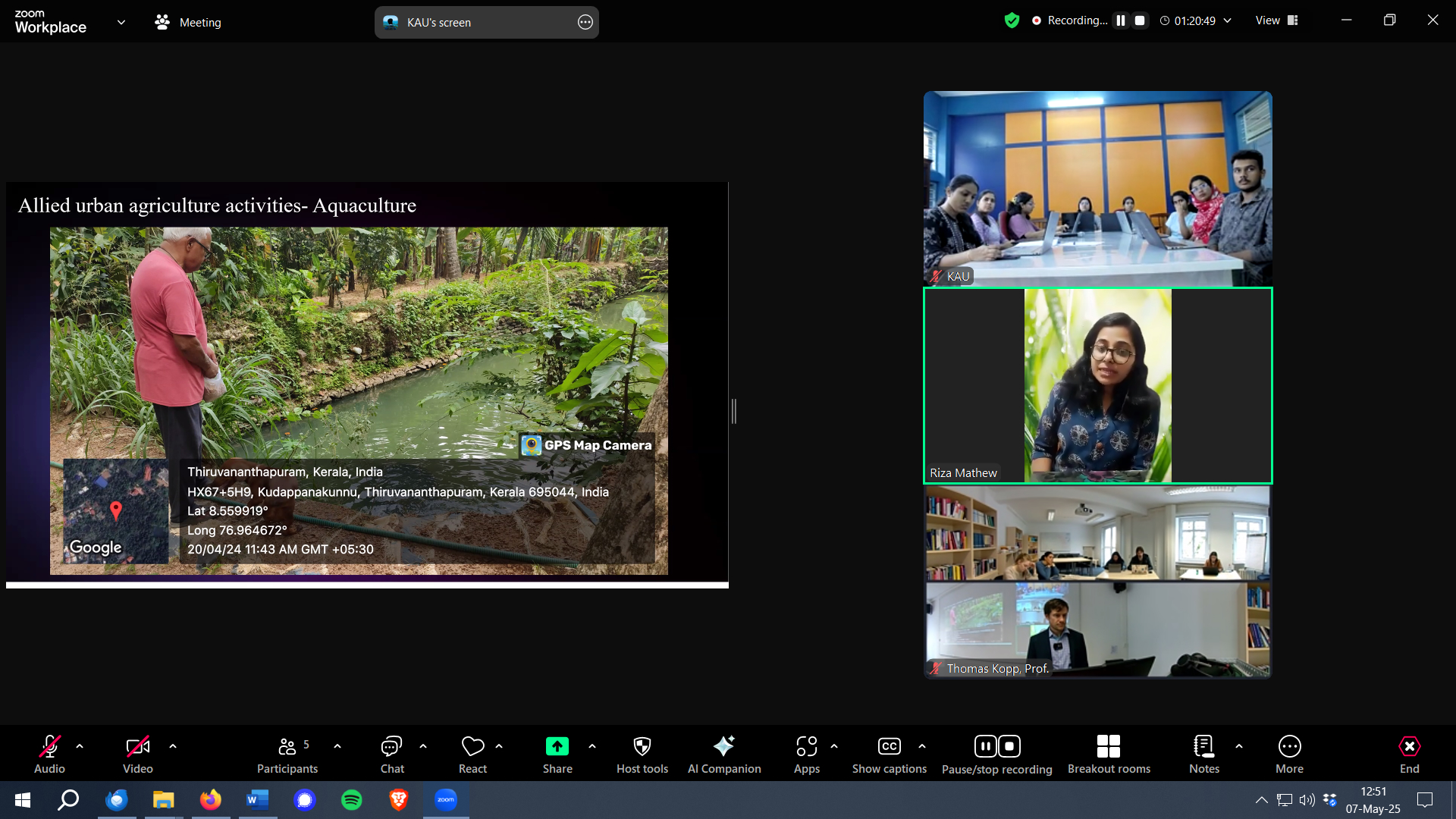
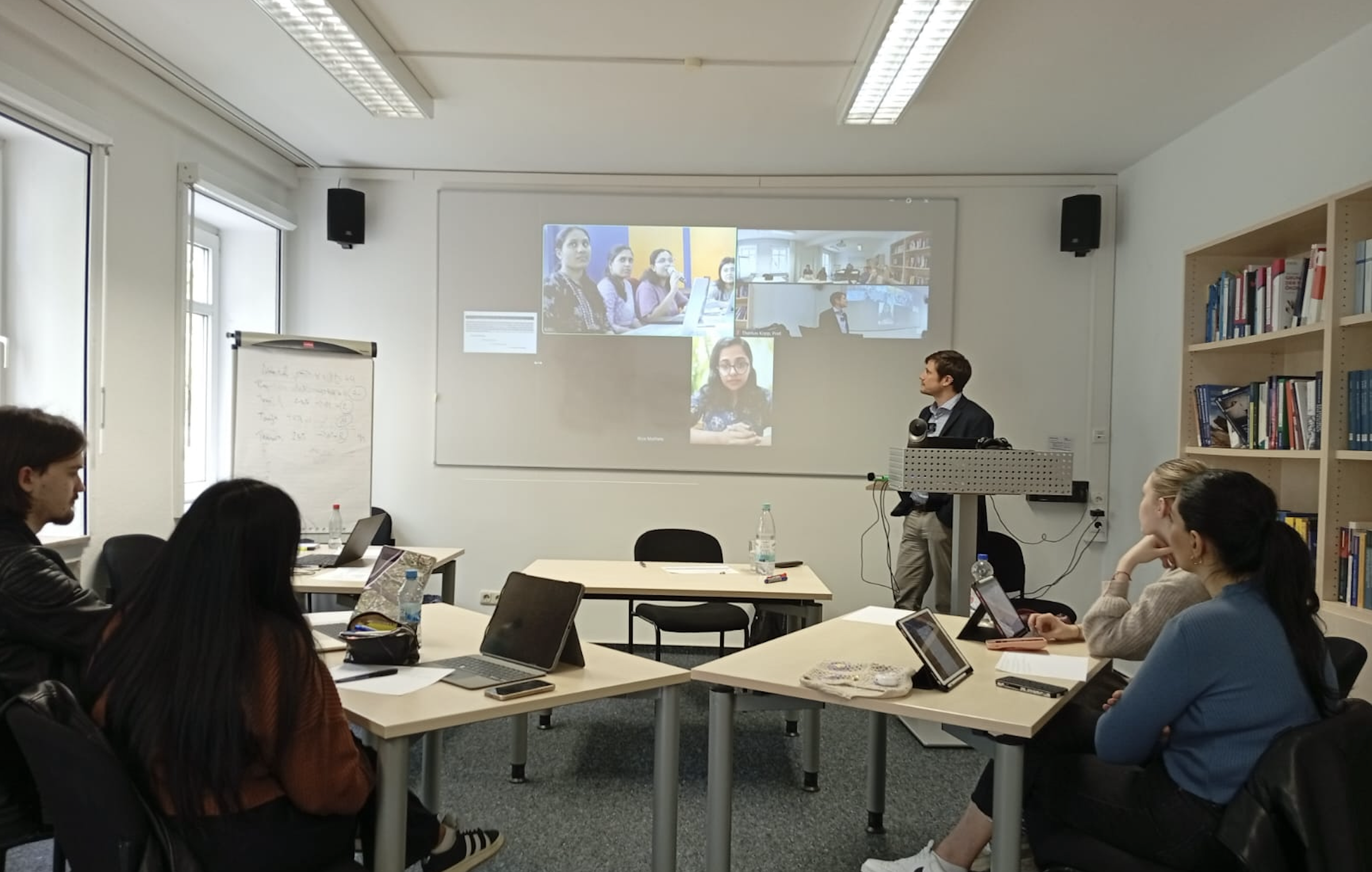
April 2025: Seminar presentation at Swedish Agricultural University in Uppsala
Following the kind invitation of our colleague, Prof. Vivian Wei Huang at the Swedish Agricultural University (SLU) in Uppsala, Prof. Kopp presented his ongoing work at SLU's monthly research seminar. The title of the presentation was "The Effects of Digital Yield Monitoring on Greenhouse Gas Emissions in the United States" and is based on joint work with Markus Nabernegg (University of Siegen), Robert Finger and Robert Huber (both ETH Zürich), and Rich Sexton (UC Davis).
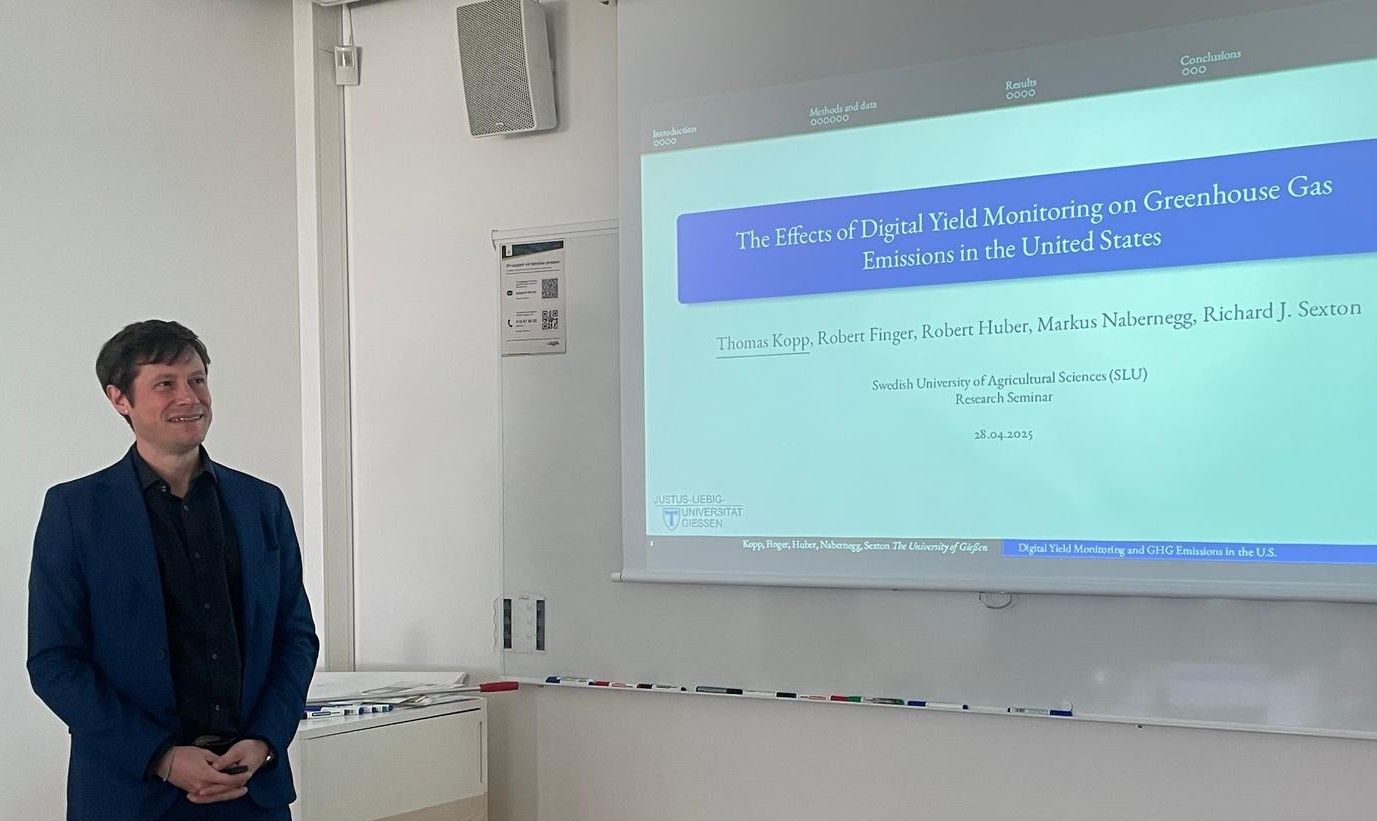
April 2025: Workshop Wo.W
As part of the LANTERN project, we are currently conducting the workshop "Wellbeing in Academia" (Wohlbefinden im Wissenschaftsbetrieb, Wo.W). In a workshop, led by Niklas Heiland and Severin Caspari from Heiland & Caspari (www.prozessbegleitung.de), we co-created a prototype for a new element in the onboarding process of newly appointed professors at the University of Siegen. Details on the workshop can be found here: www.hochschulen-transformieren.de/wow.
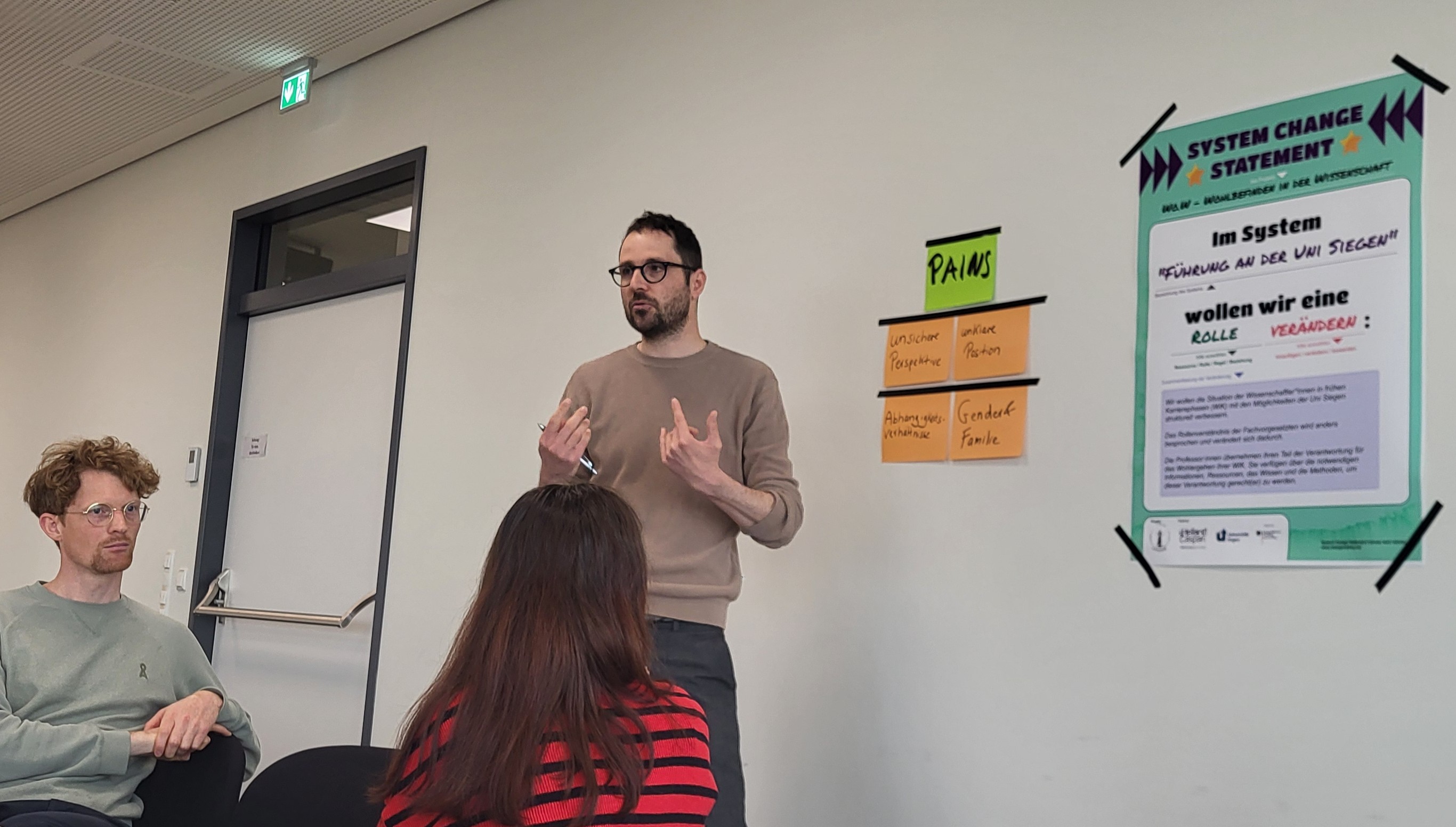
April 2025: Conference Presentation in Bordeaux and Best Poster Award
The Annual conference of the Agricultural Economics Society (AES) took place in Bordeaux, France. Prof. Kopp presented the poster "Reducing Negative Effects of Risk Aversion on Farming Outcomes: Evidence for Systematic External Selection into Profitable Contracts", based on joint work with Alwin Dsouza (New Mexico State) and Ashok K. Mishra (Arizona State). The Poster won the society's Best Poster Award!
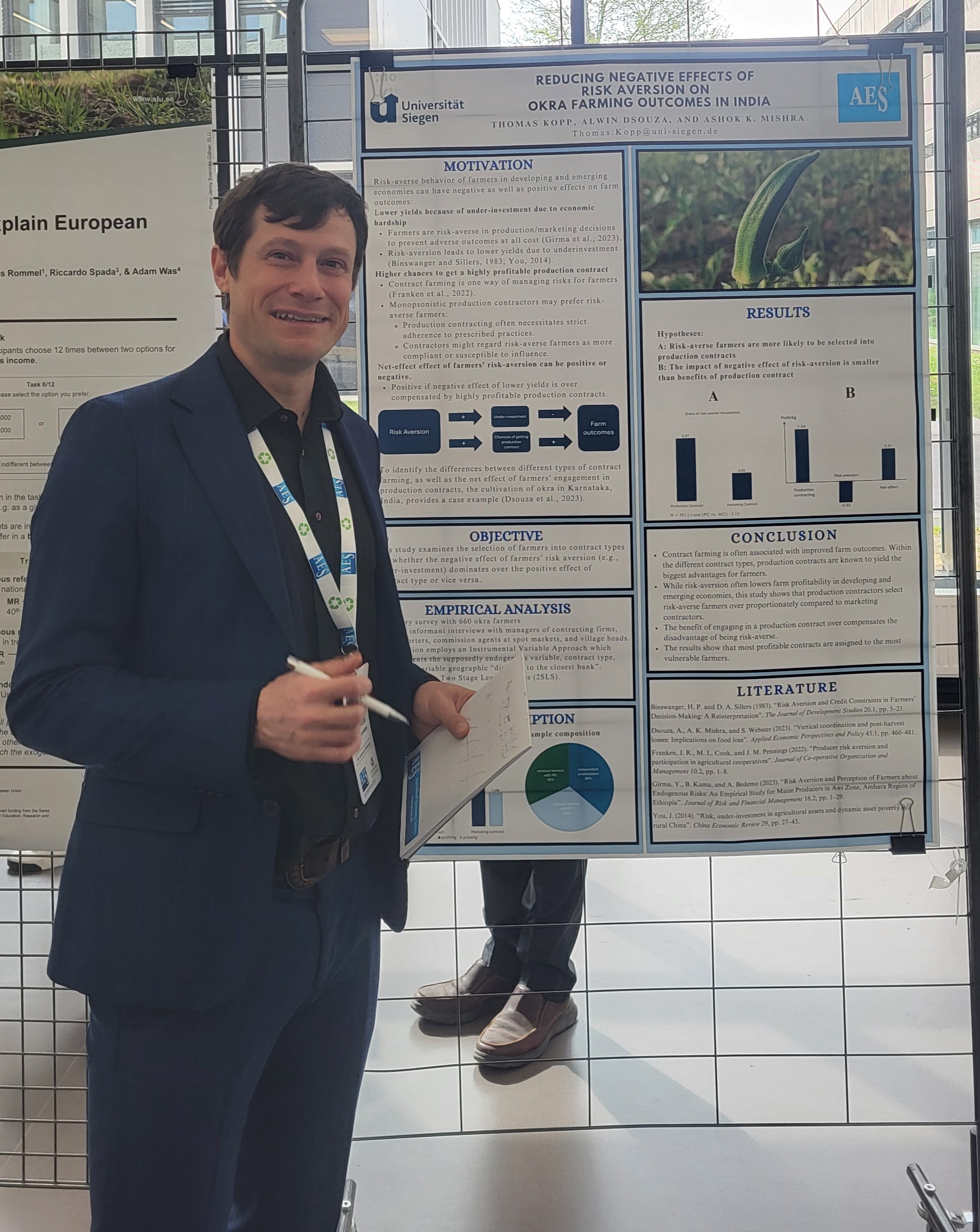
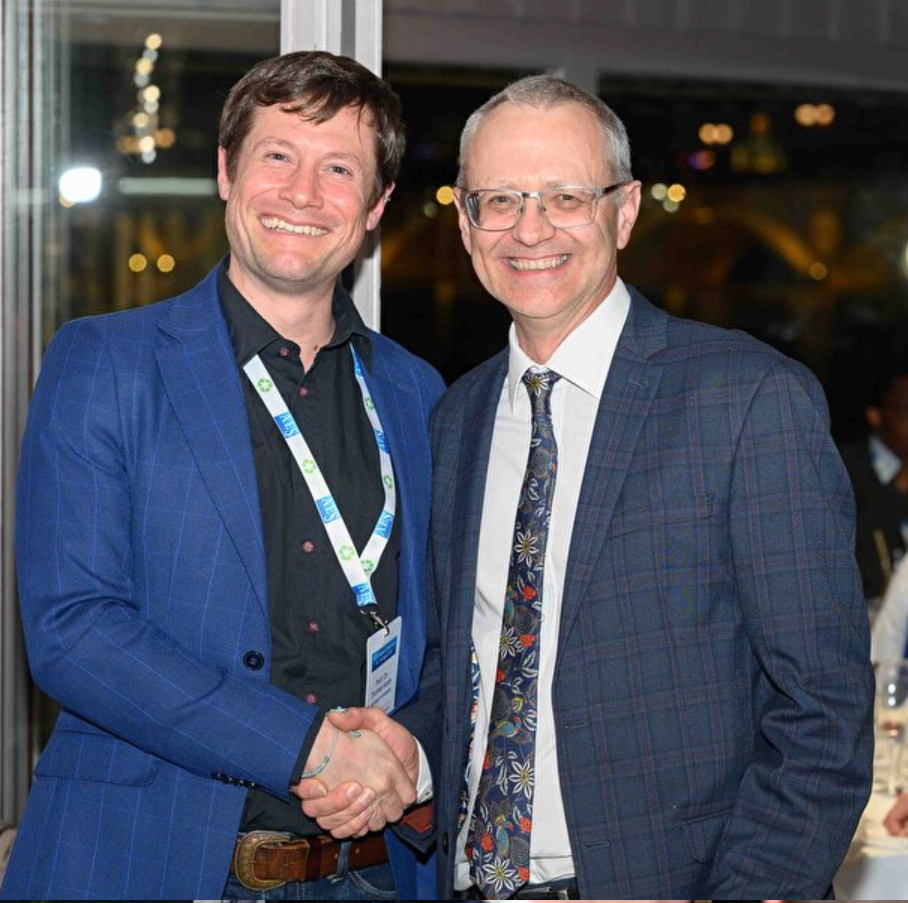
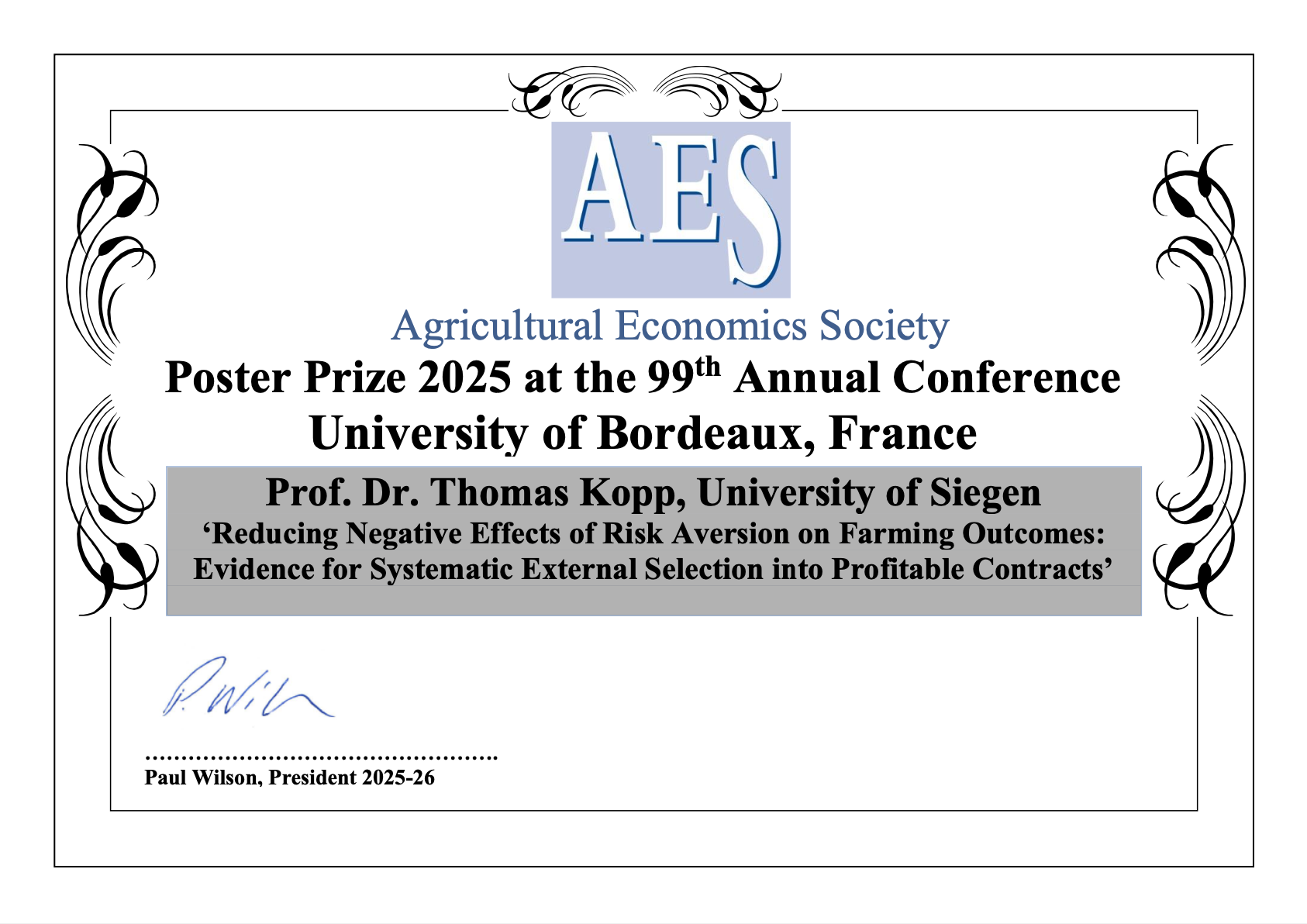
April 2025: Conference Presentation in Bamberg
The DIKULE project organized the DIKULE-Symposium in Bamberg, Germany. Prof. Kopp presented a poster on our teaching project "ICODICE", in which students from two German Universities and Kerala Agricultural University in India participate in a joint module. The project is conducted in collaboration with Prof. Archana Raghavan Sathyan and Ms. Aswathy Rani (both at KAU) and Mr. Claudius Engeling and Ms. Ayça Akçakoca (both University of Siegen).
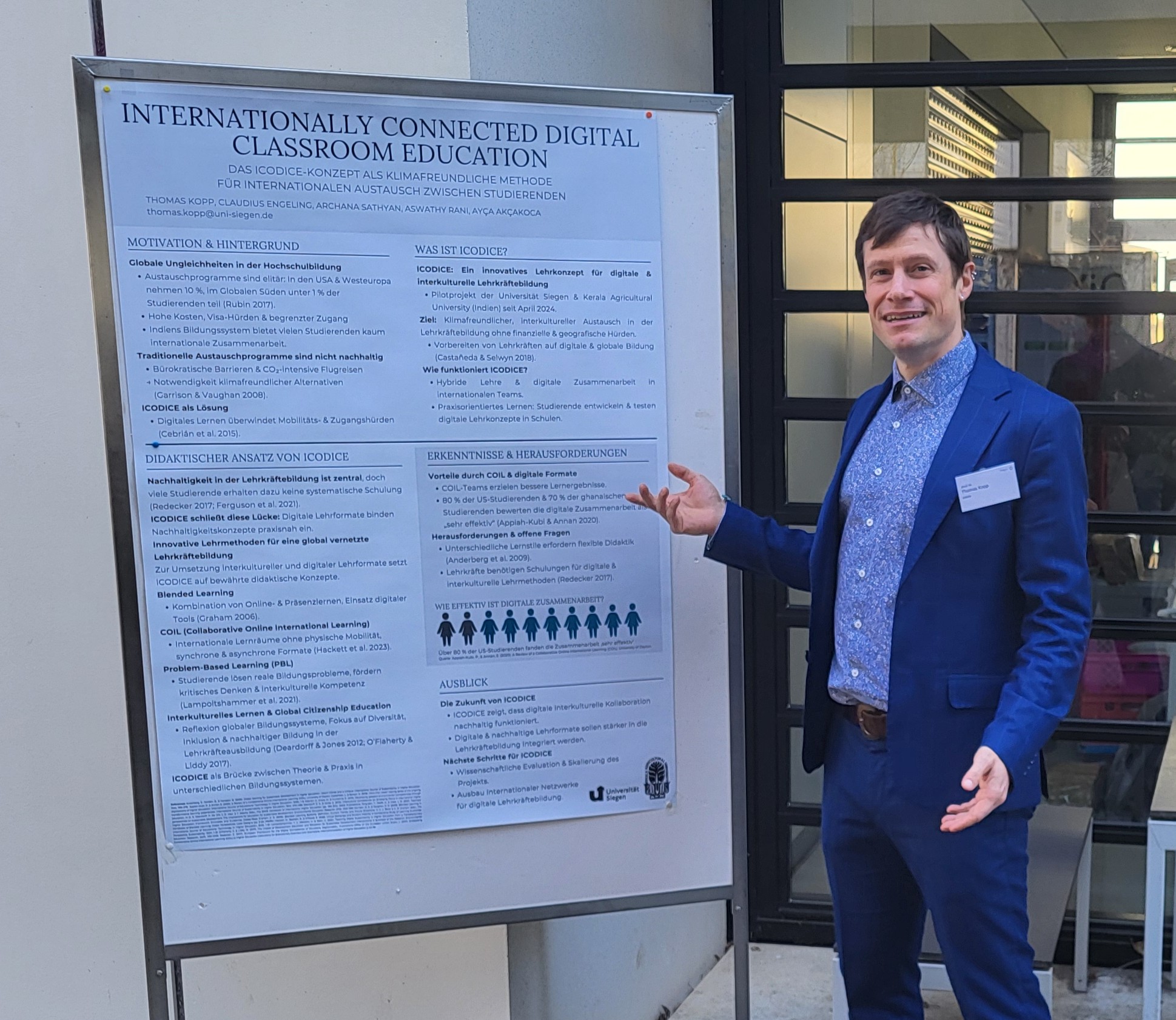
April 2025: Appointment as Full (W3) Professor at Justus-Liebig-University of Gießen
On April 1, 2025, Thomas Kopp started a new appointment as full professor for Global Trade and World Food Security at Justus-Liebig-University of Gießen. Once a new website is available, the link will be shared here.

March 2025: Symposium of the German Federal Ministry for Education and Research (BMBF)
Several members of the LANTERN project attended the BMBFs Symposium of the funding line Sustainability in Science" (SiSi) in Eberswalde to present the current developments in the different work packages of this project. Further details can be found on the project's website: www.hochschulen-transformieren.de .
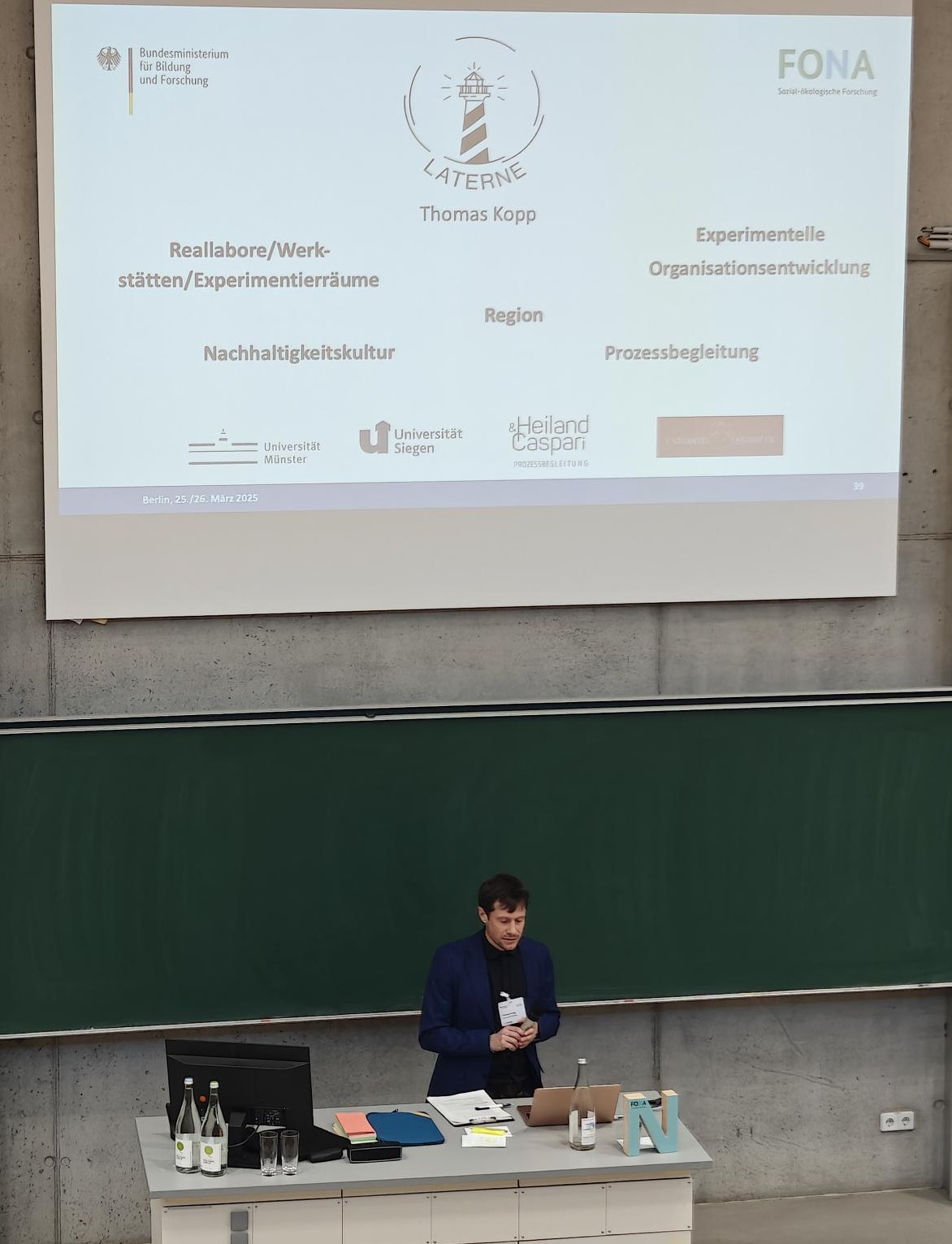
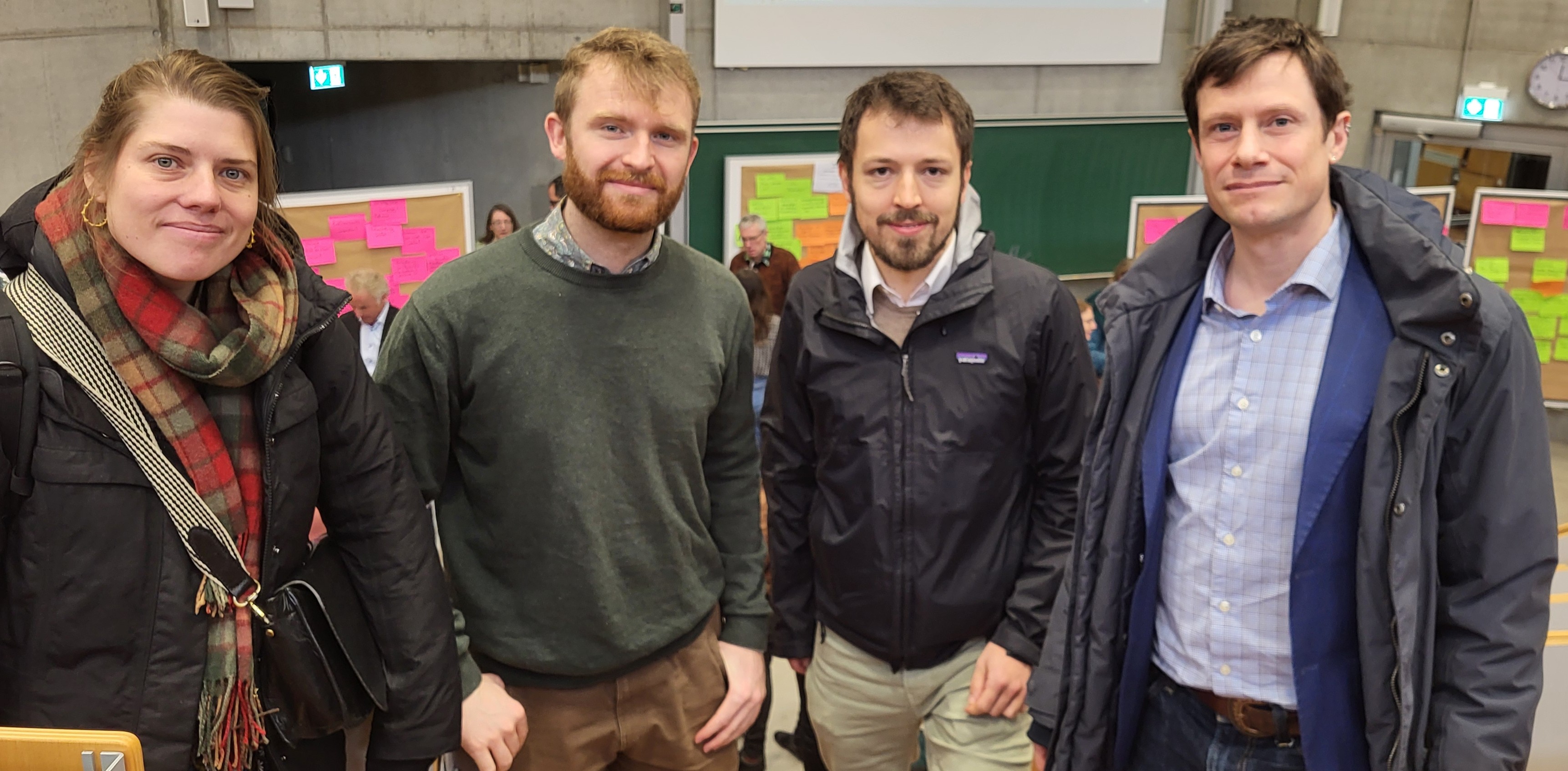
January 2025: Visit to Project Partner Kerala Agricultural University
As part of the chair’s ICODICE project, our research group member and ICODICE project coordinator Claudius Engeling visited the collaboration partner in this project, the Kerala Agricultural University (KAU). During the visit, Claudius Engeling met with project collaborators Prof. Dr. Archana Sathyan and Ms. Aswathy Rani to discuss plans for upcoming project activities in the next year. The team also marked the completion of the first ICODICE semester, distributing participation certificates to the students involved. Additionally, Claudius Engeling shared insights on international digital teaching with teaching staff and students of KAU.
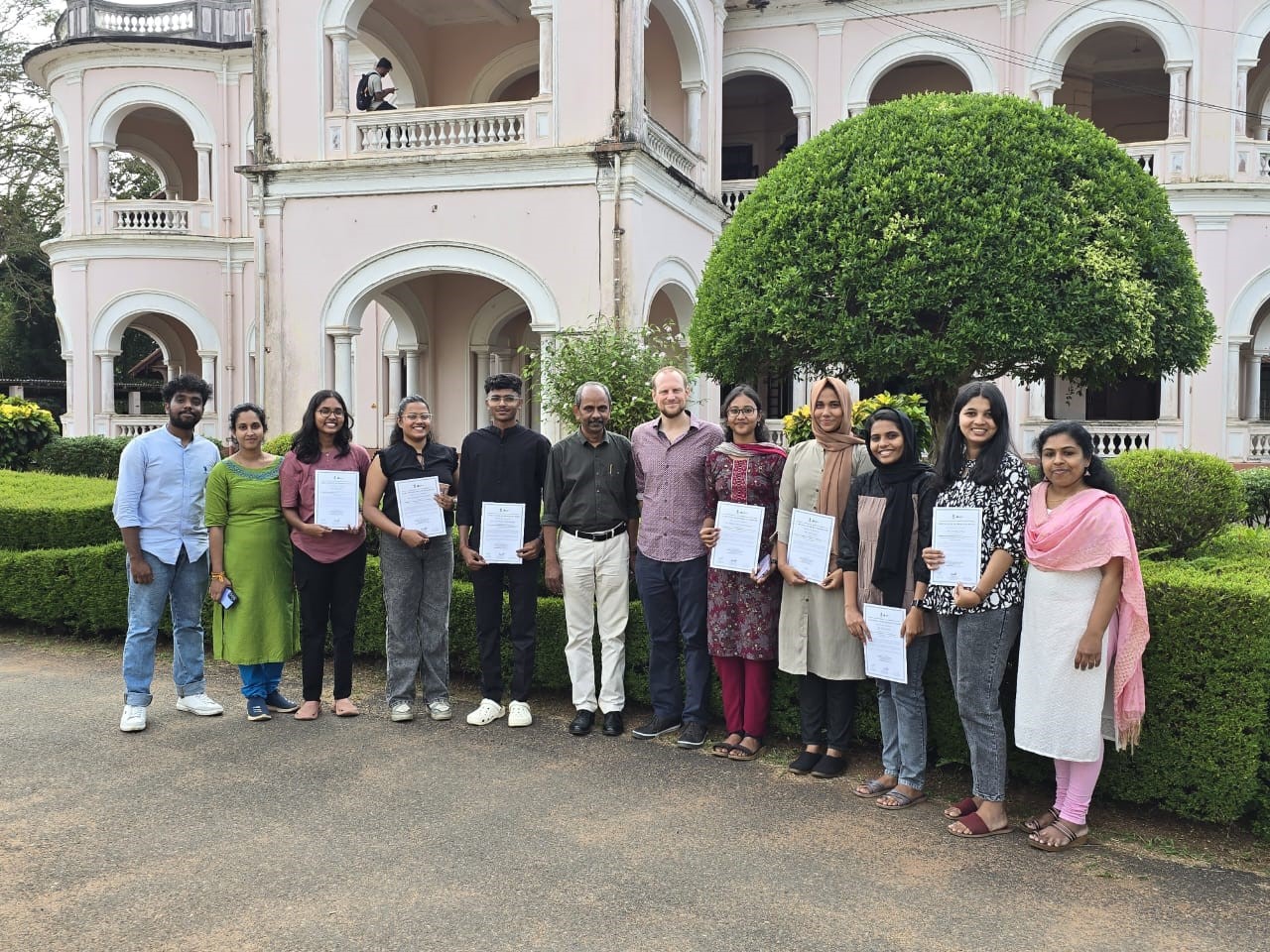
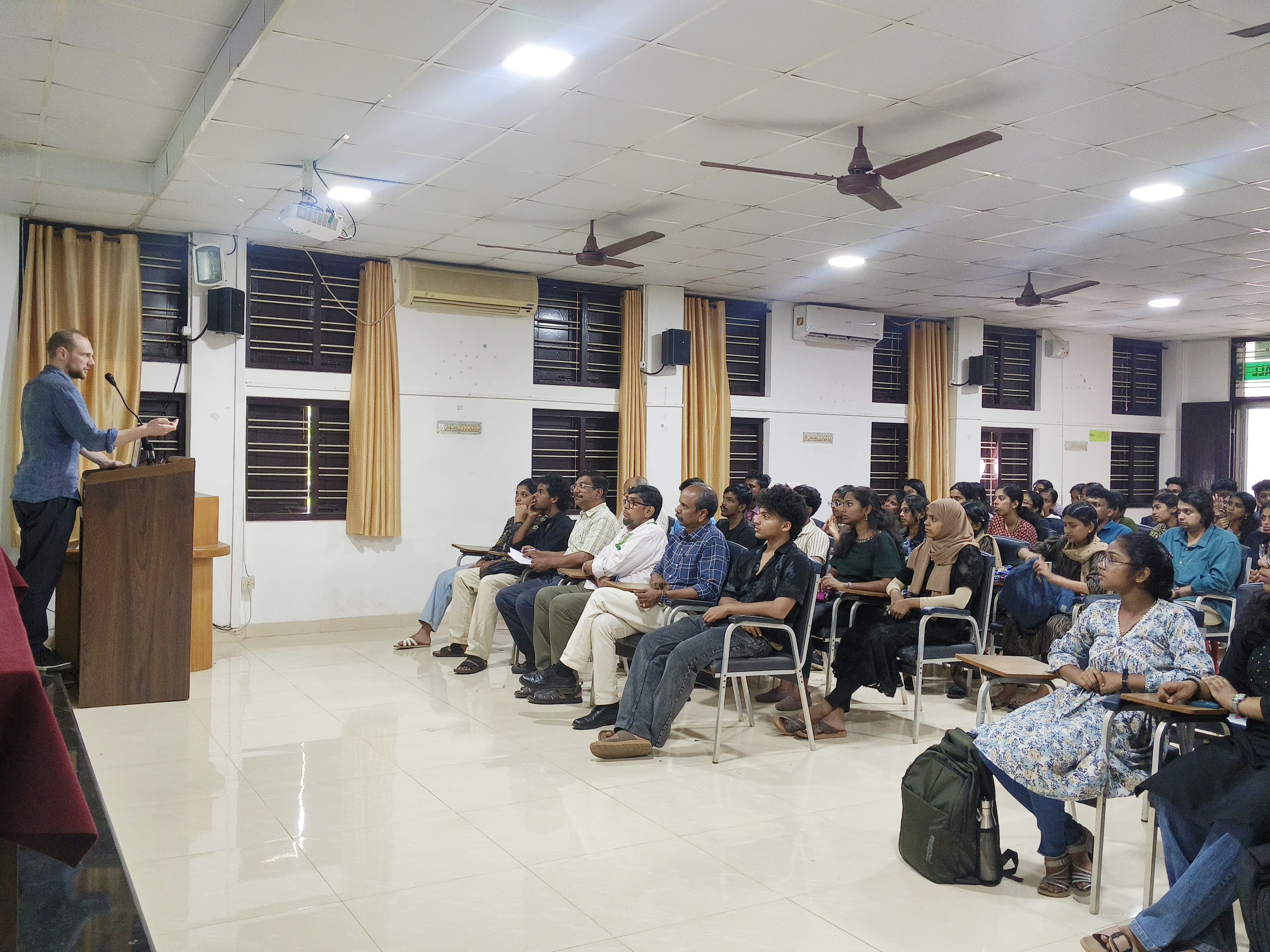
January 2025: Meeting of LANTERN Project at Münster University
In January, the LANTERN consortium under the leadership of Uni Siegen met to discuss the latest project developments. The consortium, together with partners from Osnabrück University and Münster University, discussed ideas for the follow-up project. At the same time, consortium members participated in the online-conference "Appetite for the Academic Donut ".
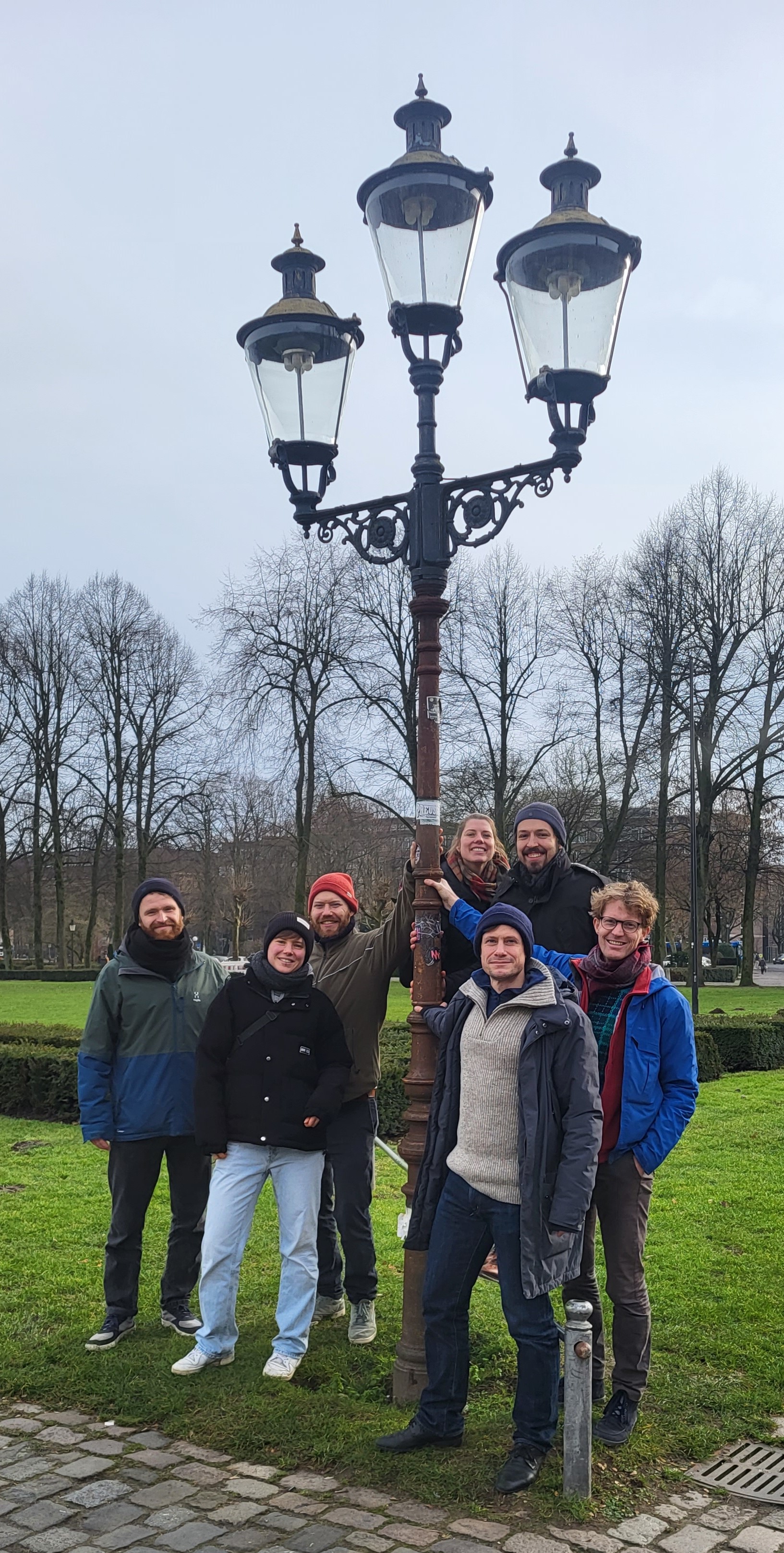
January 2025: Publication in the Journal for Organizational Development

January 2025: Presentations at the conference by Appetite for the Academic Donut by chair member and associate
Inga Statemann, a PhD student in our group, presented her work "Grasping Sustainability Culture in Universities - A multi-Method Approach to Define and Understand Key Elements" at the online-conference "Appetite for the Academic Donut", organized by our LANTERN project and the University of Münster.
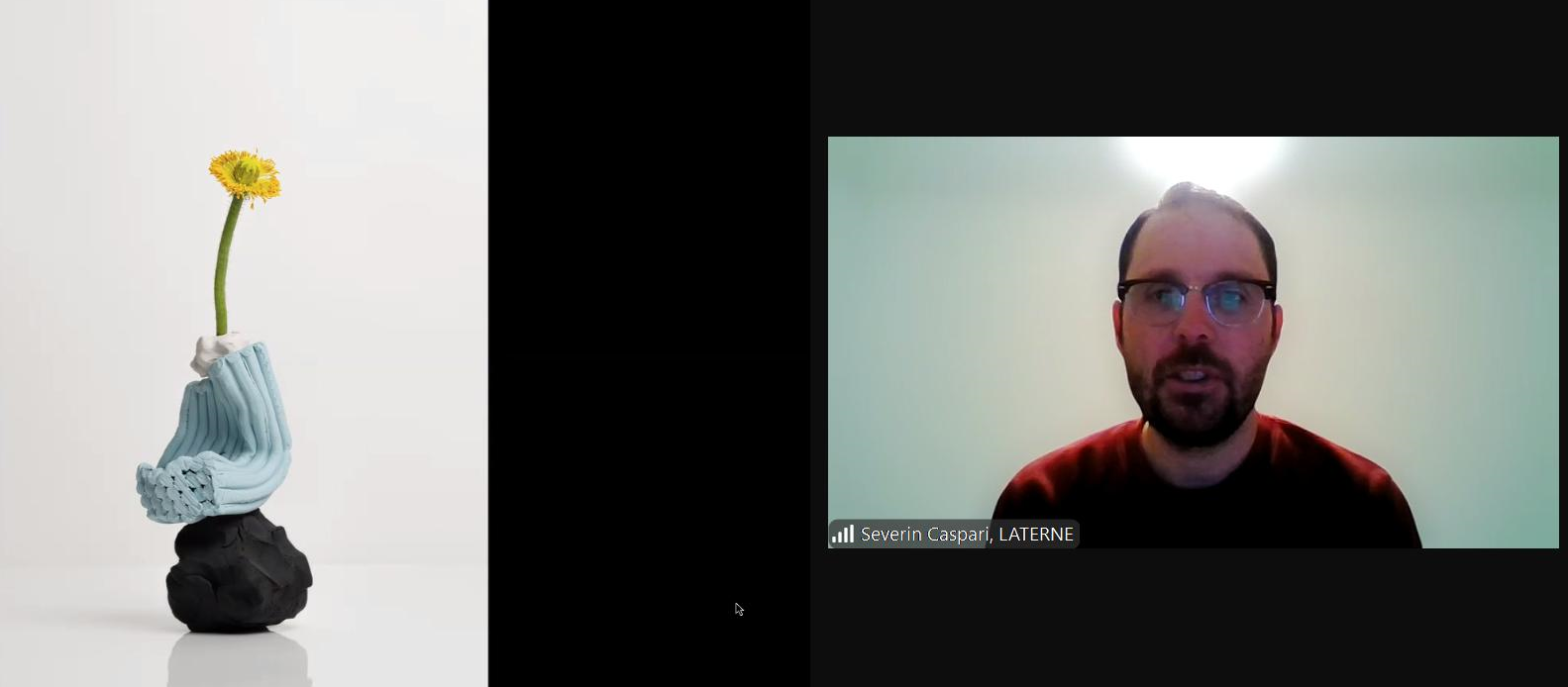
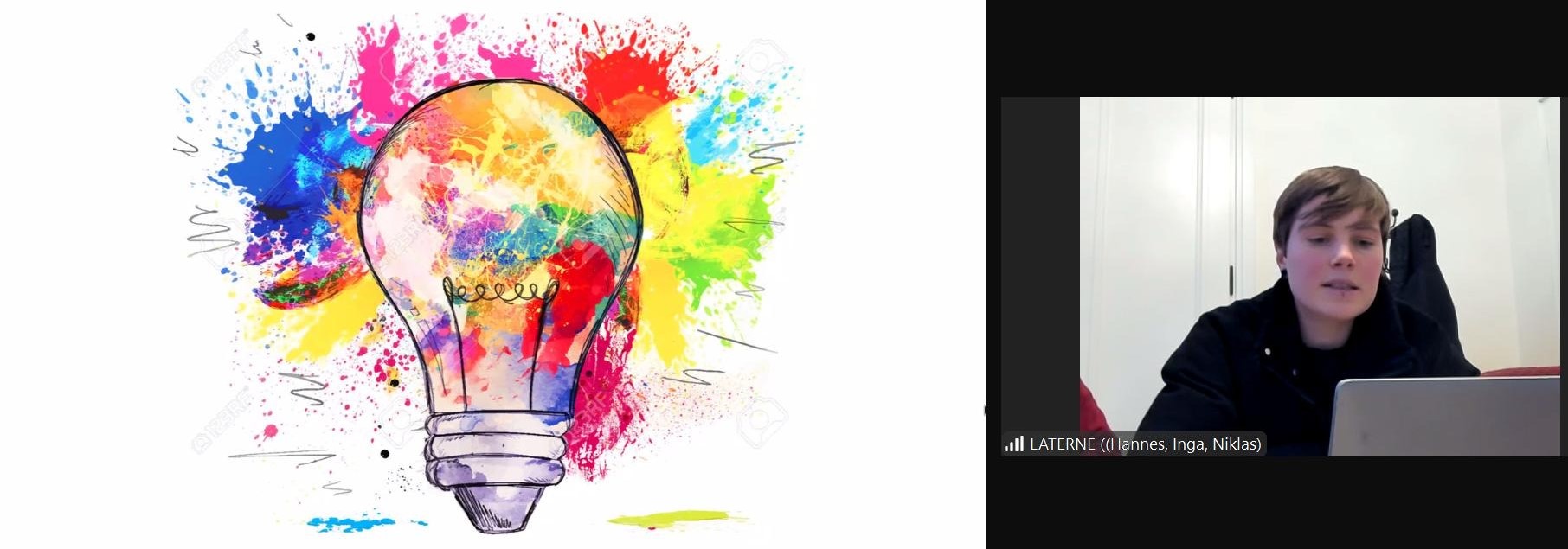
November 2024: Presentation at STIL Workshop
Prof. Kopp presented the ongoing project ICODICE - International Digital Classroom Education - at a workshop organized by this project's funder, the Foundation for Innovation in Higher Education (Stiftung Innovation in der Hochschullehre, STIL). The one-day workshop served as a networking and feedback event between the funder and several selected projects.
November 2024: Conclusion of RAUM project
The RAUM project, started in 2023 and now completed, was an experimental initiative to promote sustainability in higher education. It represents a successful example of experimental organizational development. By implementing various spatial concepts and promoting collaboration, the need for space was effectively reduced. Future plans focus on further optimizing and scaling these innovative concepts.
The final report on the RAUM project can be found under the following link.
November 2024: Two online school exchanges between India and Germany conducted
As part of the ICODICE project (Internationally Connected Digital Classroom Education), the Chair of Prof. Thomas Kopp, in collaboration with Kerala Agricultural University, facilitated two online exchange sessions between Heisenberg Gymnasium Bruchsal (Germany) and Mitraniketan School (India).
These exchange activities were co-designed by students from both universities, providing them experience in didactic methods and the logistics of organizing international online exchanges. Participating school students first explored and exchanged perspectives on climate change impacts and initiatives from their respective countries, and in the second session discussed the ecological benefits and drawbacks of digitalization
November: Conclusion of RAUM project
The RAUM project, started in 2023 and now completed, was an experimental initiative to promote sustainability in higher education. It represents a successful example of experimental organizational development. By implementing various spatial concepts and promoting collaboration, the need for space was effectively reduced. Future plans focus on further optimizing and scaling these innovative concepts.
November 2024: Presentation of Prof. Fiankor at the Economics Research Seminar
Prof. Dela-Dem Doe Fiankor from the University of Göttingen presented his work in the seminar "Pesticide Regulatory Heterogeneity, Foreign Sourcing, and Global Agricultural Value Chains," held on November 20, 2024, at the University of Siegen. Using Swiss data, this joint work of Prof. Fiankor with Bernhard Dalheimer and Gabriele Mack examines how varying pesticide regulations affect imports. The paper finds that stricter regulations reduce imports and raise costs, with smaller firms most affected, while larger firms and participants in global value chains show more resilience. The study highlights the need for balancing trade and regulatory standards.
October 2024: Research of Ayça Akçakoca on Zanzibar
Ayça Akçakoca, a member of the Center of Economic Education and a collaborator of our working group, conducted follow-up data collection for the evaluation of our learning game "The Good Life for All" at schools in Zanzibar from mid-September to the end of October 2024.
This time, the focus was solely on administering tests to assess the long-term impact of the game, rather than conducting the game itself. Following the initial data collection in March 2024, students participated in tests to evaluate their competencies and capture their value orientations. The learning game was not implemented again during this phase.
The results of this follow-up study will provide valuable insights into how the game’s impact evolves over time. We look forward to using these findings to improve the learning experience for young people and prepare them for future challenges.
In addition to the study, debates were held across schools on the island, where students discussed sustainability-related topics. These debates were not part of the study but provided an opportunity for students to engage with relevant societal issues related to the game.
October 2024: International Day for Good Life on Zanzibar (Tanzania)
The "Good Life for All" interschool debate competition and learning games program, held in October 2024, aimed to equip over 100 students from 16 schools on Zanzibar with critical thinking, communication, and leadership skills. The event took place in both urban and rural regions to ensure equal access to educational opportunities. Participants engaged in debates on thought-provoking topics and played the "Good Life for All" game that was developed by our group, fostering collaboration and sustainability awareness. The program's outcomes included improved confidence, public speaking skills, and acknowledgment of rural schools in extracurricular activities. Despite challenges such as communication barriers and language difficulties, the initiative was a success, culminating in a final debate on environmental accountability.
October 2024: Meeting of LANTERN Project in Siegen
In mid-November, the LANTERN consortium under the leadership of Uni Siegen met to discuss the latest project developments. The consortium, together with partners from Osnabrück University and Münster University, discussed the workshops being held at the partners’ institutions to improve the respective universities' sustainability progress. They also agreed on goals for the final year of the project and considered future project ideas and collaborations.
October 2024: Presentation at Annual meeting of the Society for Socio Informatics
Thomas Kopp attended this year's annual conference of the Society for Socio Informatics that took place at the Fraunhofer Society in Berlin. He presented the paper "The Effects of Digital Yield Monitoring on Greenhouse Gas Emissions in the United States", co-authored by Richard Sexton, Markus Nabernegg, Robert Huber, and Robert Finger.
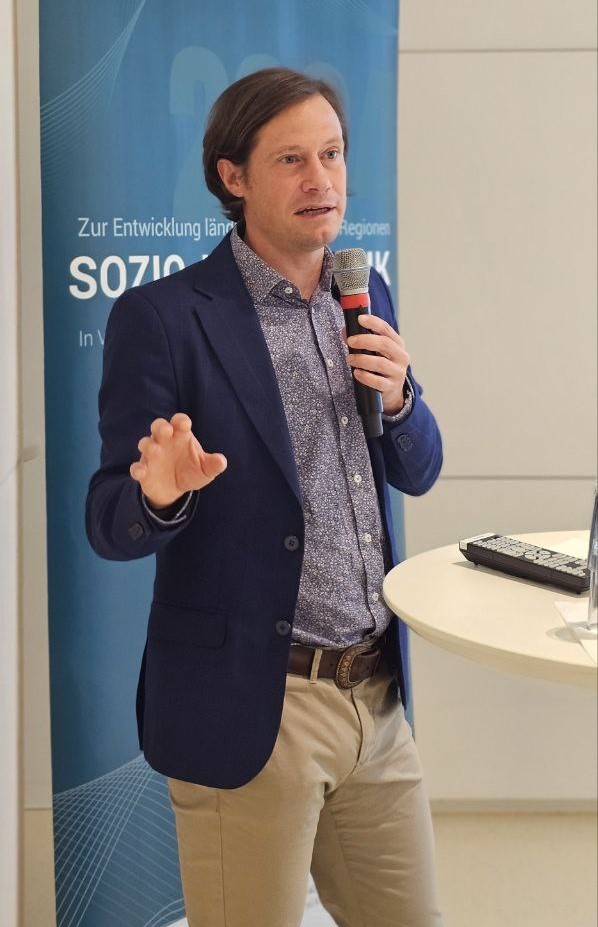
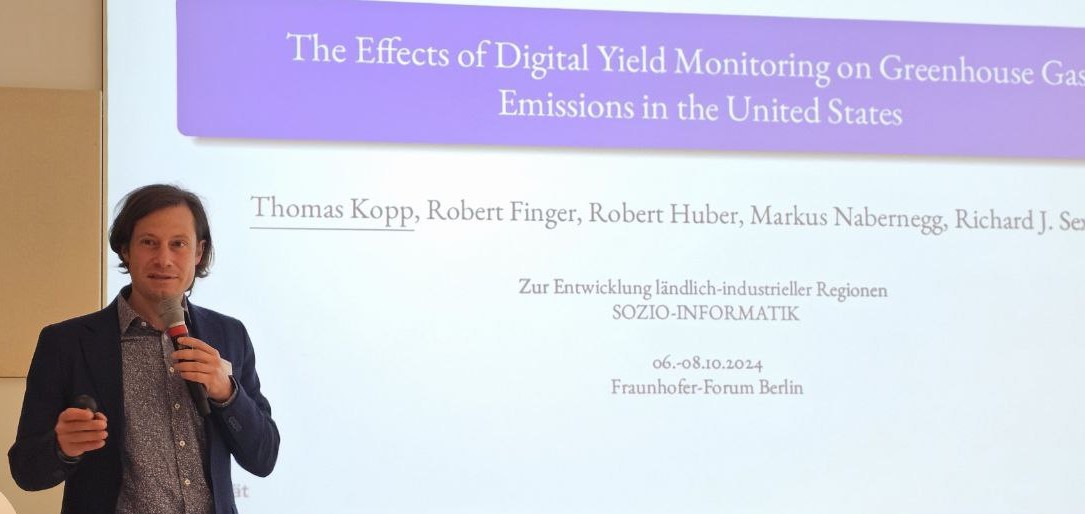
September 2024: Presentations at GeWiSoLa conference
Thomas Kopp attended this year's annual conference of the German Society for Agricultural Economics and Rural Sociology that took place at Justus-Liebig University in Gießen. He presented the paper "The Effects of Digital Yield Monitoring on Greenhouse Gas Emissions in the United States", co-authored by Richard Sexton, Markus Nabernegg, Robert Huber, and Robert Finger and acted as a discussant in the session "Is agricultural economics in need of decolonisation? Arguments, challenges and experiences".
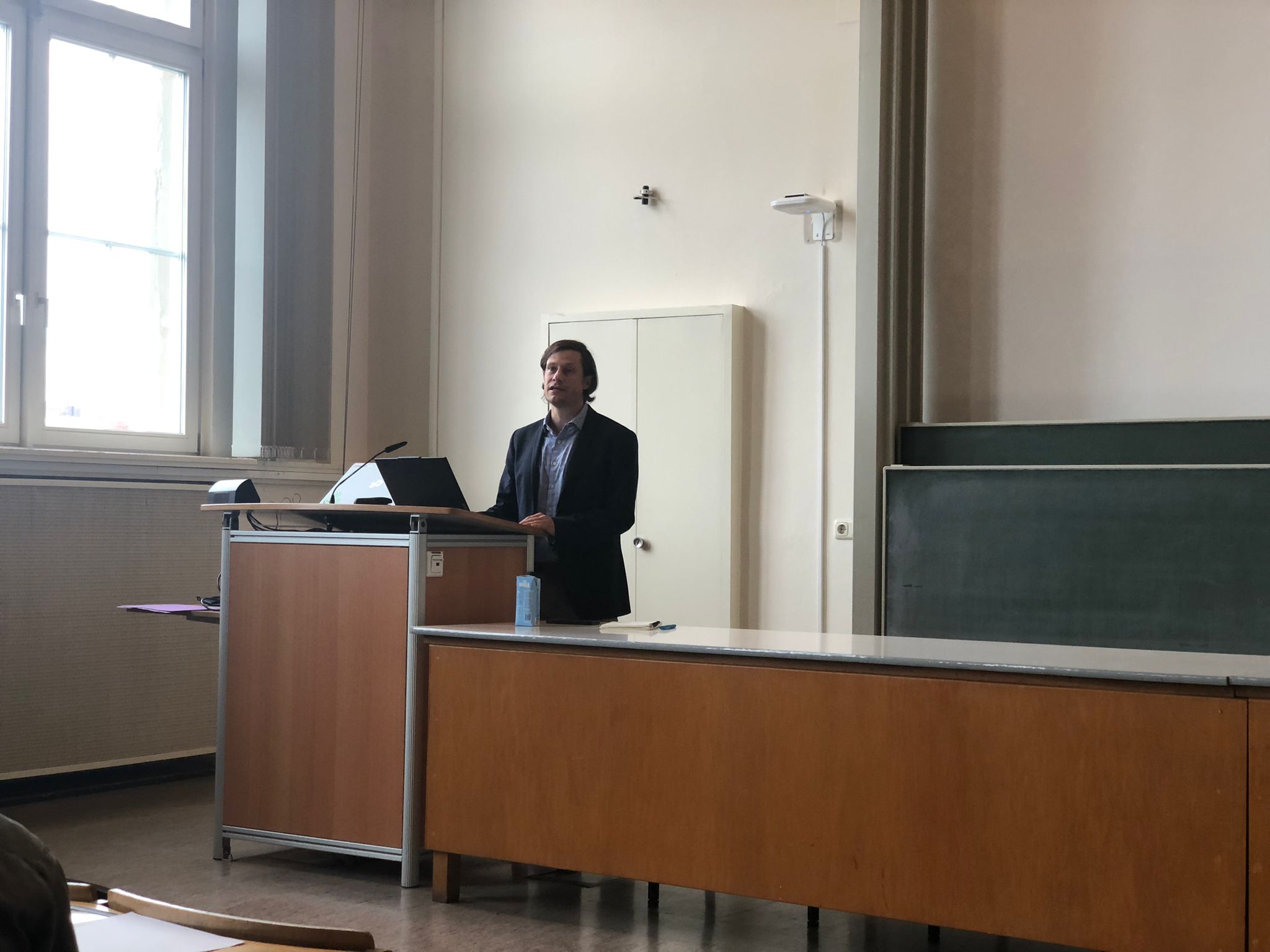
September 2024: Presentations at Sustainable Food Systems Symposium
Thomas Kopp attended the Sustainable Food Systems Symposium 2024 at the University of Göttingen and presented the papers "The Effects of Digital Yield Monitoring on Greenhouse Gas Emissions in the United States" (with Richard Sexton, Markus Nabernegg, Robert Huber, and Robert Finger) and "The Relation between Inequality and Meat Consumption: Trade-offs in Sheep Meat in Low-income Countries, Synergies in Beef everywhere" (with Markus Nabernegg).
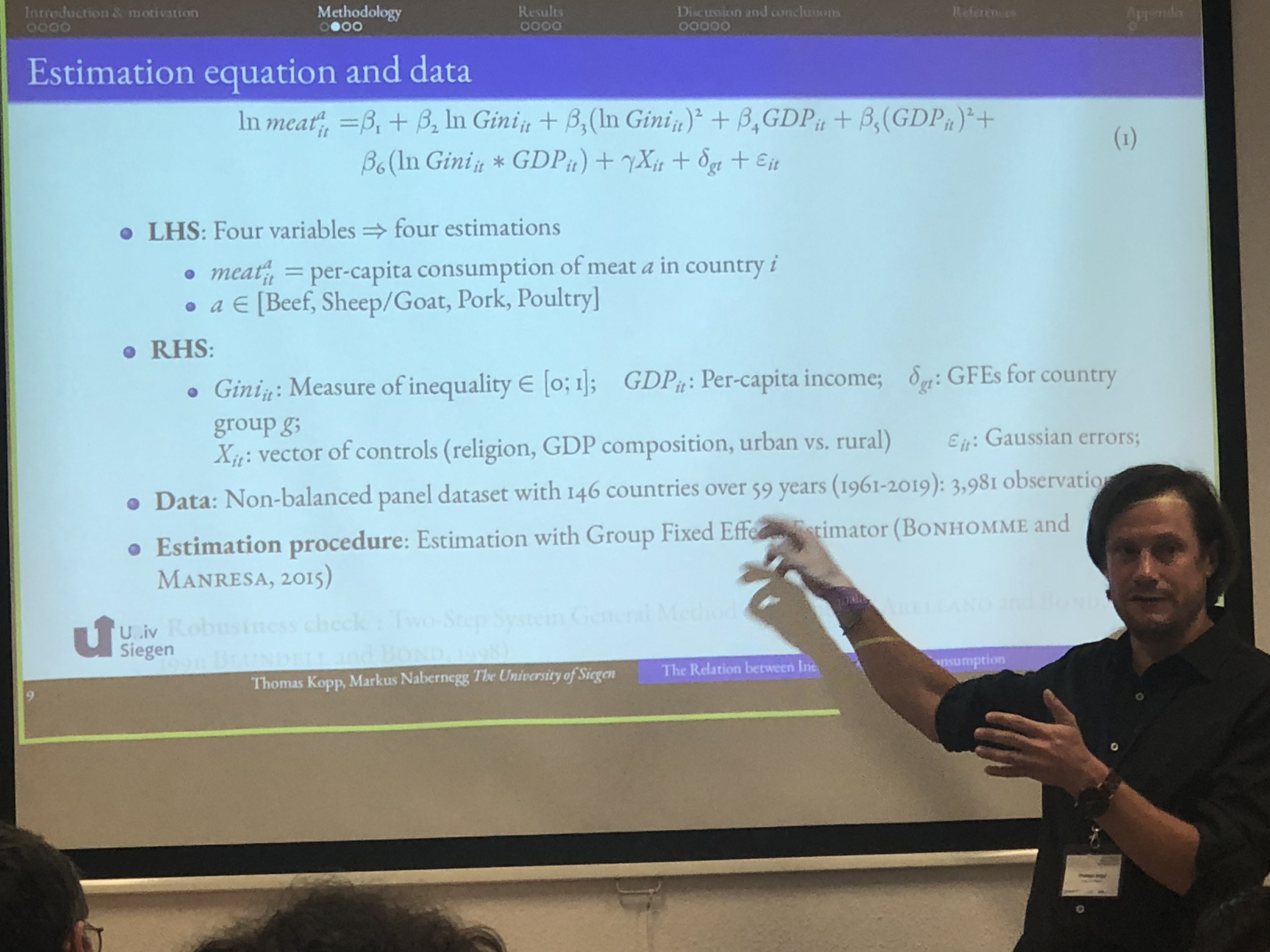
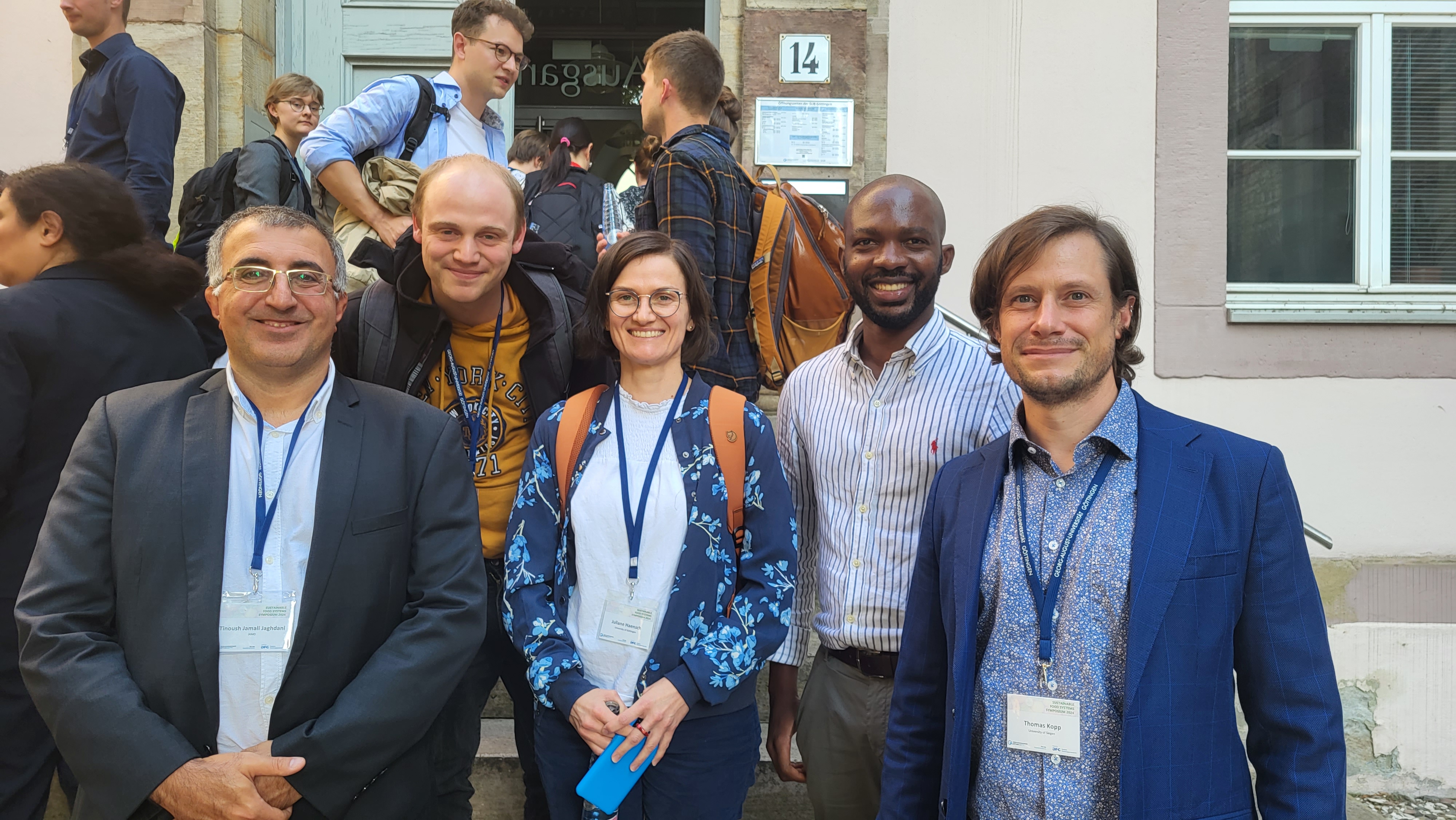
September 2024: Organization of the conference Designing Sustainable Economies in Siegen
Our group co-organized the conference "Approaching technologically induced problems with technologies? Designing Sustainable Economies" that took place on September 10 2024 at the University of Siegen. The other organizers were Dr. Steffen Lange and Jun.-Prof. Matthias Laschke. Our Group Members gave the following presentations:
Markus Nabernegg: "The net climate effect of digitalization, differentiating between firms and households"
Claudius Engeling: "International learning for sustainability"
Thomas Kopp: "The Effect of Digital Yield Monitoring in US Agriculture on Greenhouse Gas Emissions"
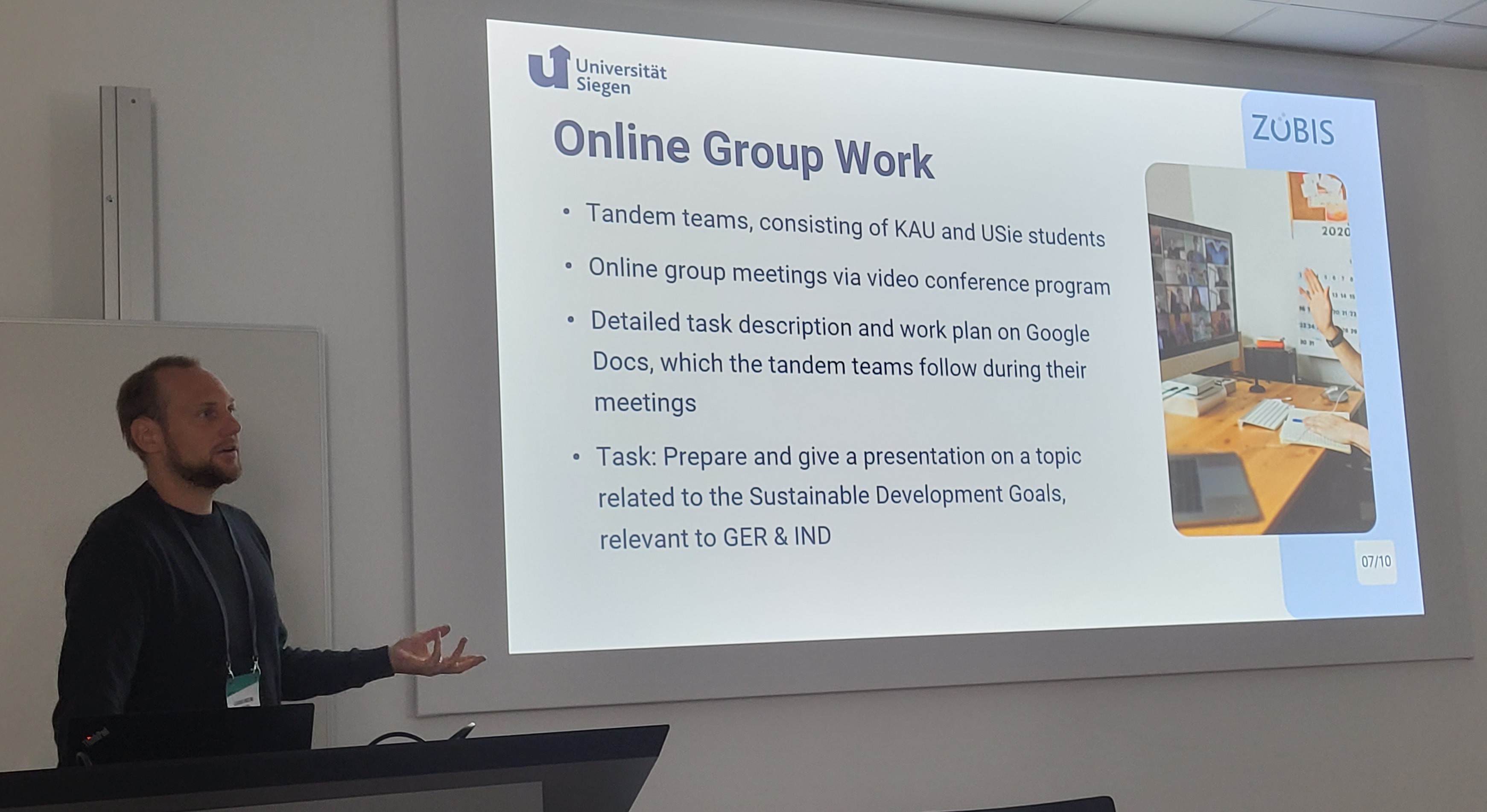
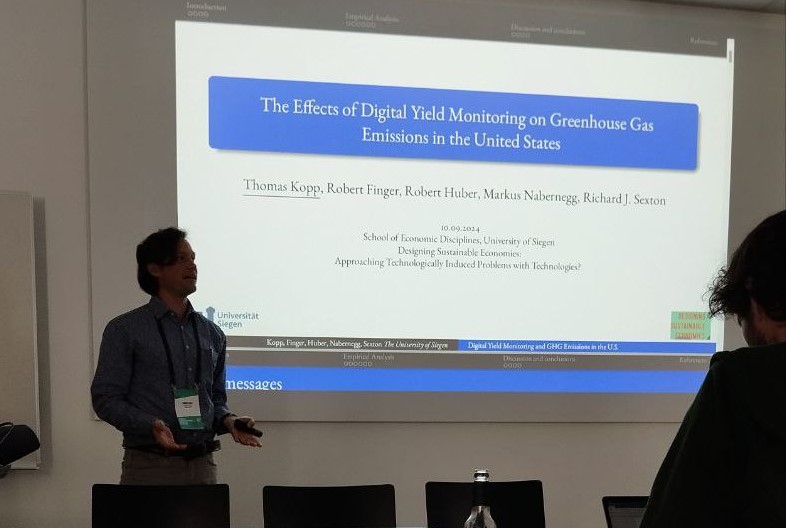
August 2024: Presentation at the 38th IARIW Conference
Mr. Markus Nabernegg presented his paper "Extreme income inequality in Ecuador- Dollarization, Commodity Price Boom and Citizen Revolution" at the 38th General Conference of the International Association for Research in Income and Wealth in London (UK), in the Plenary Session "Further Improving Household Distributional Results with Particular Reference to Adjusting the Top of the Distribution."
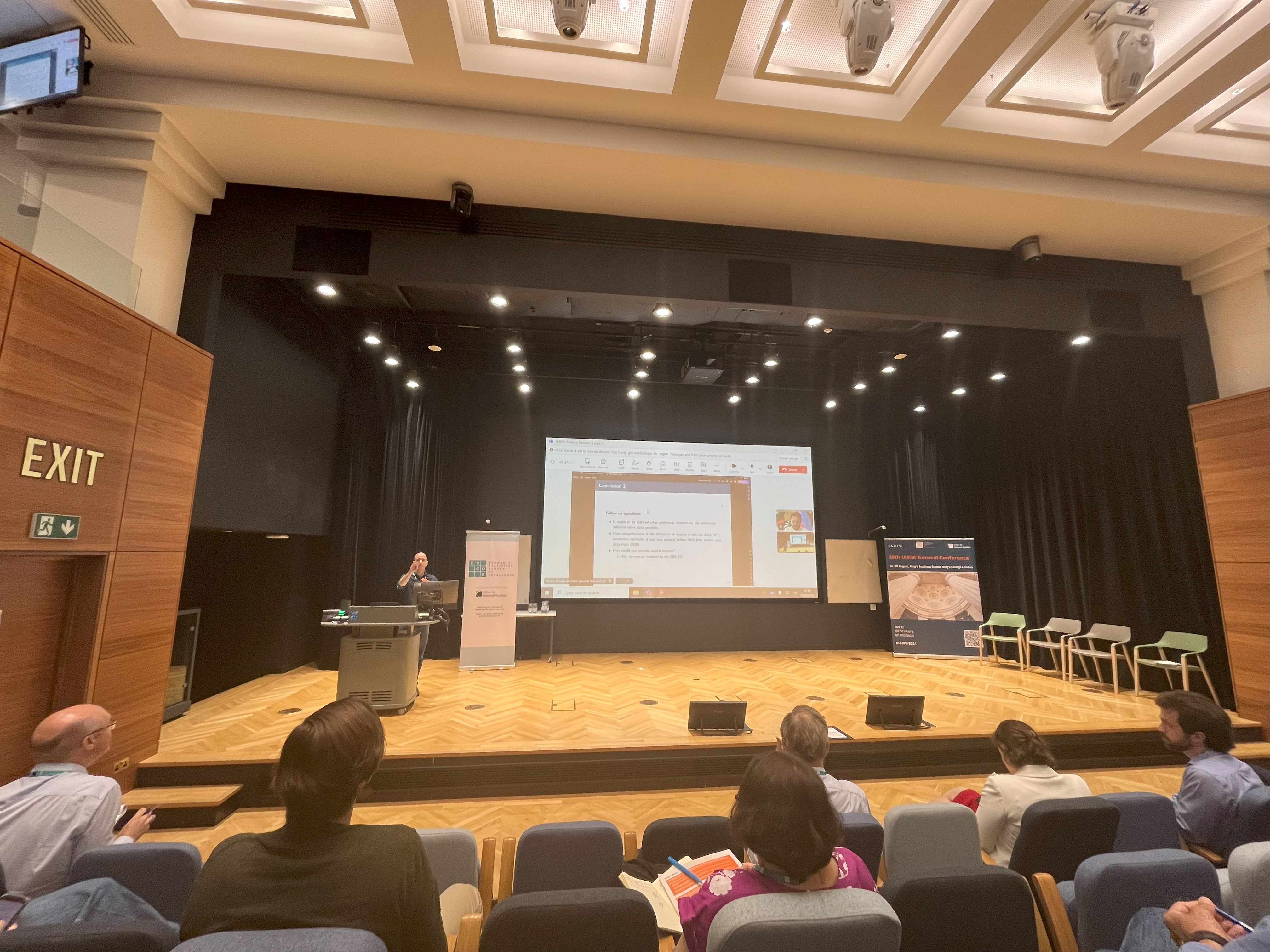
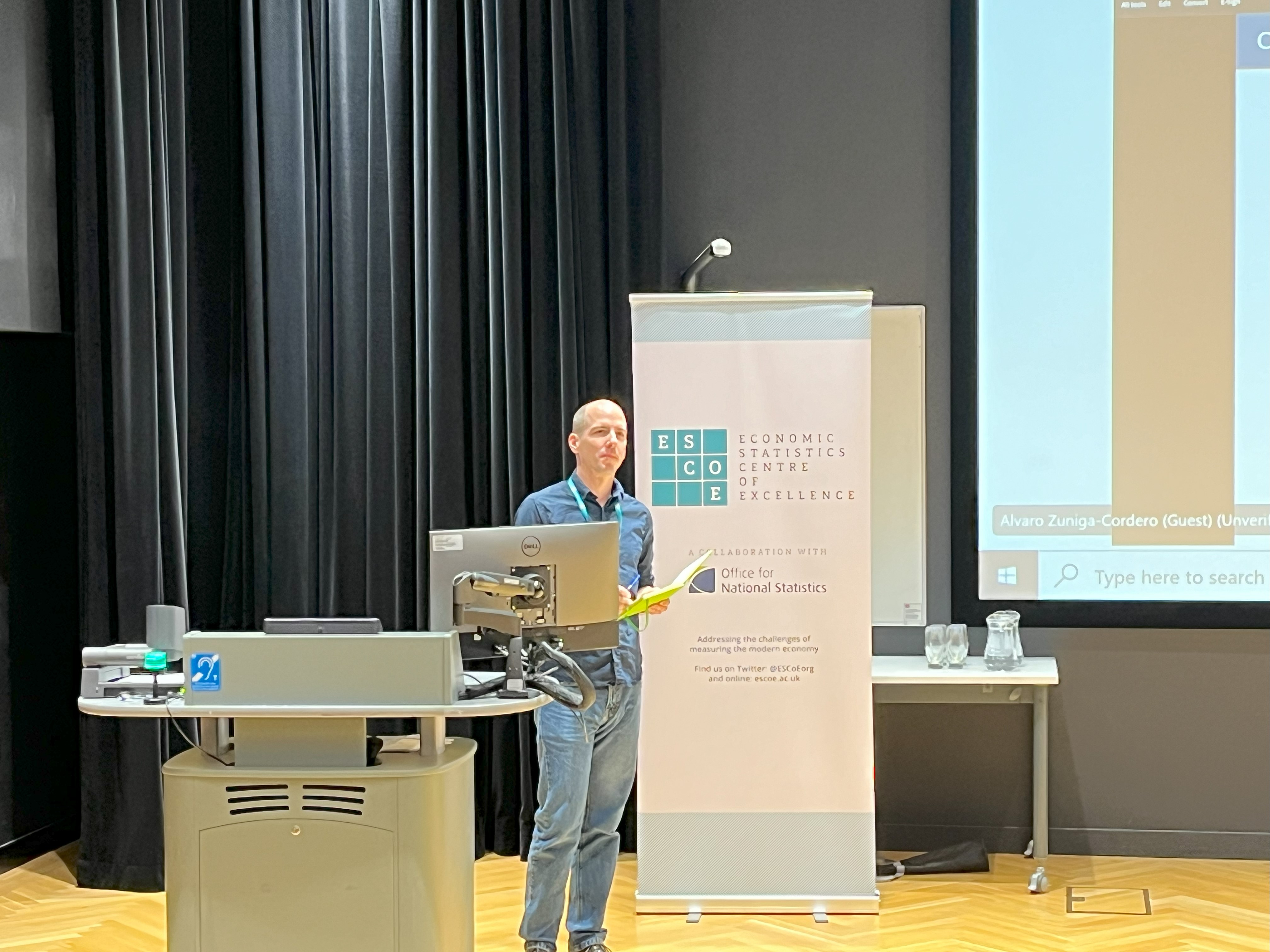
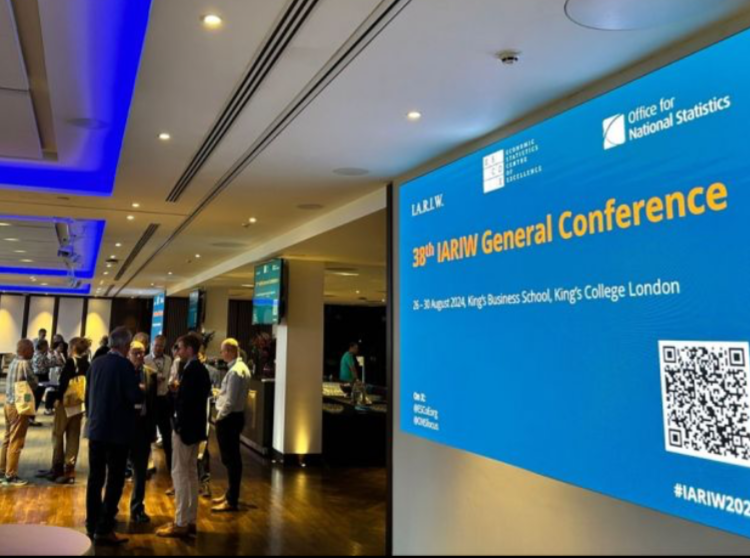
August 2024: Presentations at Triennial conference of the International Association of Agricultural Economists
Prof. T. Kopp participated in this year`s conference of the International Association of Agricultural Economists (IAAE) in Delhi, India. He presented two papers and co-organized one session:
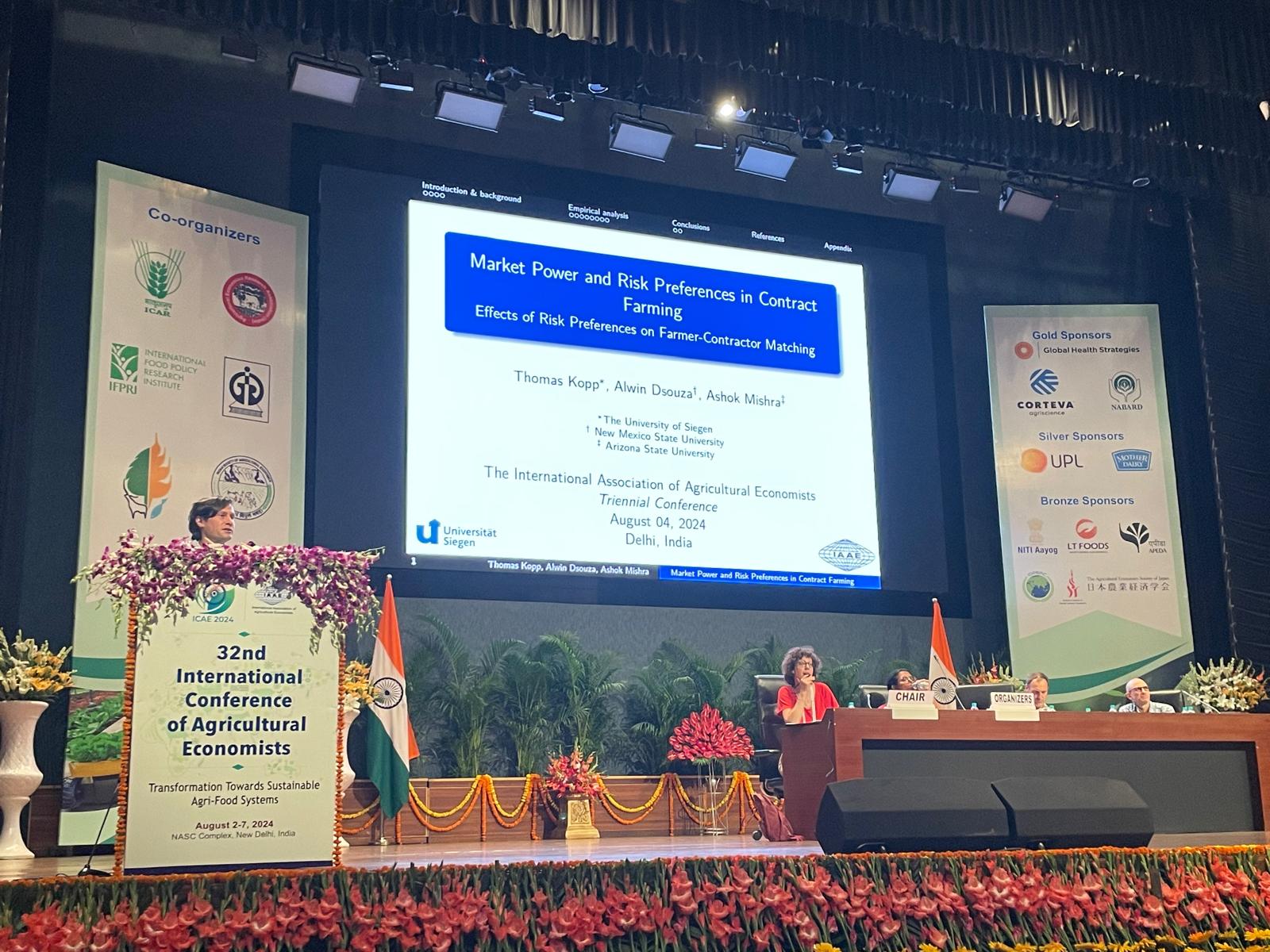
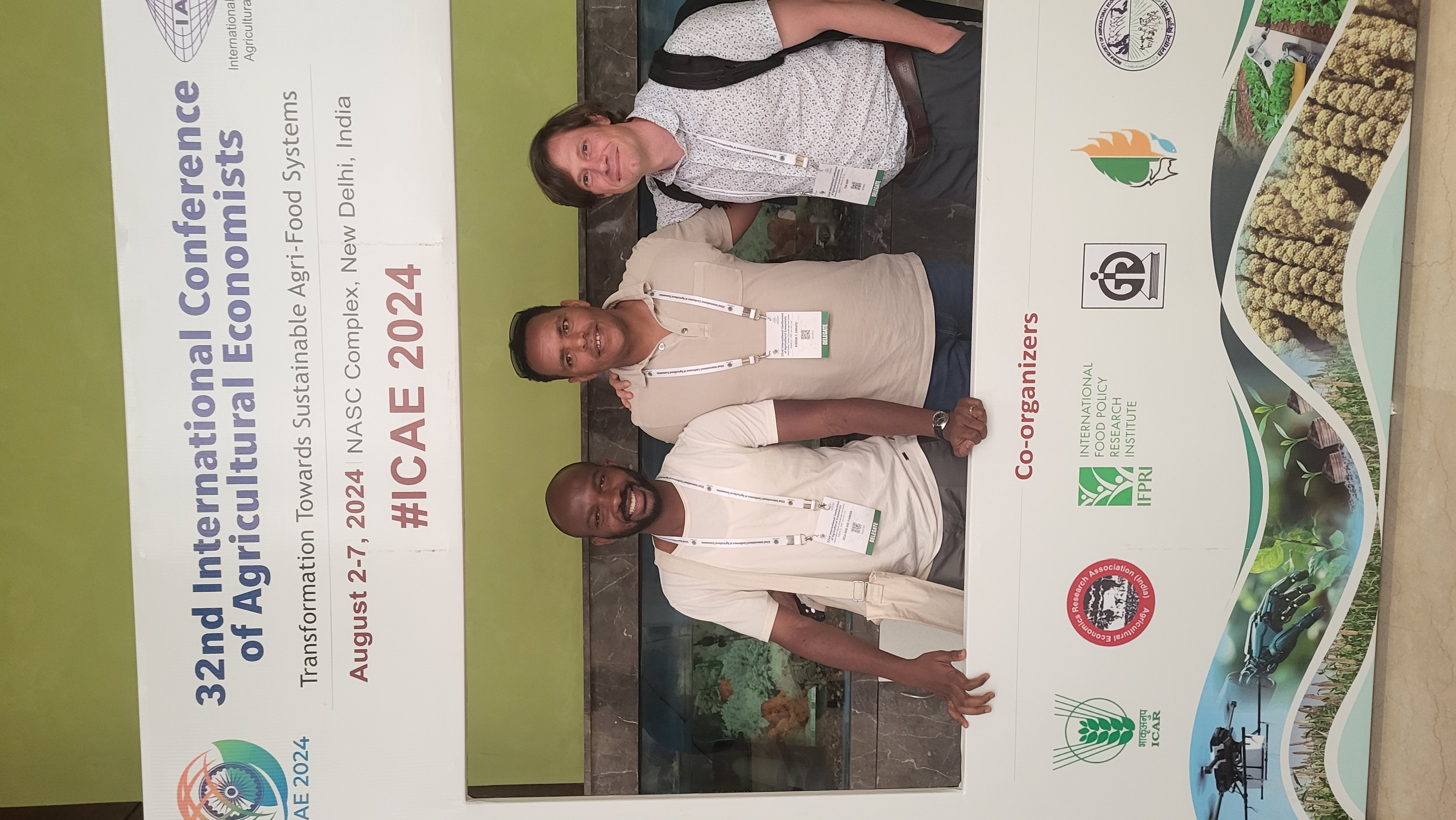

July 2024: Presentation at the 29th EAERE Conference
Mr. Markus Nabernegg participated in 29th Annual Conference of the European Association of Environmental and Resource Economists in Leuven (Belgium), where he presented the paper "Environmental Engel Curves with predicted consumption for high-income households, applied to Ecuador" (co-authored by S. Nabernegg and T. Kopp), within Session "Sustainable development".
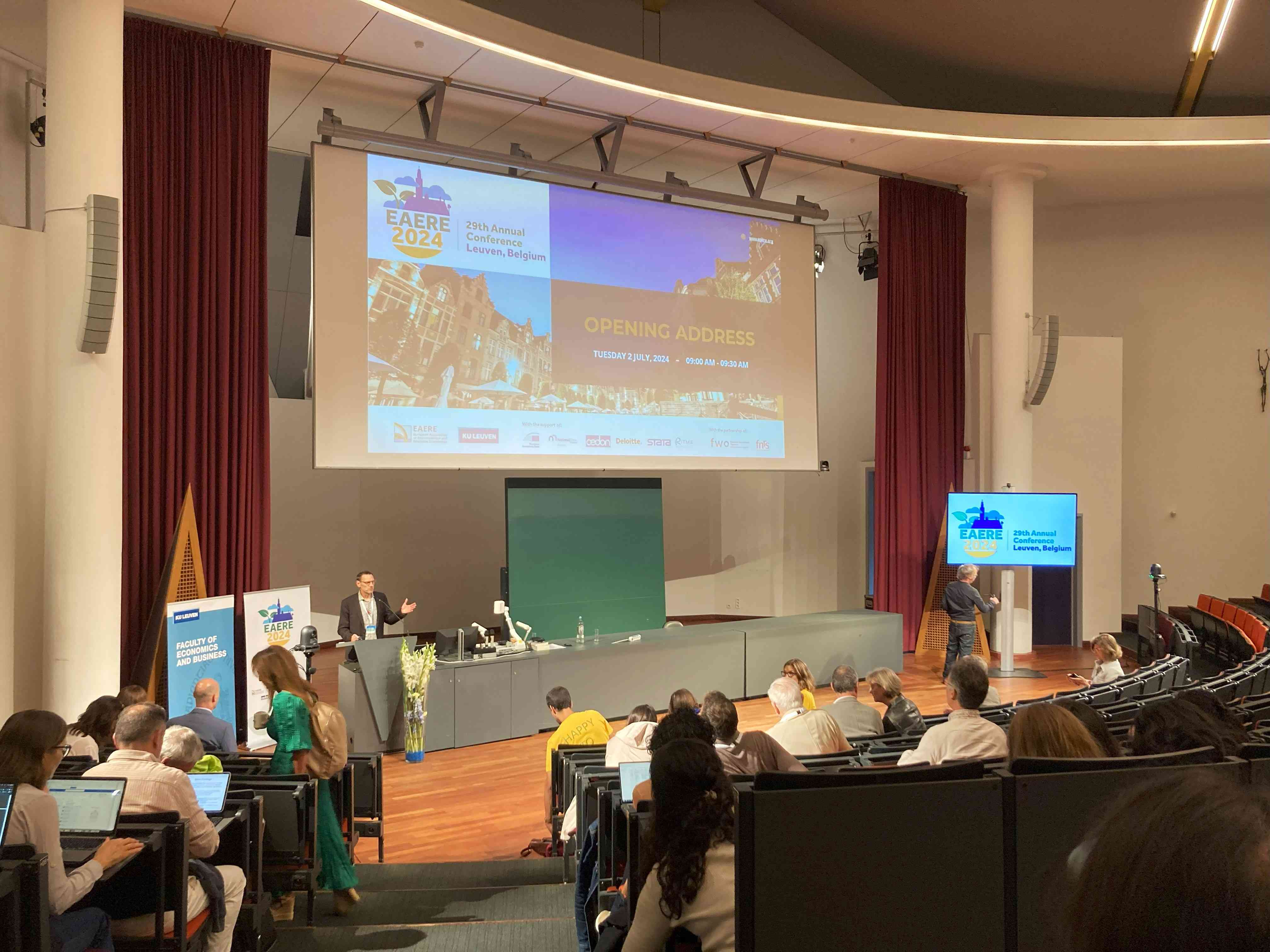
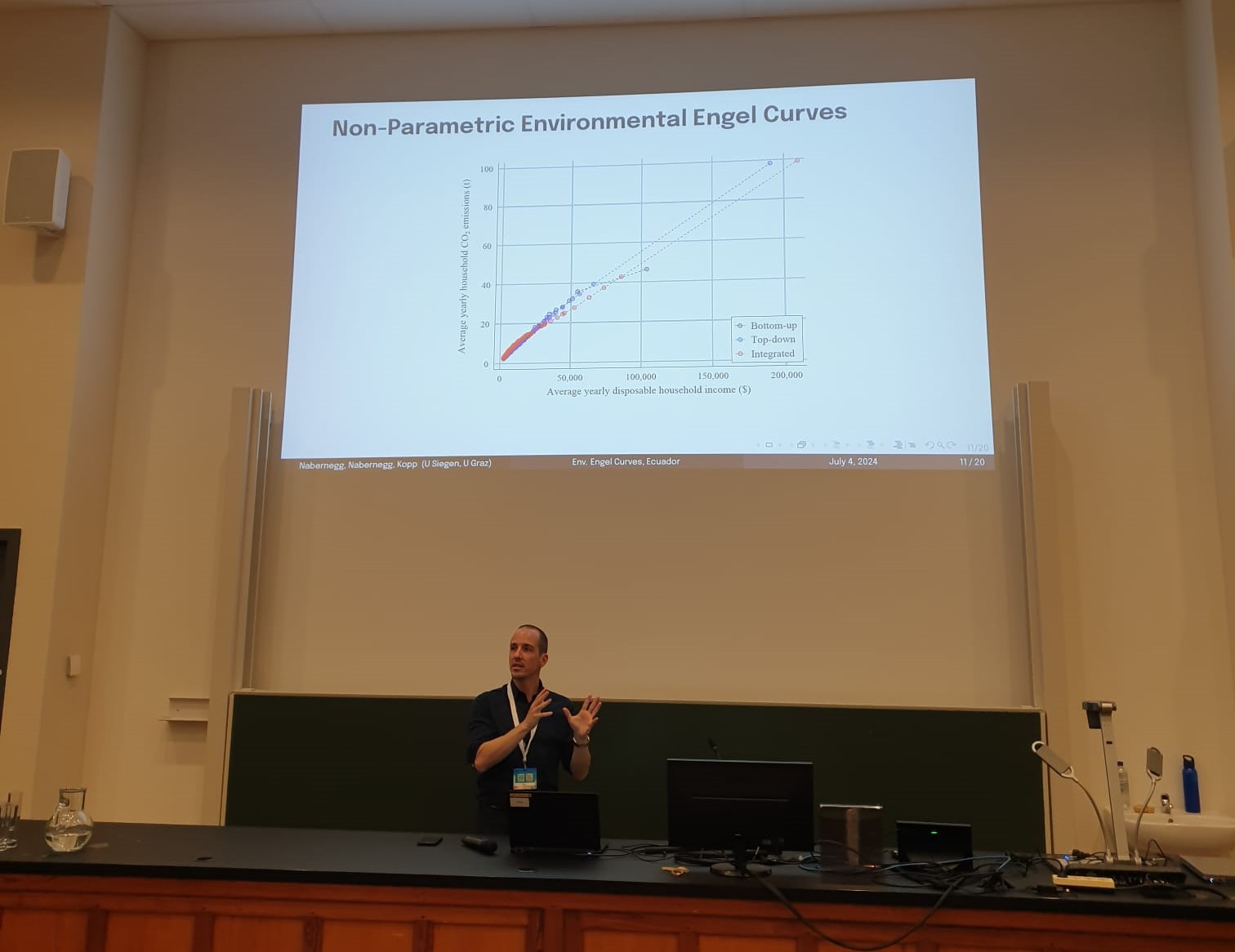
July 2024: New publication
Thomas Kopp, Alwin DSouza, and Ashok Mishra recently an article entitled "The relation between contract type and market power: Evidence from a high-value crop in India" in the journal Food Policy.
The article can be found here: www.sciencedirect.com/science/article/pii/S0306919224000940
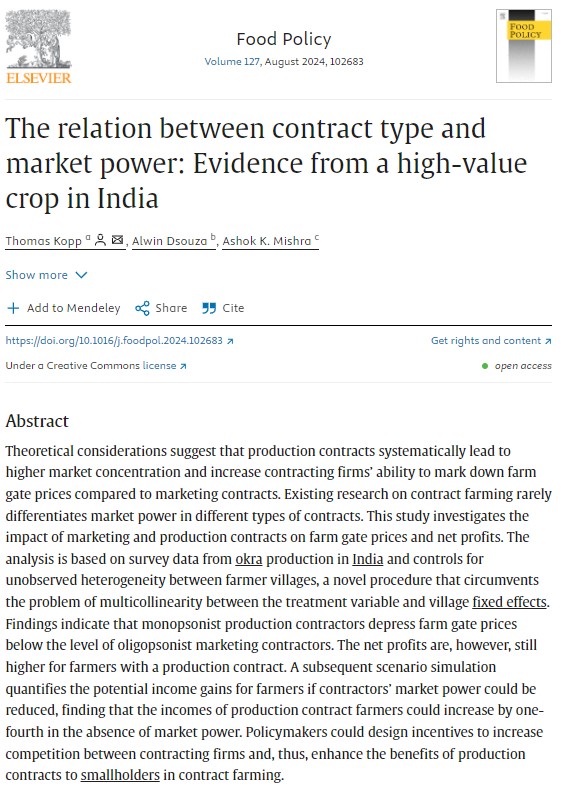
June 2024: Award best BA Thesis
Our student assistant Marcel Böhl has received the School of Economic Disciplines' award for the best thesis in the undergraduate study program Economics at the University of Siegen. Congratulations!The title of the thesis is: "Company Profits, Market Power, and Inflation: An Analysis in the current Discussion on Price Hikes".
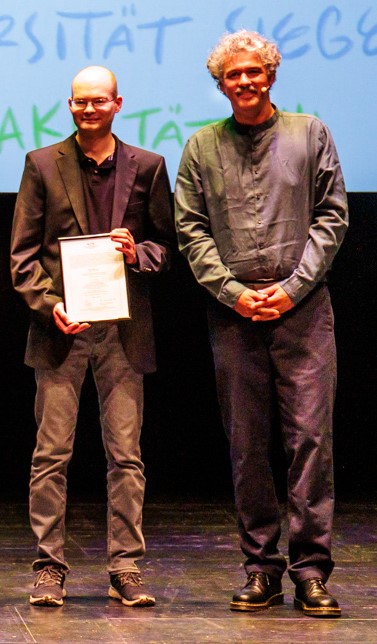
June 2024: Chair Meeting
The Chair of the Jun.-Professorship Economics and Didactics had a team meeting on June 26 and 27. Members presented their current research projects and enjoyed a city tour together.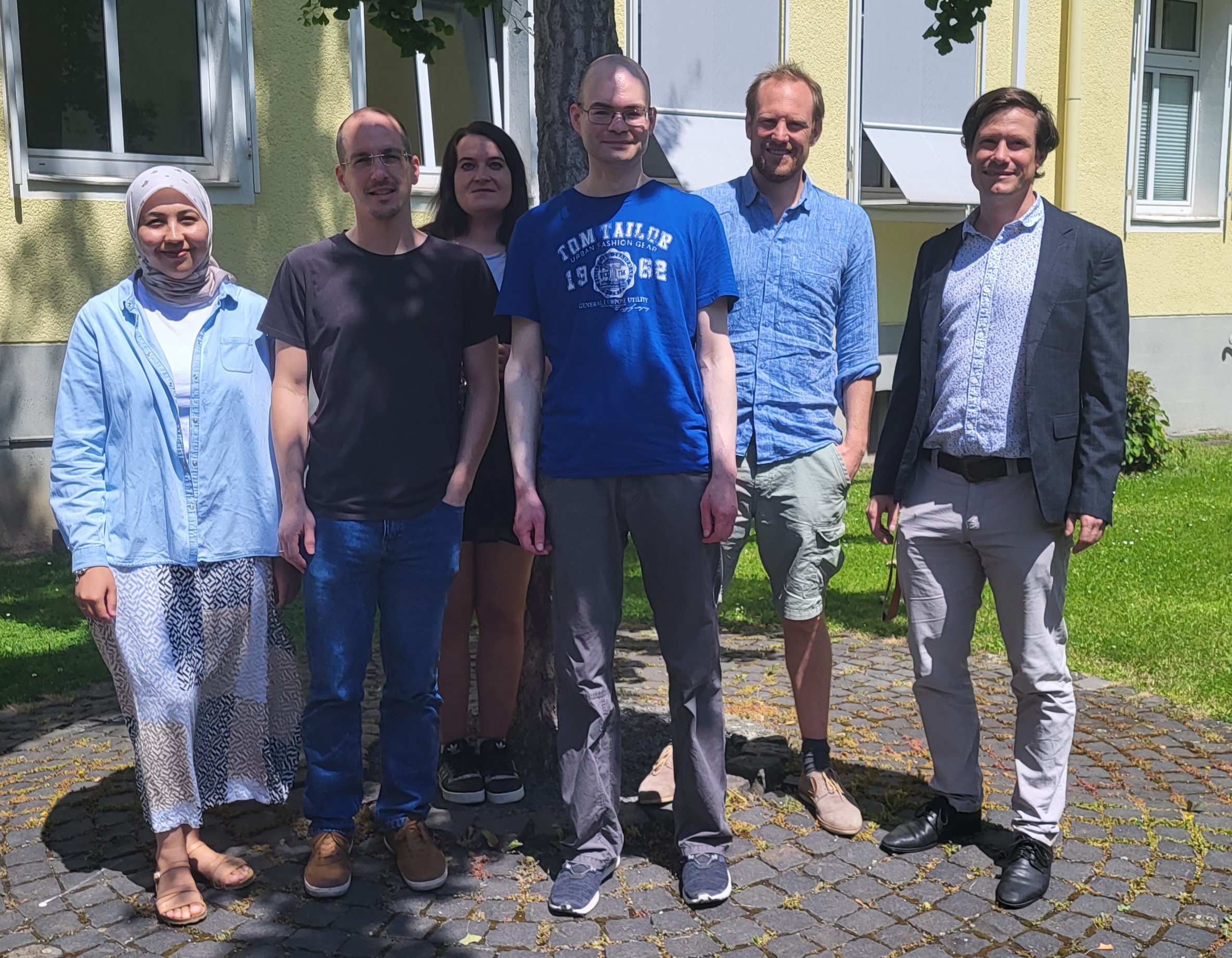
June 2024: Chair members at Biannual Conference of the ESEE
Mr. M. Nabernegg and Prof. T. Kopp participated in this year's conference of the European Society of Ecological Economics (ESEE) in Pontevedra, Spain. They presented three papers:"Determinants of Public Institutions’ Decisions to Disclose their Sustainability Efforts – Results of a Randomized Controlled Trial" (T. Kopp and I. Stademann)
"The Relation between Inequality, Meat Consumption, and the Environment: Trade-Offs in the South, Synergies in the North" (T. Kopp and M. Nabernegg)
"Environmental Engel Curves with predicted consumption of high-income households, applied to Ecuador" (M. Nabernegg, S. Nabernegg, and T. Kopp)
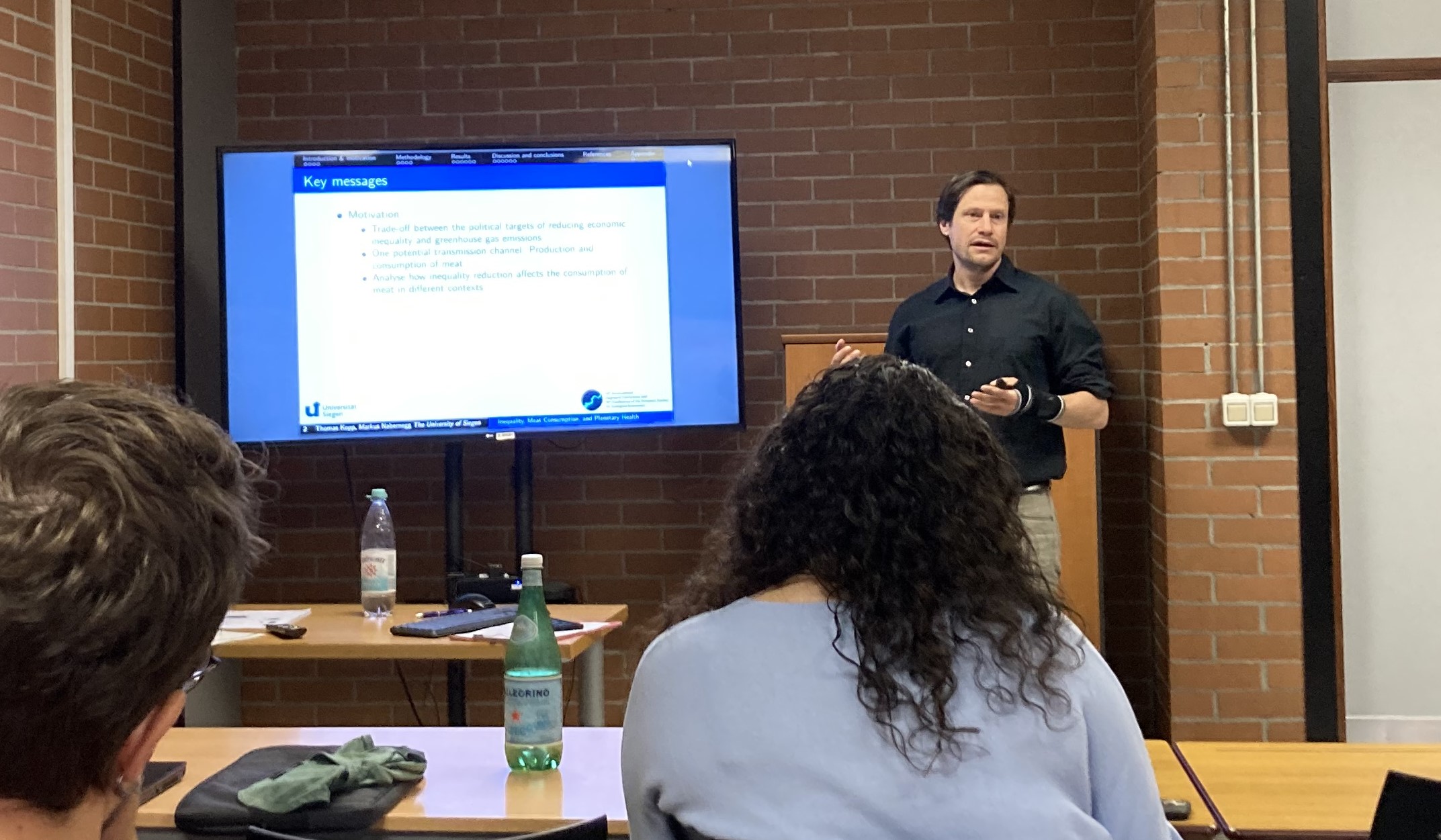
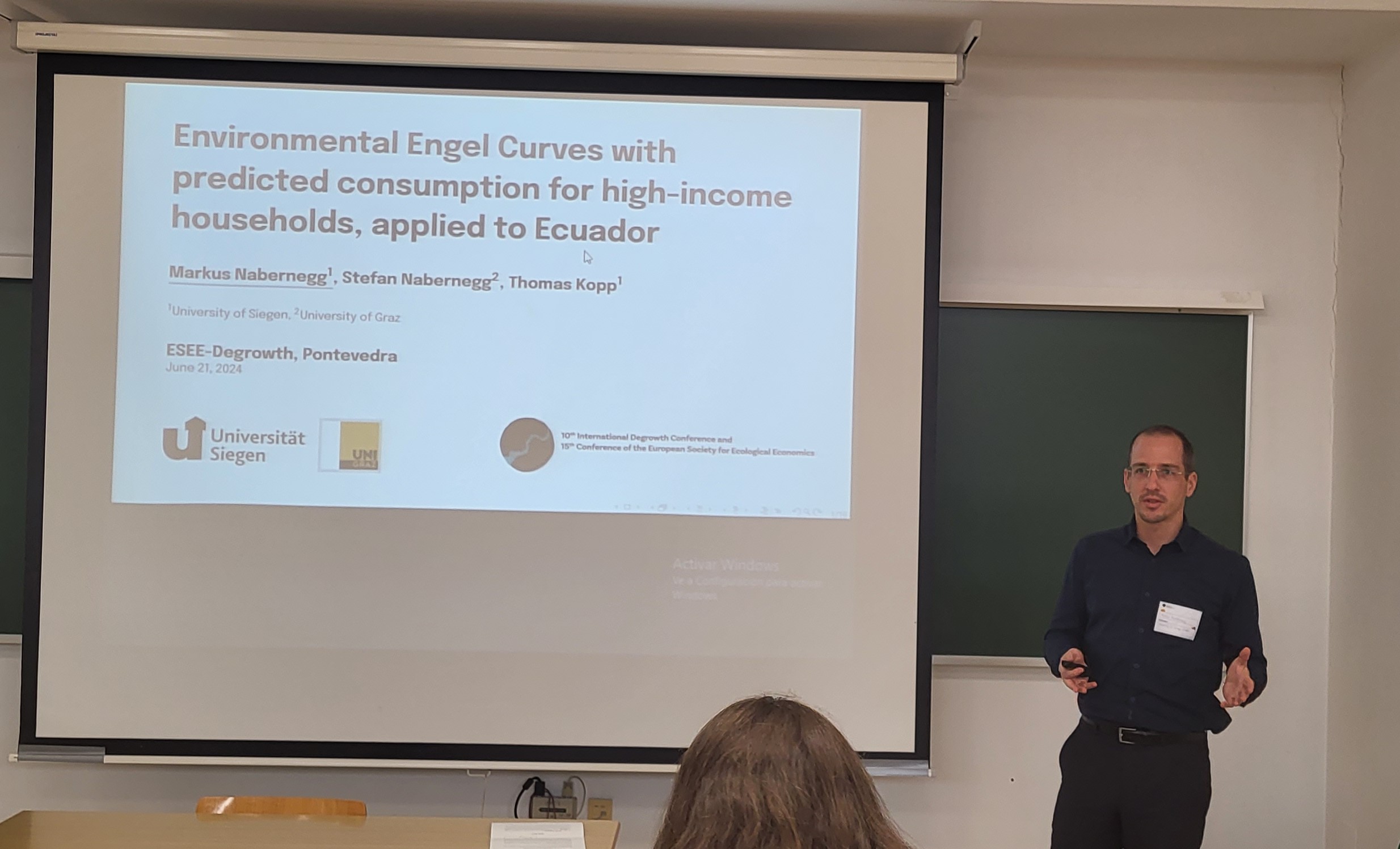
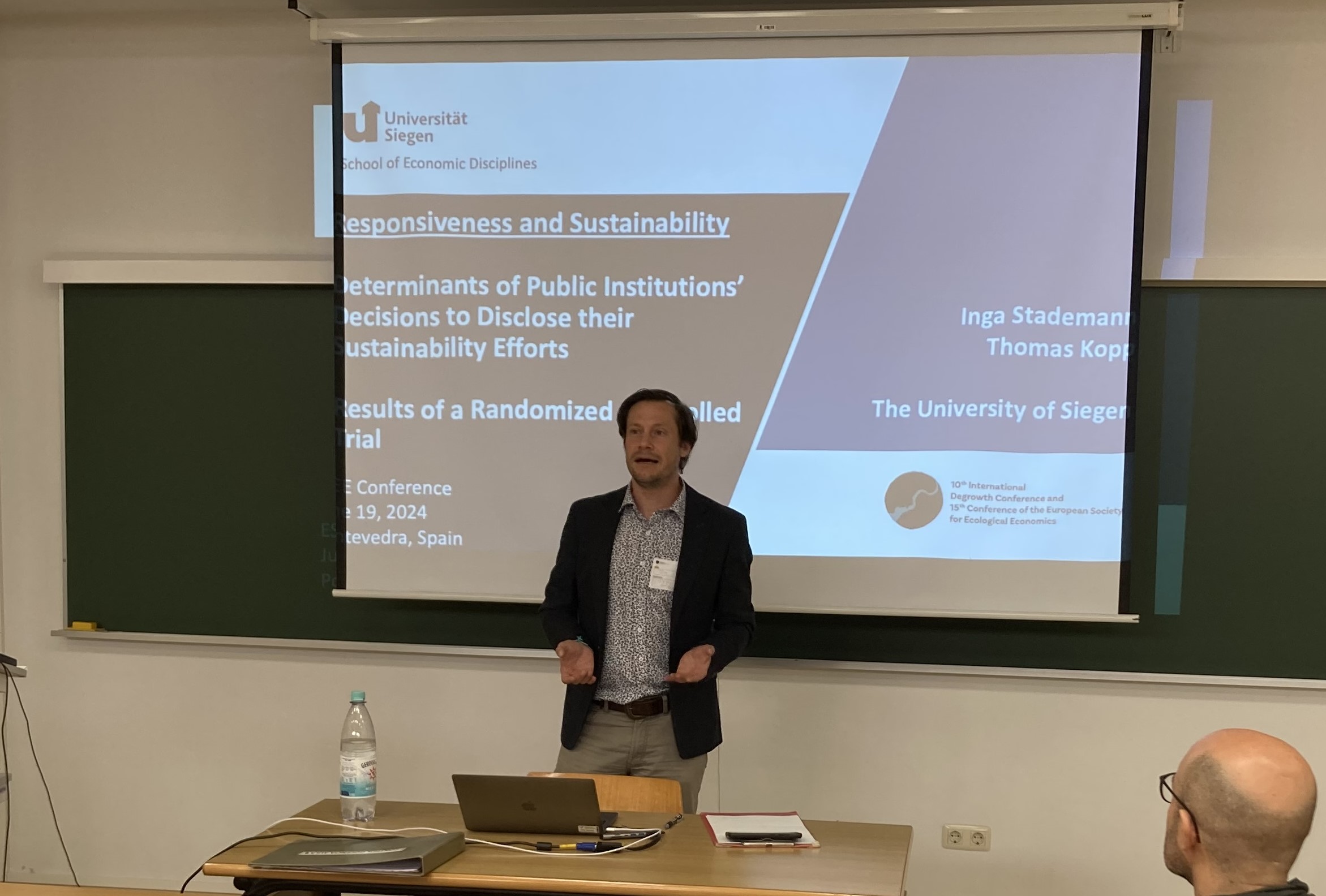
June 2024: Ausschreibung der Stelle einer studentischen Hilfskraft
Die Juniorprofessur für Wirtschaftswissenschaften und ihre Didaktik an der Universität Siegen sucht eine wissenschaftliche Hilfskraft mit Bachelor-Abschluss ab dem 01.09.2024 zur Unterstützung im Drittmittelprojekt "Internationally Connected Digital Classroom Education" und zur Unterstützung bei Aufgaben am Lehrstuhl in Forschung und Lehre zu folgenden Konditionen:
- 8 Wochenstunden bei monatlichem Gehalt in Höhe von EUR 513.
- Eine ständige Anwesenheit in Siegen ist nicht erforderlich.
- Bewerber benötigen einen Bachelor-Abschluss und müssen an einer deutschen Hochschule immatrikuliert sein.
Wir nehmen Bewerbungen fortlaufend entgegen. Bitte senden Sie diese an claudius.engeling@uni-siegen.de und thomas.kopp@uni-siegen.de
Weitere Details finden Sie unter diesem Link
May 2024: Advertisement for student assistant position
The Junior Professorship for Economics and their Didactics at the University of Siegen advertises the position of a Research Assistant with a Bachelor`s degree to start on 01.09.2024 with the following conditions:
- 8 Hours per week at a monthly salary of EUR 513.
- Permanent presence in Siegen will not be required.
- Candidates must have obtained a BA degree and be enrolled in a German university.
Applications are to be sent to thomas.kopp@uni-siegen.de before June 16, 2024.
More details can be found under this link
May 2024: The second hybrid lecture of the ICODICE project has taken place
Students from the University of Siegen and the Kerala Agricultural University (KAU) followed Ms. Riza Mathew's lecture on urban gardening.
A series of digital participation formats enabled students from Germany and India to interact with each other.
The lecture was part of the ICODICE (Internationally connected digital classrooms education) project of the University of Siegen and KAU, which designs courses in teacher training and makes digital teaching methods tangible based on the topics of global inequality, socio-ecological sustainability and climate justice from the perspectives of the Global North and South.
The project leads are Dr. Archana Raghavan Sathyan from KAU and Junior Professor Dr. Thomas Kopp from the University of Siegen. Project coordinators are Aswathy Rani and Claudius Engeling.
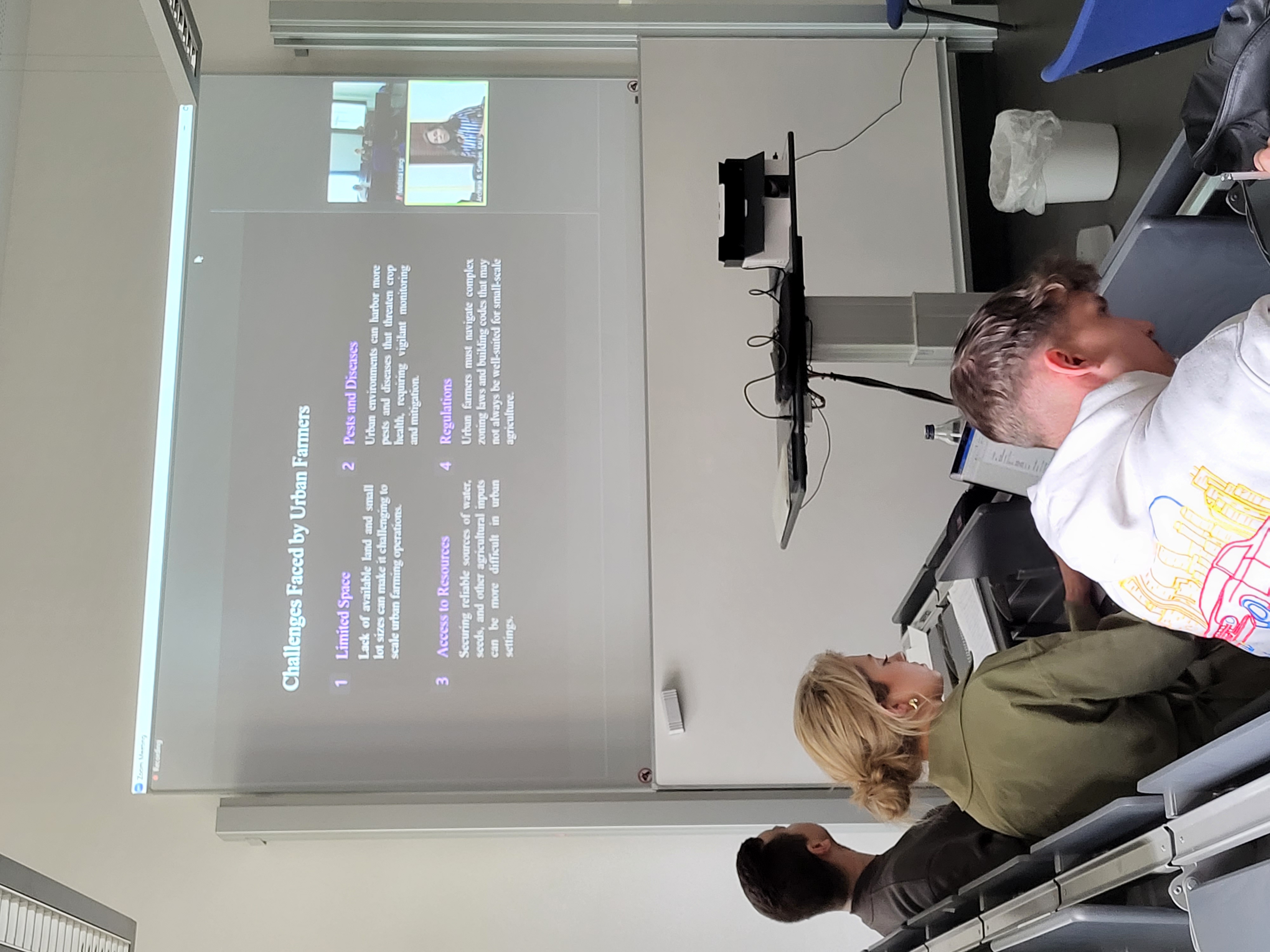
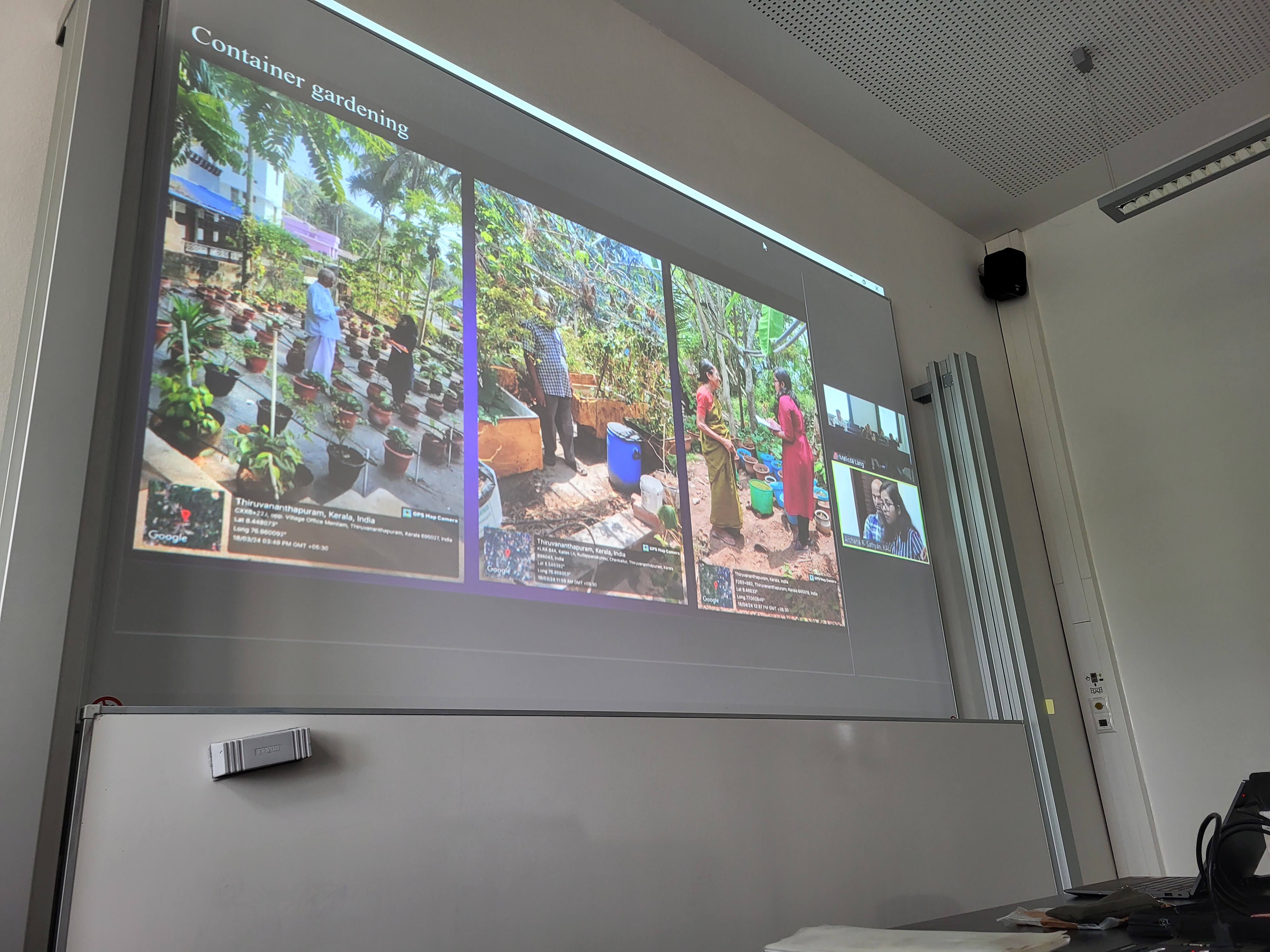
April 2024: Conference "Real-world laboratories"
Several members of our project LANTERN participated in the conference "Real-world laboratories - experimental spaces for the path to a sustainable society" at the Leibniz Institute of Ecological Urban and Regional Development in Dresden, Germany. Dr. Niklas Heiland and Severin Caspari from Heiland&Caspari Prozessbegleitung gave a joint workshop with Prof. Kopp on the acceleration in the science system.
Link to the event (in German): https://www.ioer.de/veranstaltungen/rink2024
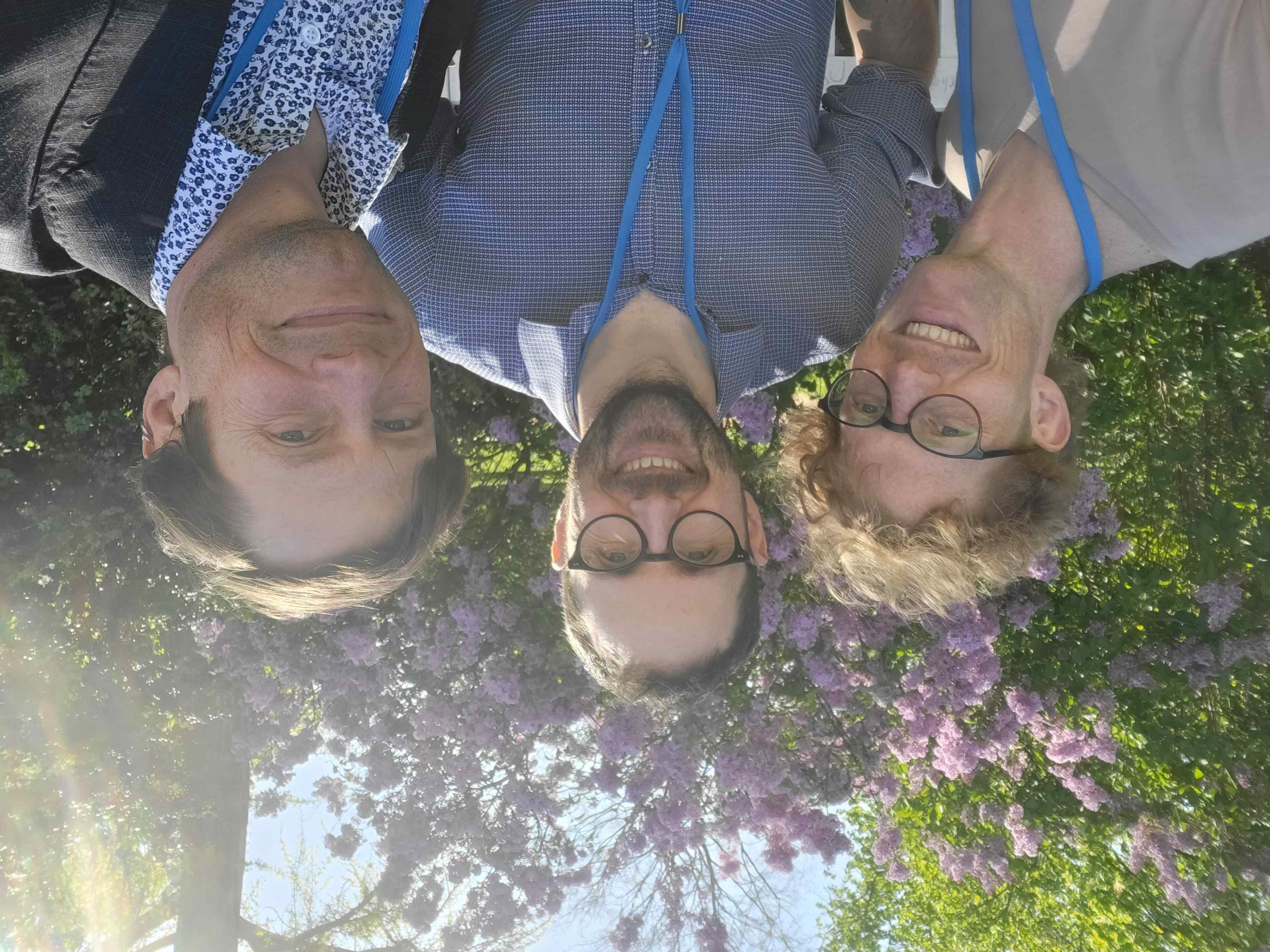

March 2024: Data Collection for "The Good Life for All" at Schools in Zanzibar
Ayça Akçakoca, member of the Center of Economic Education and collaborator of our working group, conducted a data collection campaign for the evaluation of our learning game "The Good Life for All" at schools in Zanzibar in March 2024.
Ayça visited several schools on the island, including the Haile Selassie School, and personally led the implementation of the learning game on-site. During her stay, the students actively engaged with the game and participated in pre- and post-tests, which serve both as competence assessments and for capturing students' value orientations.
This data collection will provide valuable insights into the impact and effectiveness of the learning game. We are excited about the results and how we can utilize them to enhance the learning experience of young people and prepare them for their future endeavours.
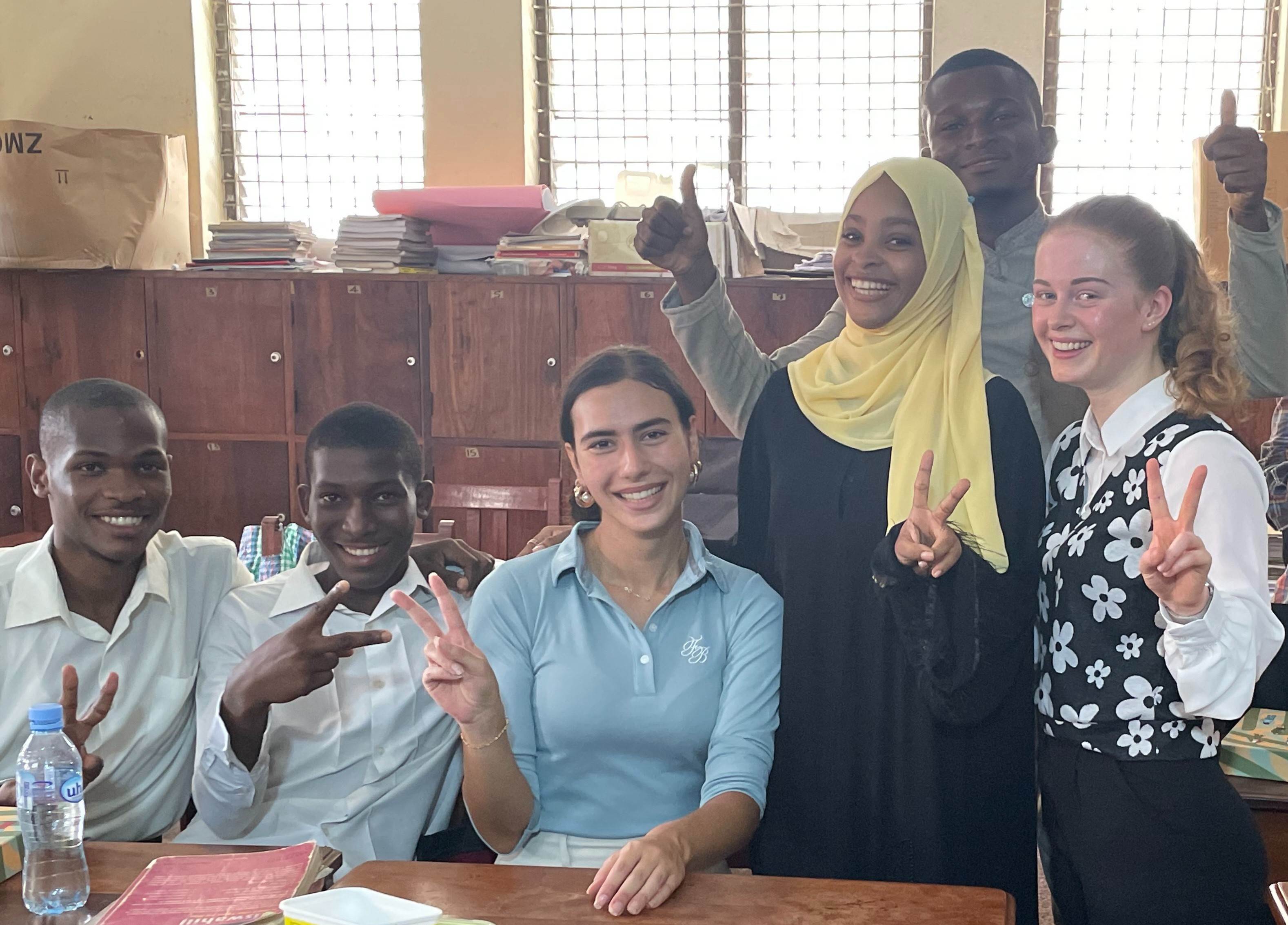
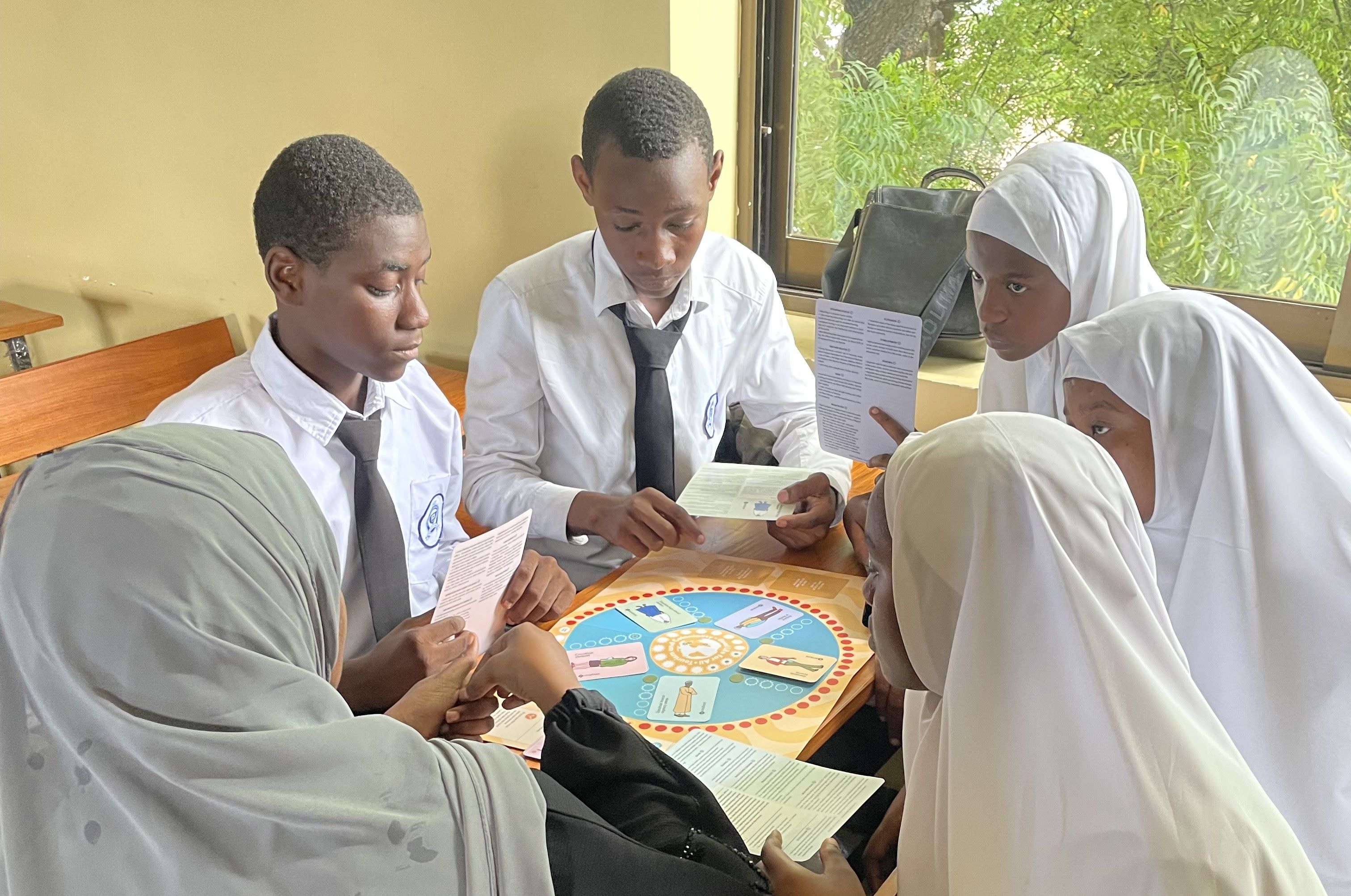
March 2024: MAGKS Colloquium
Each term the MAGKS Doctoral Colloquium takes place at Marburg Castle. The colloquium aims at providing PhD students and postdocs from the MAGKS network with an opportunity to present their research and to get to know professors and colleagues from other MAGKS universities. Our research assistant, MSc. Dilsuz Nurmukhanmatova participated by giving a 30 minute presentation about her research project "Determinants of market power in European industries", 21-22 March, 2024. After the presentation, she had a chance to get some valuable feedback by professors and other PhD students from the MAGKS network.
The detailed information about the colloquium and the program can be found by this link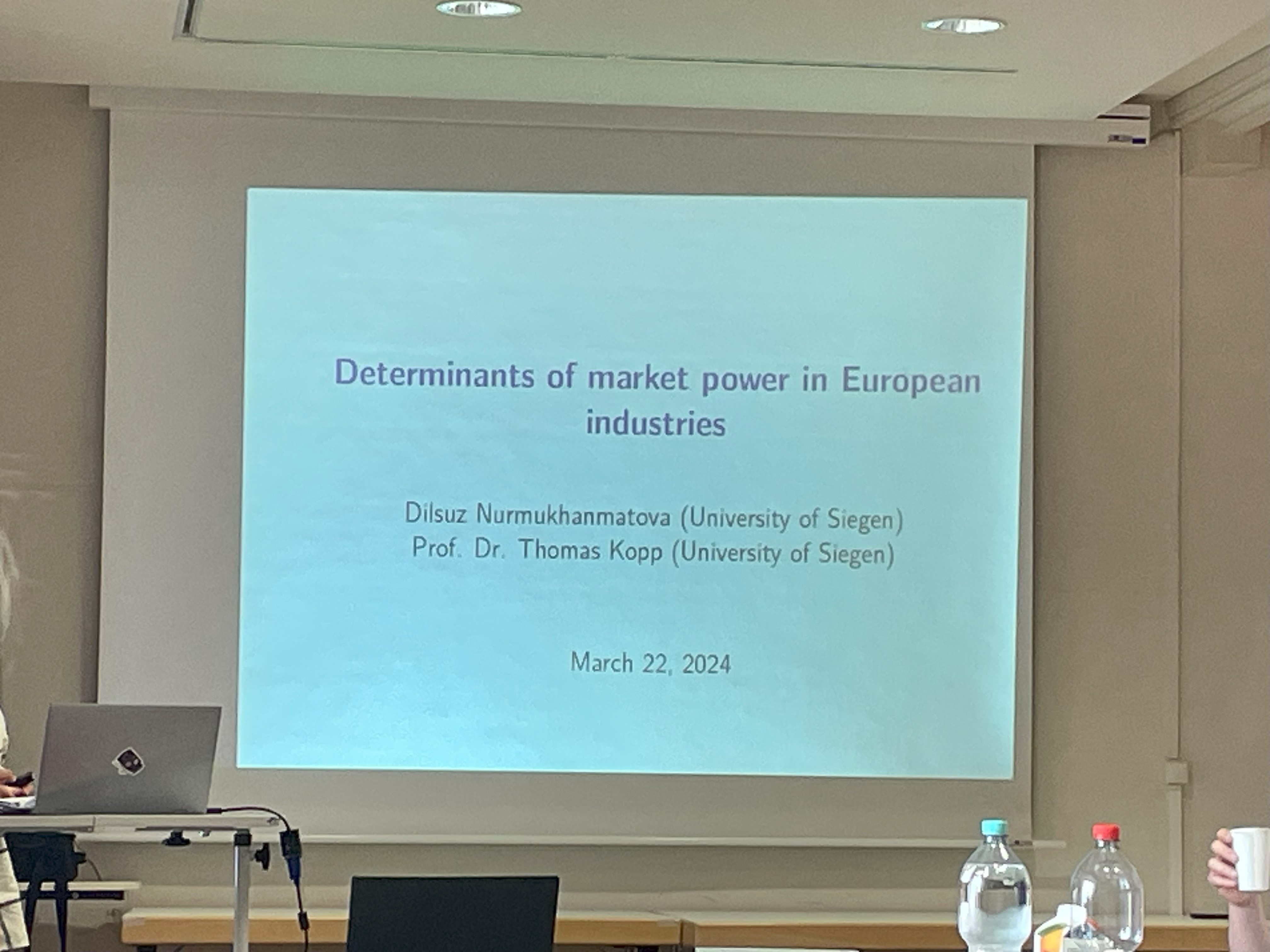
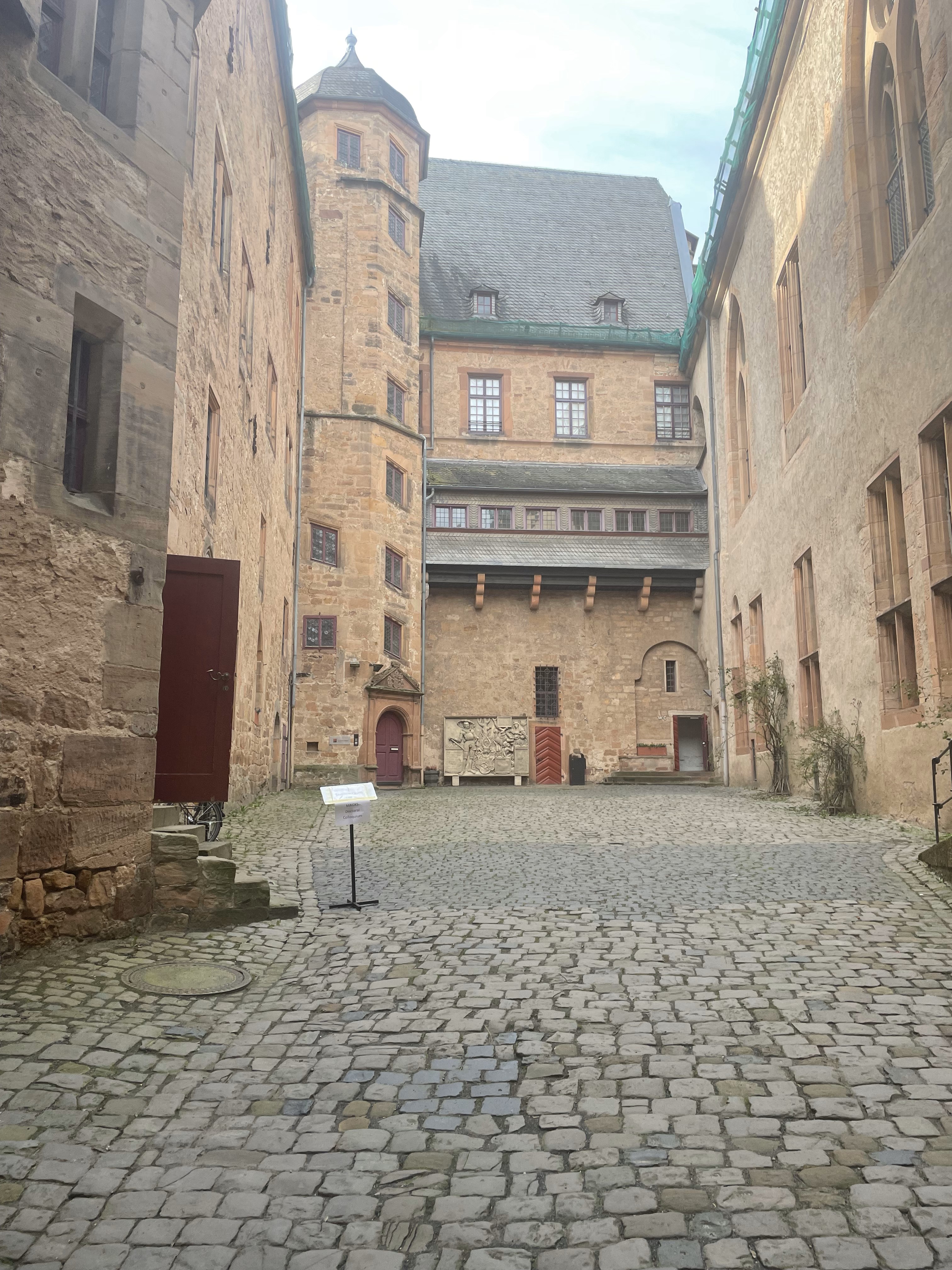
February 2024: New Publication
Thomas Kopp, Alexis Villacis and Ashok Mishra have recently published an article on the topic of "Agricultural marketing channels and market prices: Evidence from high-value crop producers in India".
The article can be found under the following link.
Abstract
Smallholders in developing and emerging economies face significant challenges when marketing fruits and vegetables. Over the past decades, governments have increased efforts to provide smallholders with marketing outlets, including contracting firms and government-supported outlets like “mandis” in India. This study examines the marketing outlet choices of fruit and vegetable producers in this region and assesses how marketing channel choices influence the prices they receive for their products. Utilizing farm-level data, the study reveals that local crop producers receive higher prices (13 to 73 percent more) when selling through mandis compared to private traders. In comparison, farmers of high-value export crops receive lower prices (19 percent less) when selling through mandis compared to private traders. This disparity emphasizes the need for tailored marketing policies rather than one-size-fits-all approaches for smallholders in development contexts.
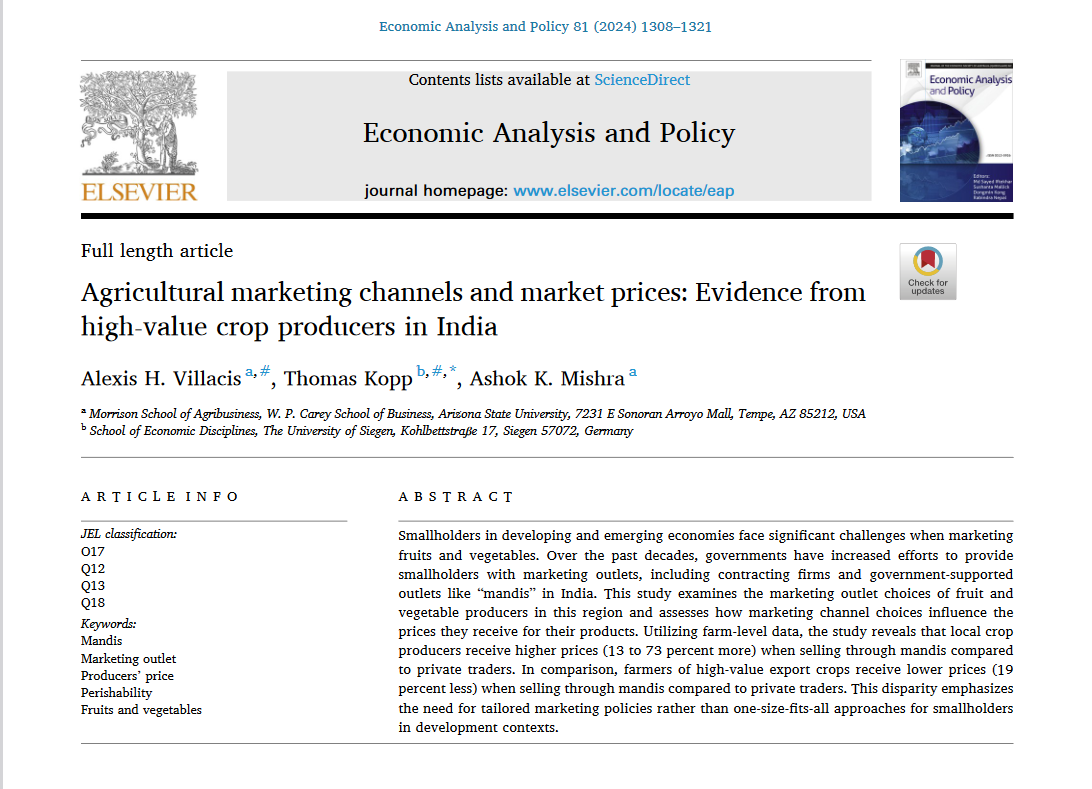
January 2024:
The local newspaper "Siegener Zeitung" reports on our projects "LANTERN" and "GreenPaths" which target the sustainable transformation of public institutions and the society at large.
The article can be found under this link.
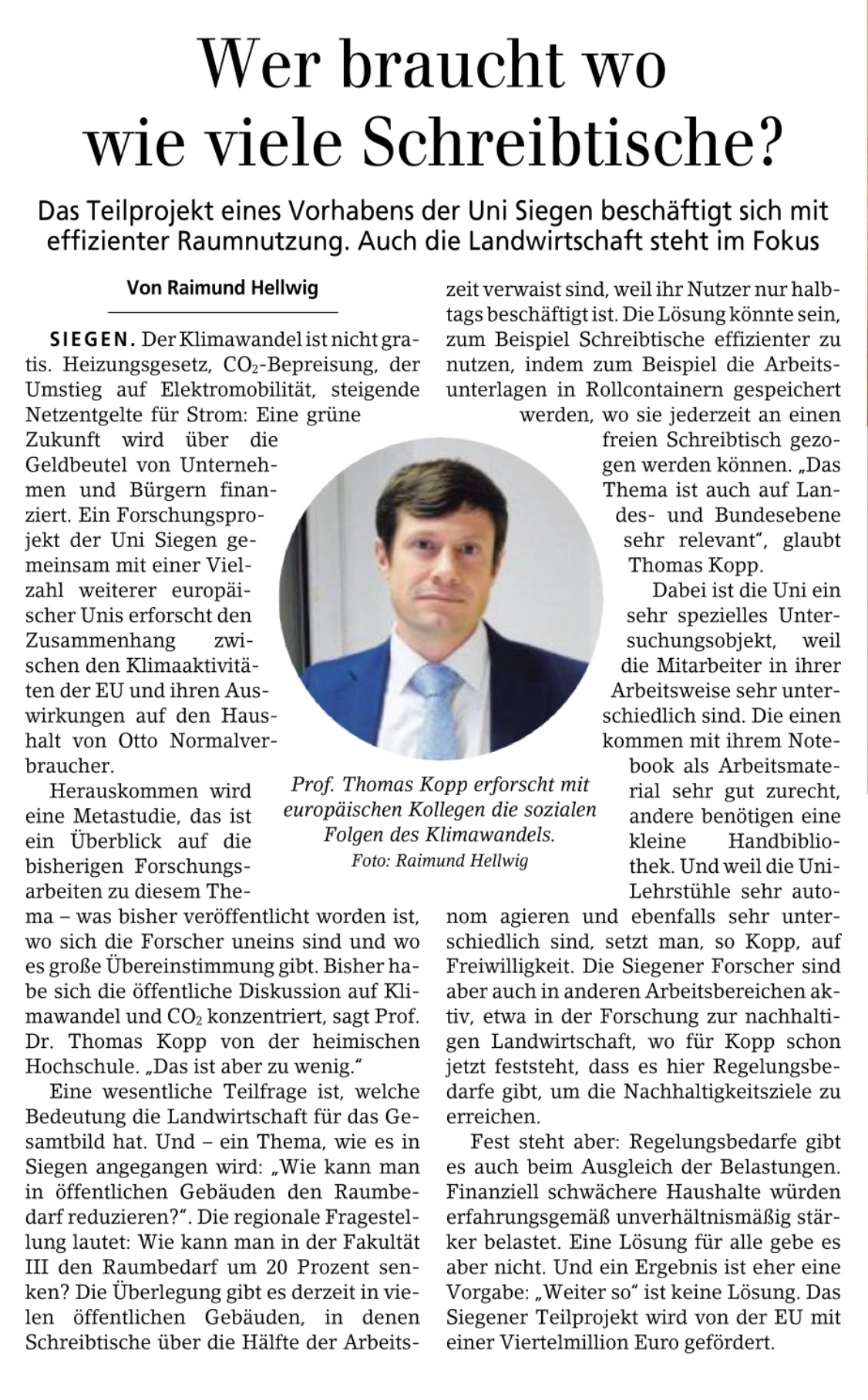
January 2024: Presentation at Paris School of Economics by Markus Nabernegg
PhD candidate Markus Nabernegg recently presented his research at the Inequality and the Environment Symposium organized by Sciences Po's Center for Research on Social Inequalities, the World Inequality Lab, Paris School of Economics, and the Harvard Kennedy School.
Mr. Nabernegg talked about Environmental Engel Curves whose quality he improves by prediction the consumption of high-income households, the so-called missing rich. The analysis is applied to Ecuador and its findings challenge the prevailing idea of a concave income-emission relationship, and therefore the existence of a social dilemma between inequality and emission reduction policies.
The symposium program can be found here.
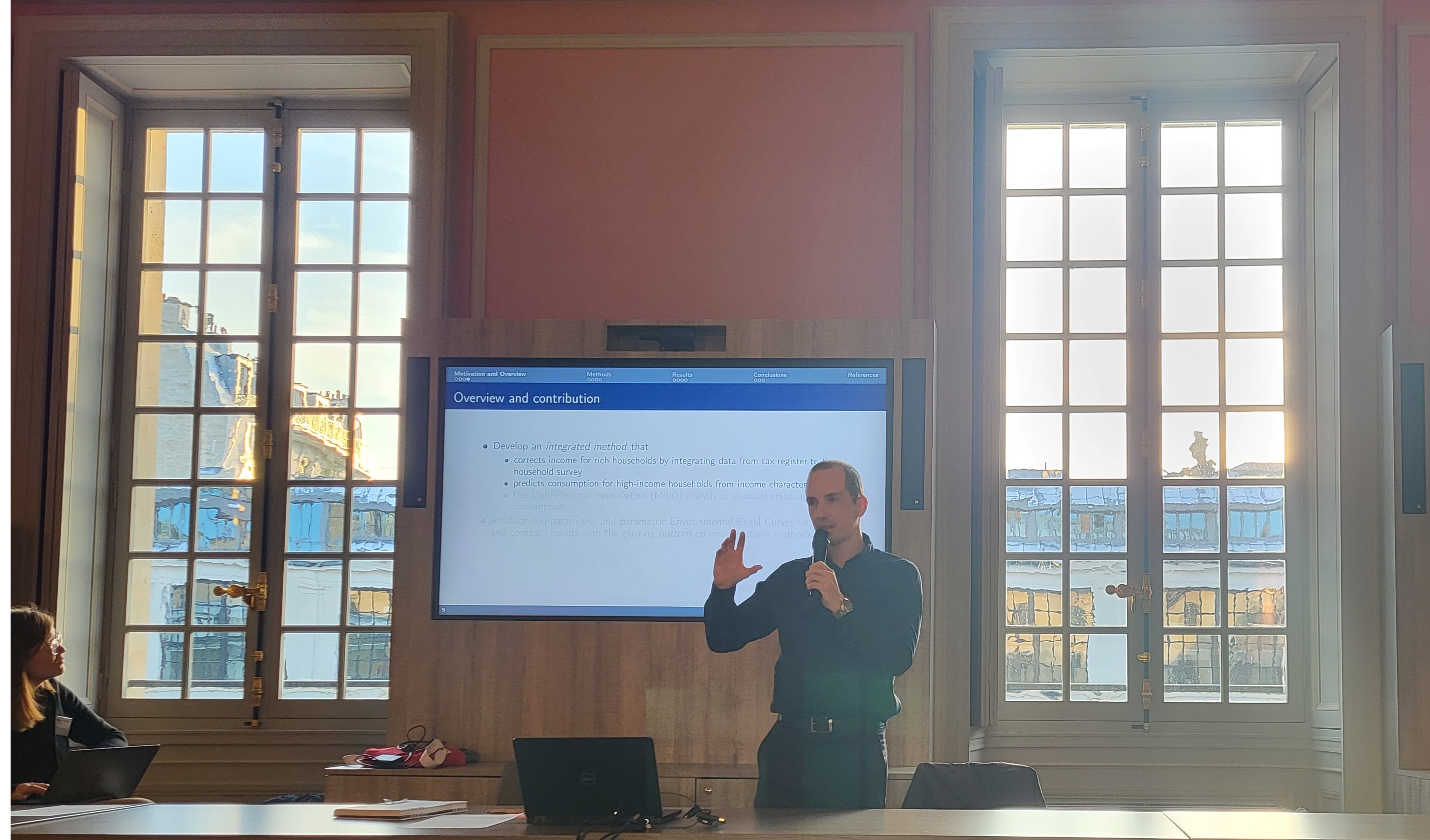
December 2023: Presentation on Households' Food Carbon Footprint by Ondine Berland
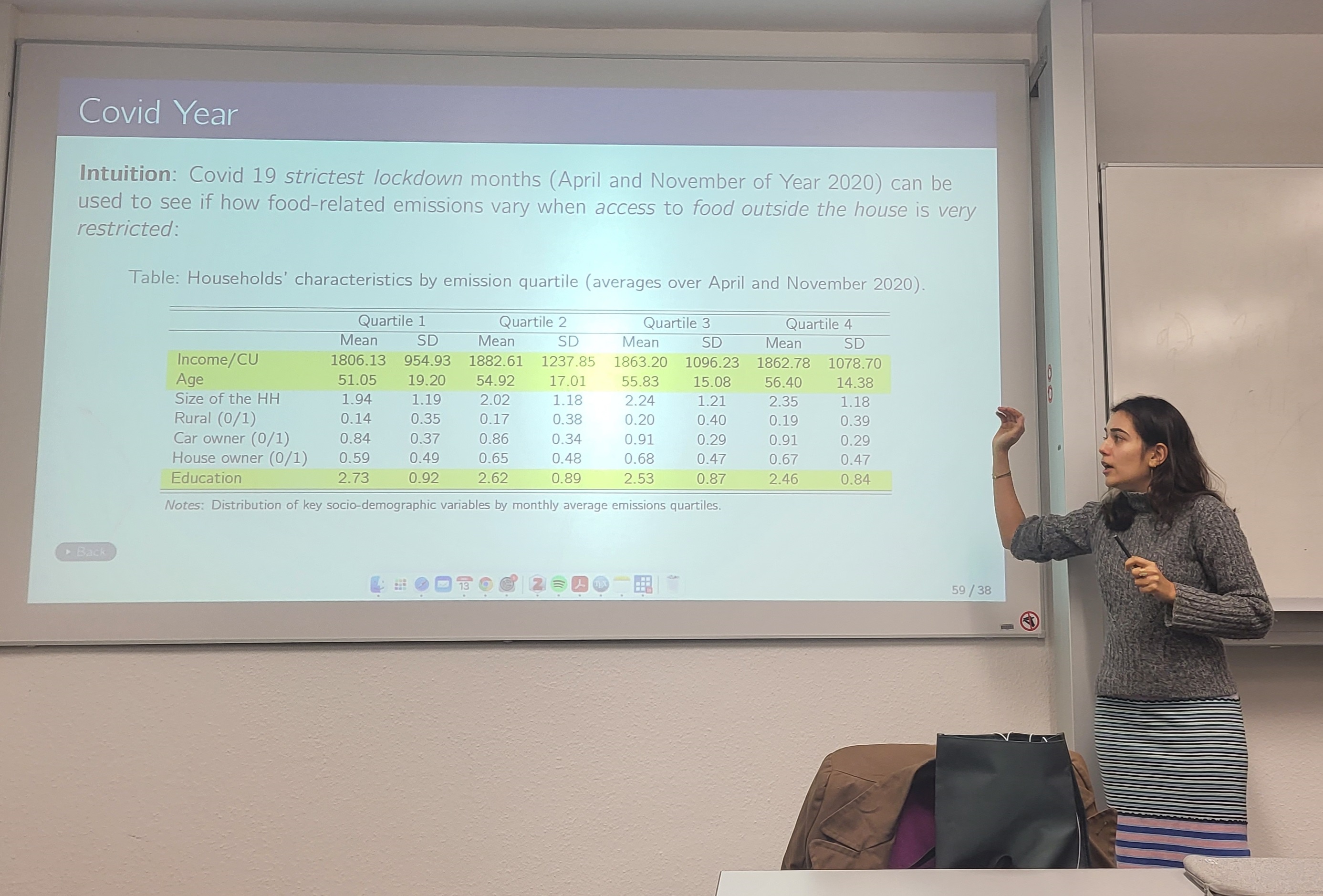
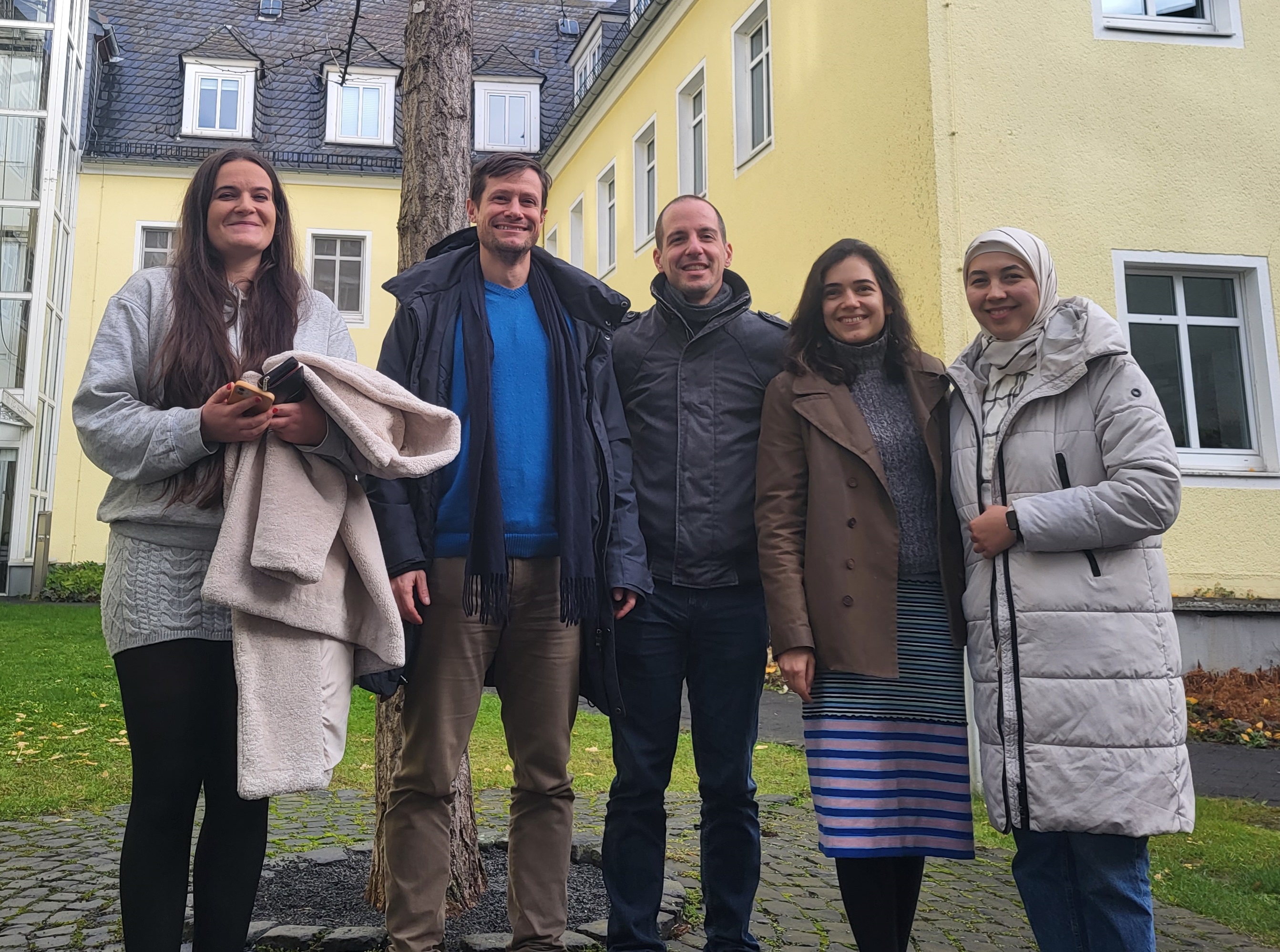
November 2023: New Publication
C. Kubitza, V. V. Krishna, S. Klasen, T. Kopp, N. Nuryartono and M. Qaim (2023): "Labor Displacement in Agriculture: Evidence from Oil Palm Expansion in Indonesia". Land Economics 99(4): 1-51.
The article is open access and can be found under this link.
Abstract:
We analyze the labor market effects of oil palm cultivation among smallholder farmers in Indonesia. Oil palm requires less labor per unit of land than alternative crops, especially less female labor. Micro-level data and nationally-representative regency-level data show that oil palm adoption, on average, led to an expansion of total cropland at the expense of forestland, resulting in higher agricultural labor demand for men. At the same time, women’s employment rates declined due to a substantial decrease in agricultural family labor, which was most evident in regions with high initial land scarcity and thus limited options for cropland expansion.
November 2023: Meeting with Haile Selassie School on Zanzibar
Ayça Akçakoca, member of the Center of Economic Education and collaborator of our working group, met our partners from Haile Selassie School on Zanzibar (Tanzania). She discussed the upcoming research that will evaluate our learning game for highschools, "The Good Life for All", in the next year. Ayça visited the school on site, participated in one session of the learning game, and distributed certificates of participation to the involved students.

October 2023: New Publication
Kopp, T., Nabernegg, M., & Lange, S. (2023). "The net climate effect of digitalization, differentiating between firms and households"
The article can be found under this link.
Abstract
While public debate and prominent studies expect digitalization to substantially reduce energy use and carbon dioxide (CO2) emissions, quantitative research has produced ambiguous results. This study addresses the challenges in the analysis of the relationship between a country’s digitalization level and CO2 emissions by employing the Group Fixed Effects estimator for panel data of EU and OECD countries and by differentiating between emissions associated with digitalization in firms and households.
Results are highly robust to the statistical procedure and indicate that digitalization in both households and firms generally decreases emissions. At the sample median, a 10% increase in firm (household) level digitalization would, on average, decrease emissions by 0.3% (0.8%). In countries of the three lowest deciles in the income distribution, however, the effect is reversed: Here, an increase in digitalization is also associated with an increase in emissions.
The results are further interpreted beyond the median effect and differentiate between countries of different incomes through a non-parametric approach. This analysis also has implications for the discussion of the Environmental Kuznets Curve (EKC) hypothesis, as the empirical analysis nests an estimation of an EKC model, extended by a measure of digitalization.
October 2023: Chair members at International Ecological Economics Meeting
Markus Nabernegg and Prof. Kopp participated in this years' biannual conference of the International Society of Ecological Economics (ESEE) in Santa Marta, Columbia. They presented two papers: "Environmental Engel Curves with predicted consumption for high-income households: An application for Ecuador" was presented by Markus Nabernegg and "The Consequences of Income Inequality for Human and Planetary Health" was presented by Thomas Kopp.
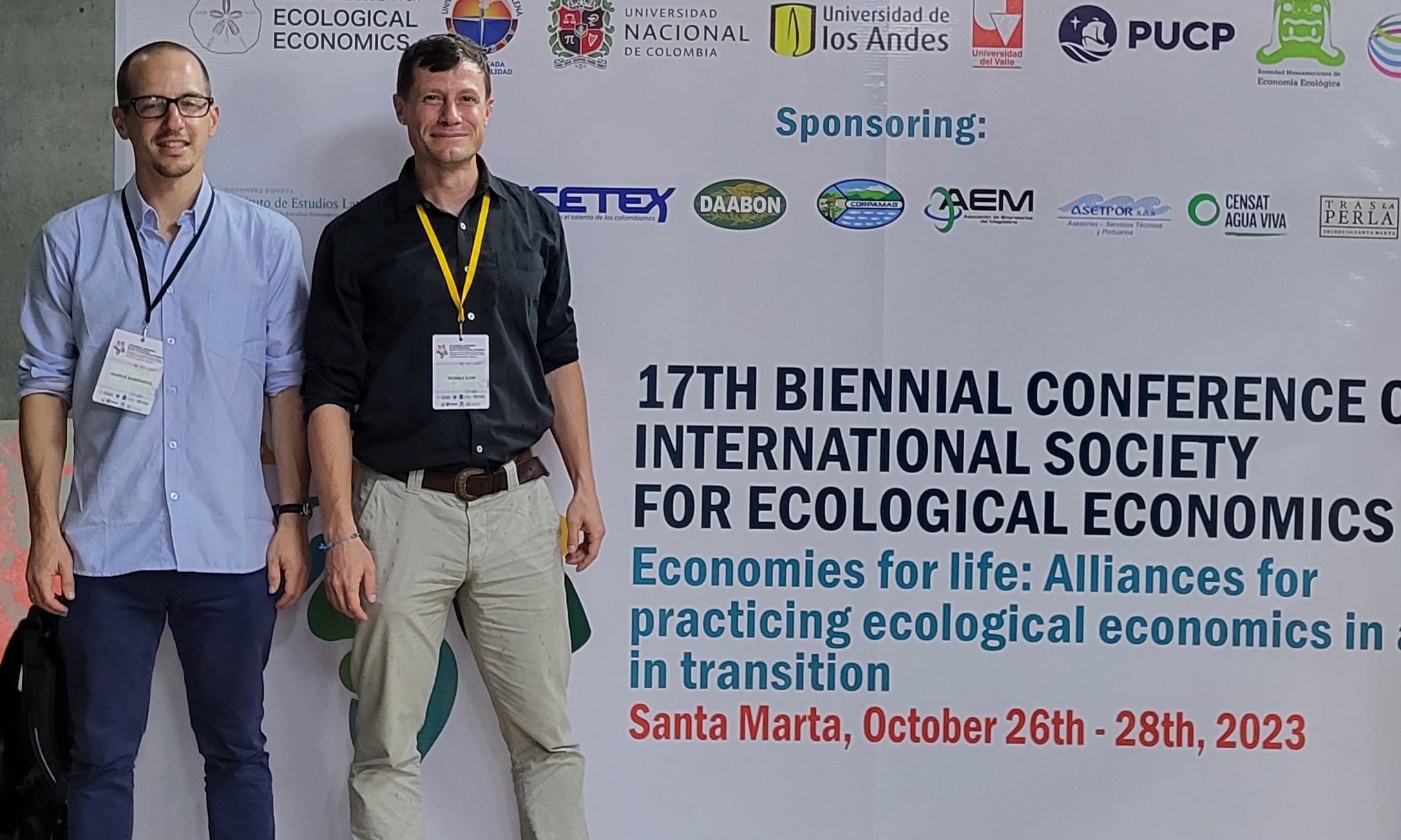
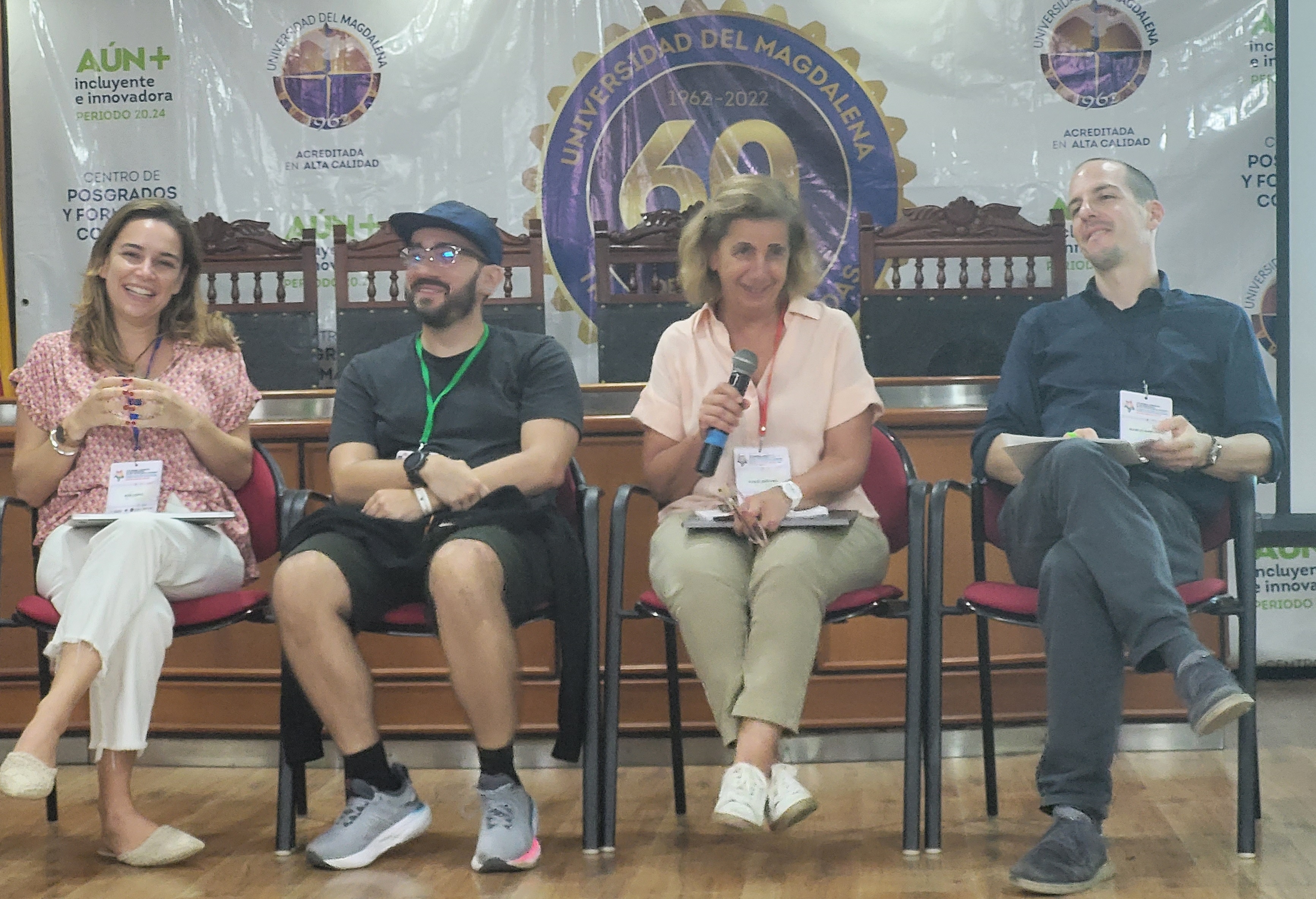
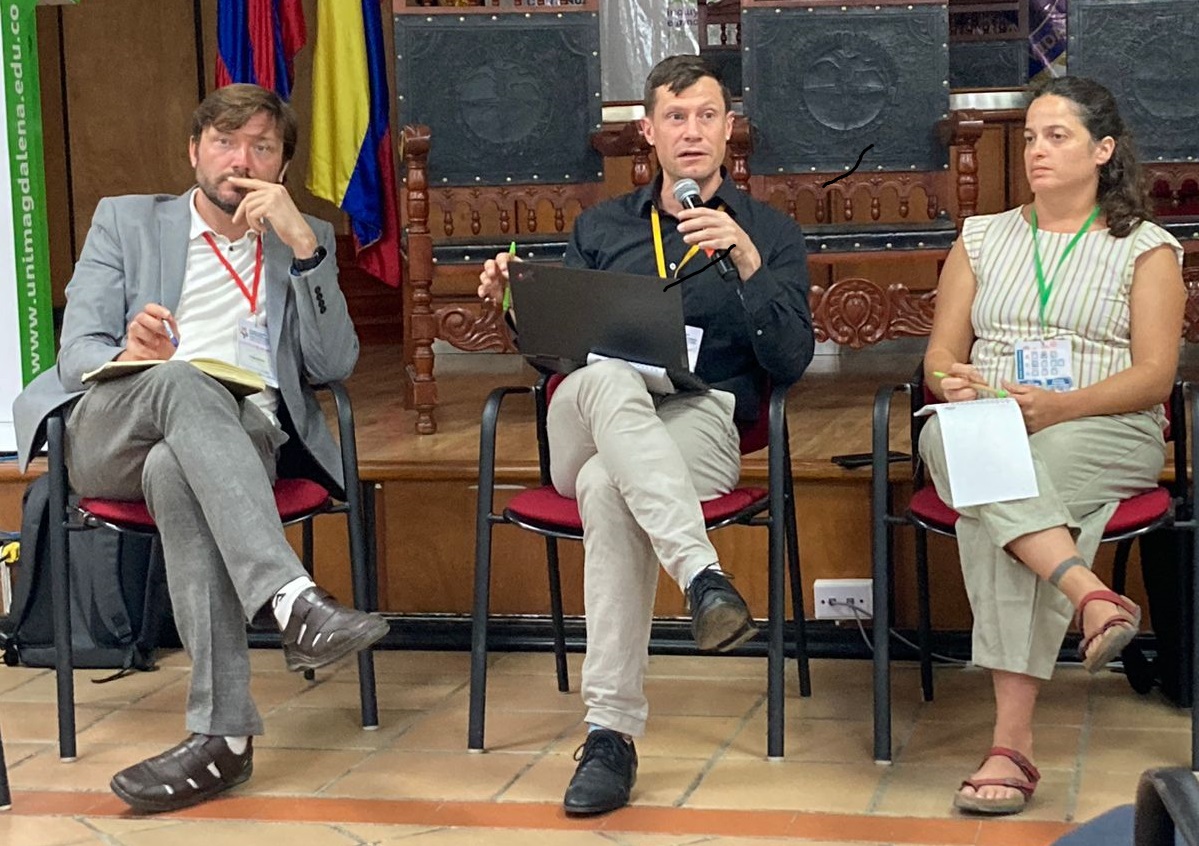
October 2023: Freiraum Funding for the new ICODICE Project received
Prof. Dr. Thomas Kopp and Claudius Engeling have received funding from the “Stiftung Innovation in der Hochschule” under the funding line “Freiraum” for ICODICE. ICODICE stands for “Internationally Connected Digital Classroom Education” and will introduce hybrid teaching formats in cooperation with the Kerala Agricultural University in India.
Abstract
The project has three objectives: To introduce new hybrid online teaching methods in higher education, to strengthen and improve teacher training at the participating universities, and to promote the United Nations Sustainable Development Goals. By increasing knowledge in the field of sustainability, the project also promotes international perspectives and international cooperation.
October 2023: Kick-off Meeting of Horizon Europe Project Greenpaths in Brussels
Prof. Kopp and PhD student Claudius Engeling attended the kick-off meeting of our new Horizon Europe project "GreenPaths: European Knowledge Hub On Just Transition Pathways" ( grant agreement number 101112305) , part of European Union’s Horizon Europe research and innovation programme
GREENPATHS addresses the complex and multi-dimensional nature of the planned transition. Based on an enhanced understanding of key issues and challenges influencing the transitions and an in-depth review and synthesis of the latest and most relevant research, GREENPATHS will enable the development and adoption of more coherent and effective policy strategies and instruments, furthering the positive outcomes and reducing the negative impacts on environmental sustainability and social well-being.
GREENPATHS addresses the complex and multi-dimensional nature of the planned transition. Based on an enhanced understanding of key issues and challenges influencing the transitions and an in-depth review and synthesis of the latest and most relevant research, GREENPATHS will enable the development and adoption of more coherent and effective policy strategies and instruments, furthering the positive outcomes and reducing the negative impacts on environmental sustainability and social well-being.
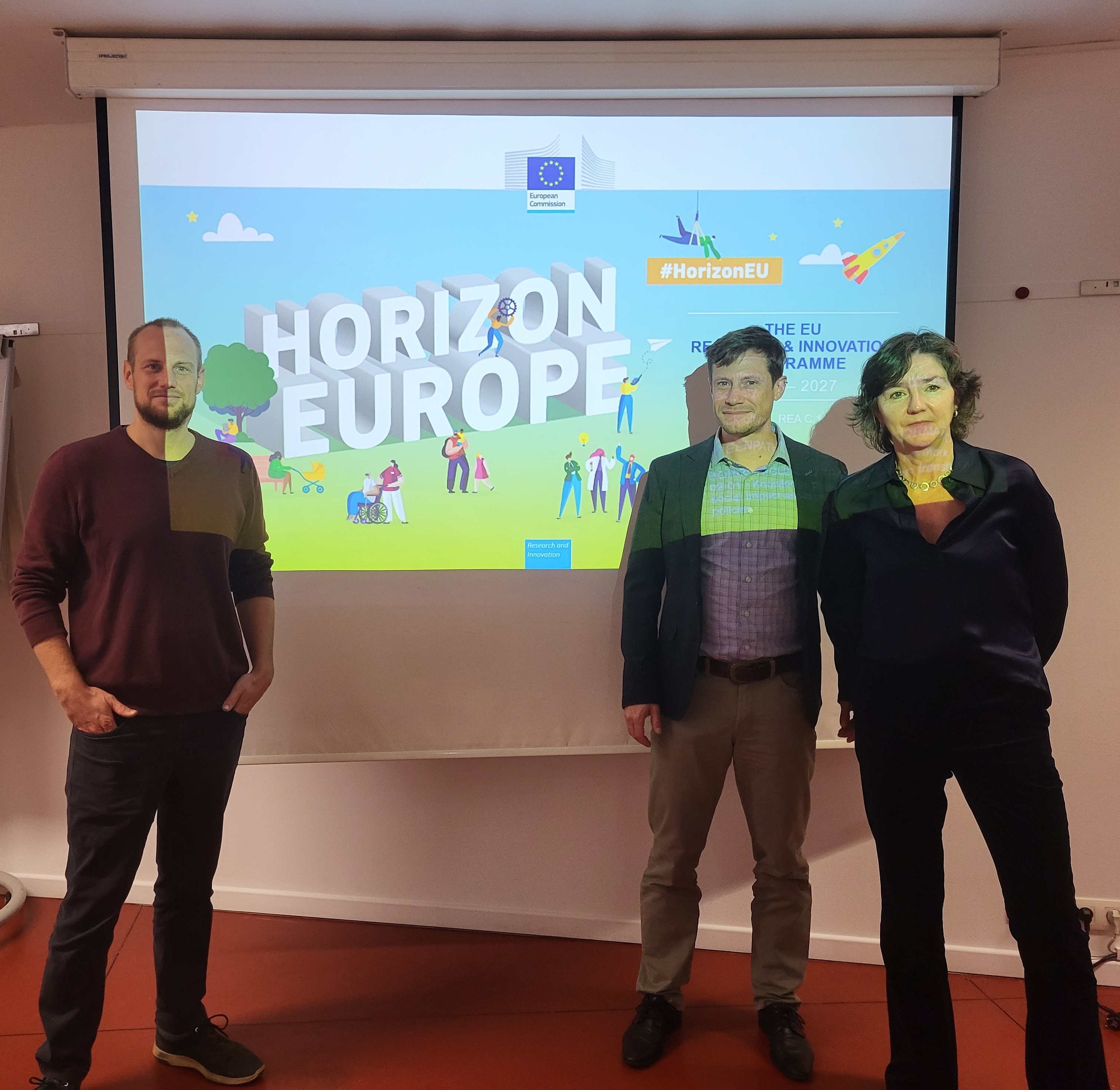
September 2023: EAAE Reserach Discovery Award
Prof. Thomas Kopp and his colleague, Prof. Richard Sexton (University of California, Davis), received the European Association of Agricultural Economists' (EAAE) Research Discovery Award for the Paper FARMERS, TRADERS, AND PROCESSORS: BUYER MARKET POWER AND DOUBLE MARGINALIZATION IN INDONESIA. The paper appeared in the American Journal for Agricultural Economics in 2022.
The award was handed over during the EAAE's triennial conference at Rennes, France, in September 2023.
Although market conditions in developing countries are often conducive to the exercise of buyer market power by intermediaries such as traders and processors, few empirical estimates of the magnitude of buyer power are available. Kopp and Sexton develop a model of buyer power exercised at successive stages of the supply chain, a condition known in the literature as “double marginalization.” They show that traders may exercise buyer power over rubber producers and, in turn, rubber processors in Indonesia may exercise buyer power over the traders. The authors estimate the magnitude of this market power and its impacts on farm prices and economic welfare.
Read the full paper here.
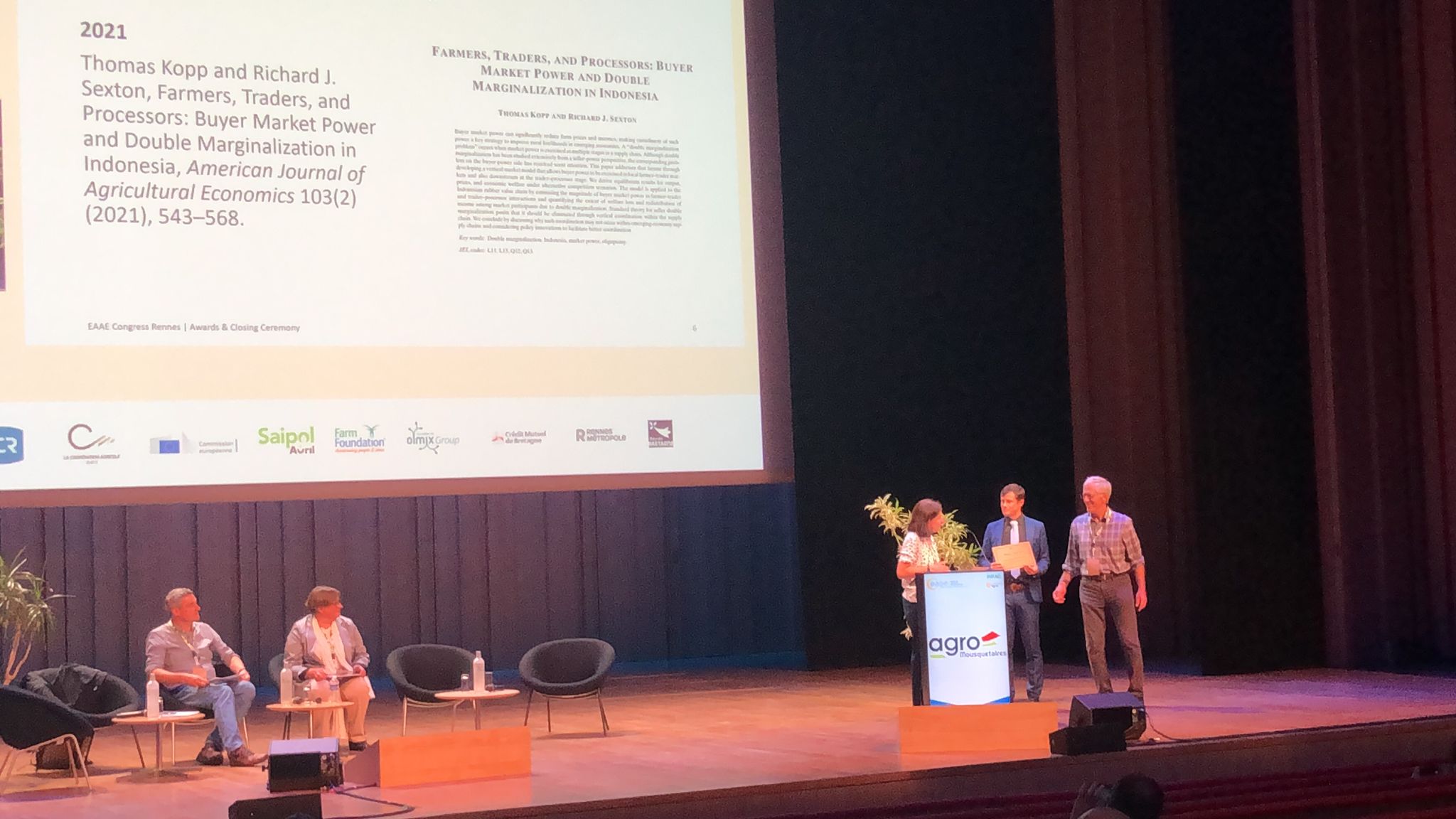
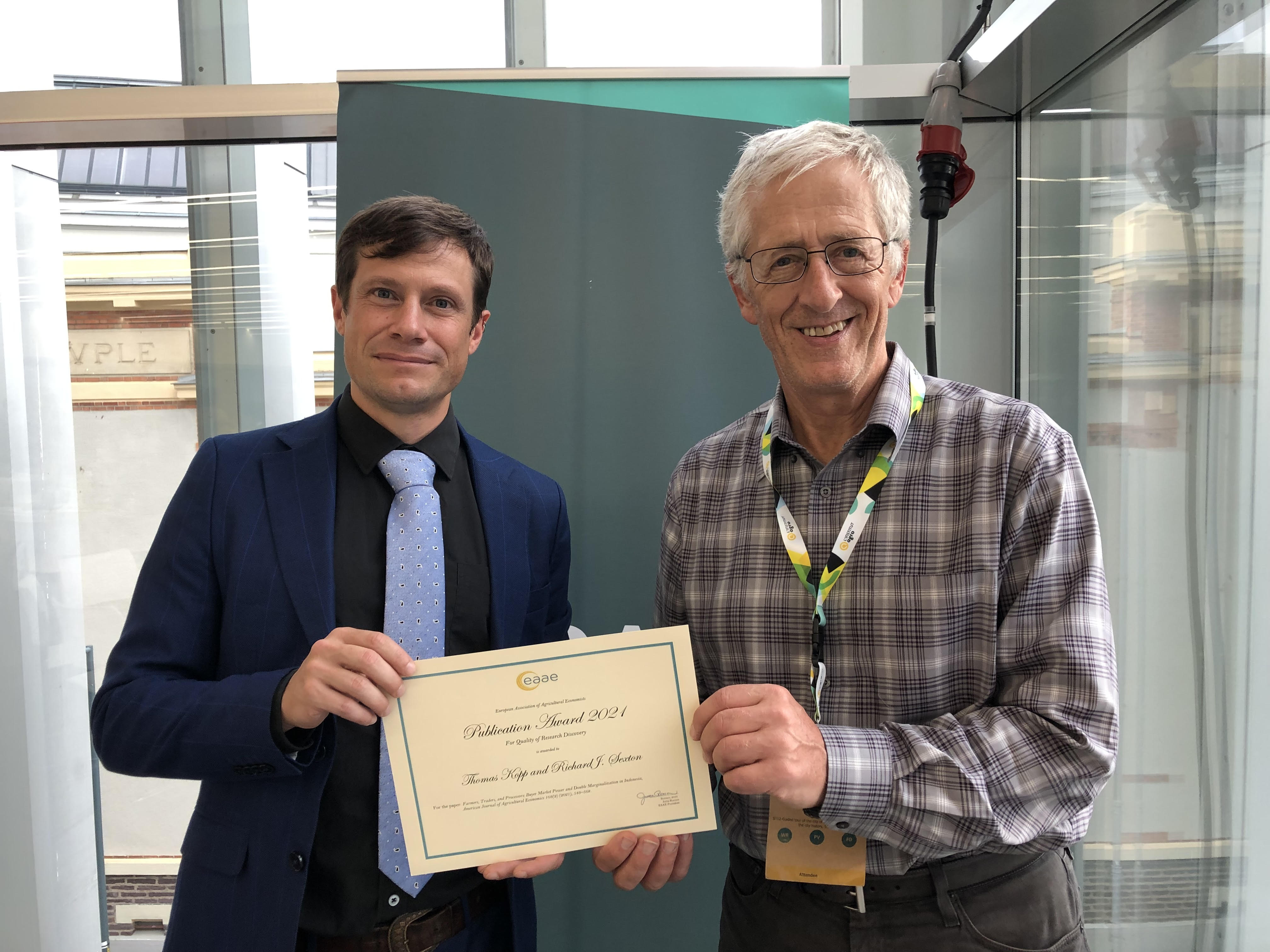
August 2023: International Day for the Good Life for All
As part of the chair´s school partnership project, we organized an “International Day for the Good Life for All” with our partners in Tanzania, Germany, Croatia and Slovakia. The event took place on August 31st and included various activities such as the application of the learning game, a debate competition and an international online exchange for participants in all partner countries. The event ended with a Q&A session with two experts Jelena Puđak and Ajda Pistotnik from the International Degrowth Conference, taking place at the same time in Zagreb.
August 2023: Learning Games "Good Life for All" available
As part of the Chair's school partnership project, we developed learning games on the social-ecological challenges of the SDGs and the Good Life for All, which are now available. Project partners from Germany, Croatia, Slovenia and Tanzania participated in the development of the games. The educational games are designed for students aged 14 and above and young adults.
More information is available at the-good-life-for-all.info
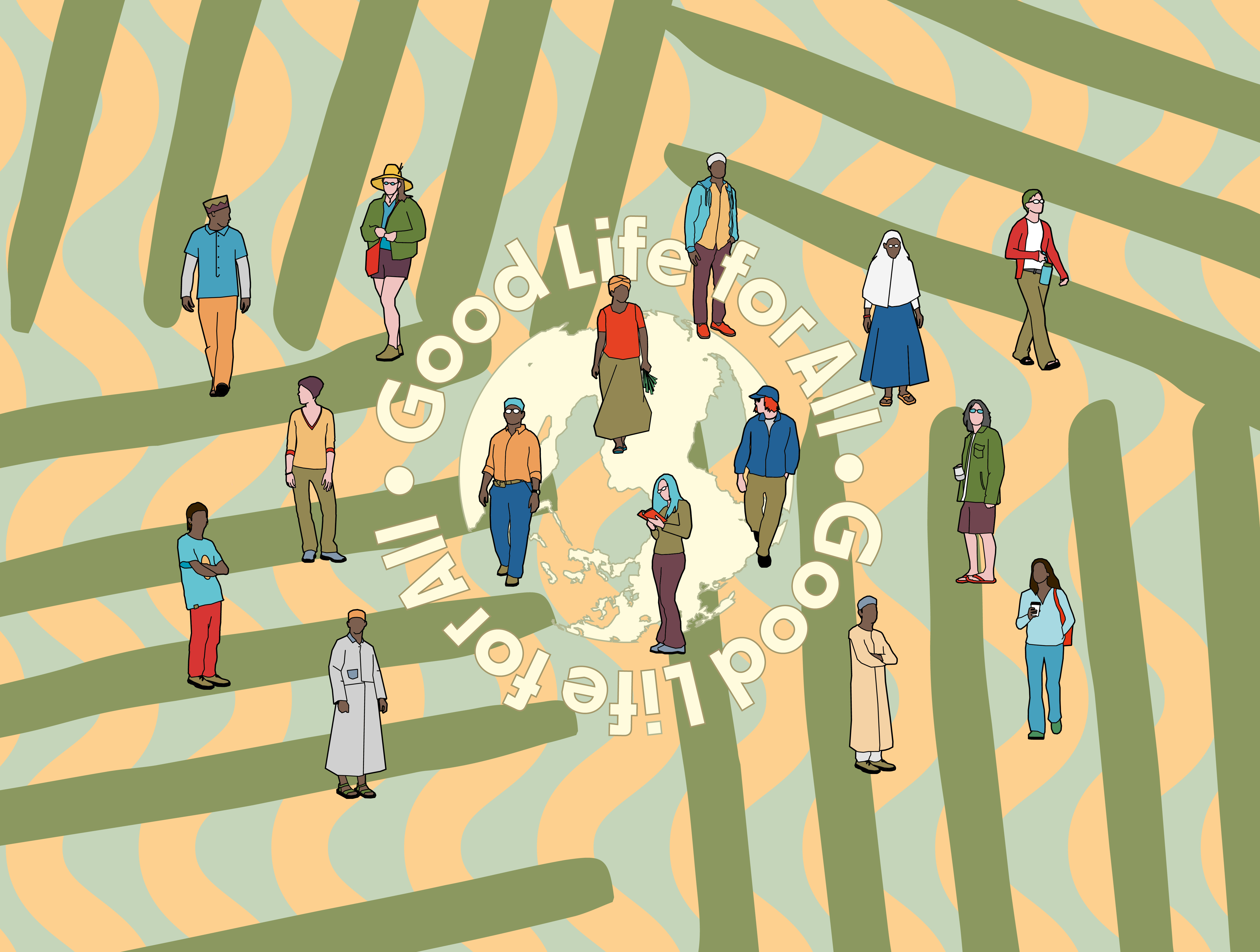
July 2023
Thomas Kopp gave two presentations the annual meeting of the Association of Agricultural and Applied Economics in Washington DC, USA. The first paper is entitled "The Effects of Inequality on the Triple Burden of Malnutrition – are there Synergies or Trade-offs?", co-authored with Markus Nabernegg, also from Siegen University. The second paper's title is "Government-Supported Marketing Channels Increase Incomes only for Producers of Local Staples: Evidence from Fruit and Vegetables Farmers in India", co-authored by Alexis Villacis and Ashok Mishra, both from Arizona State University.
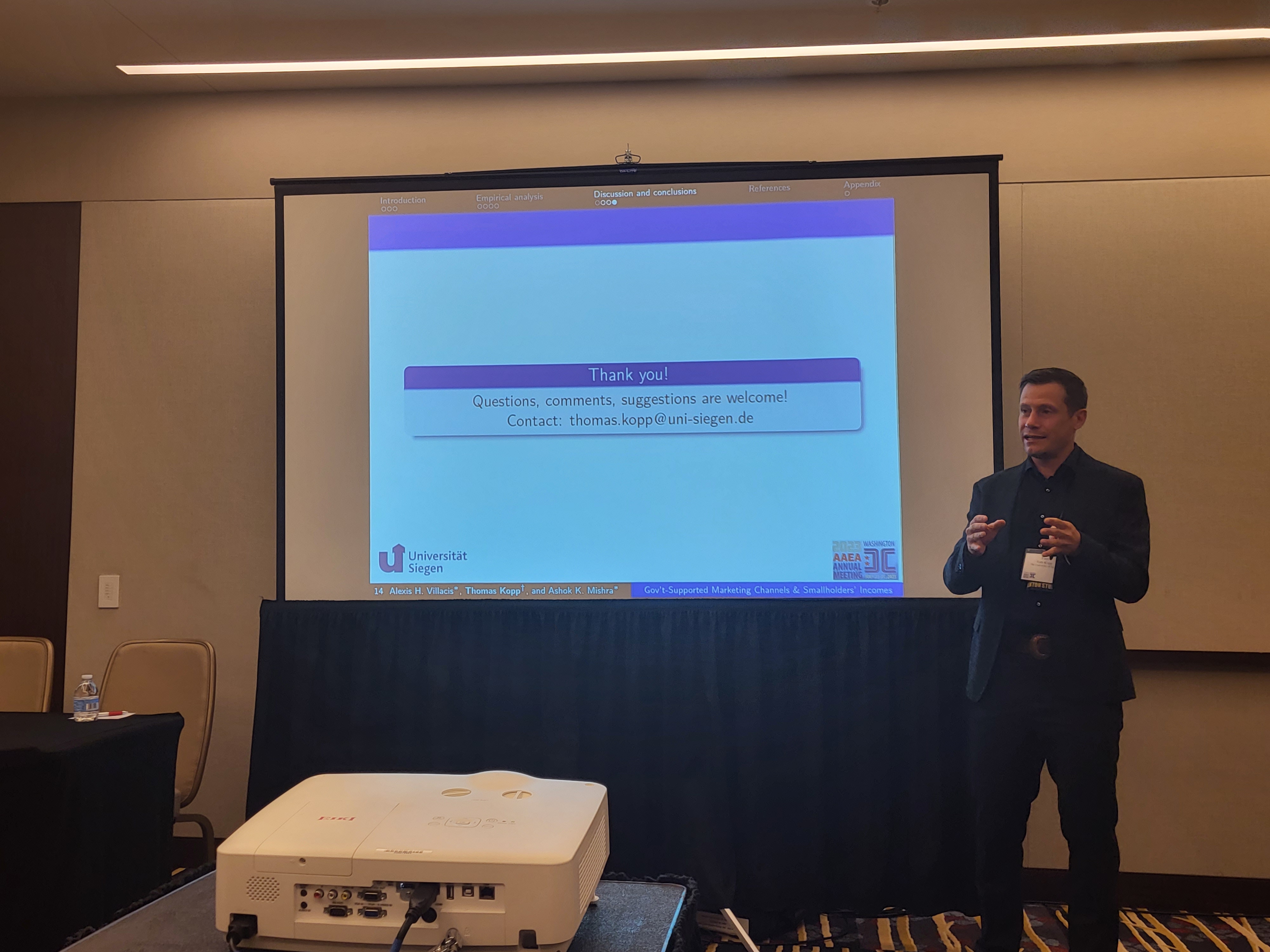
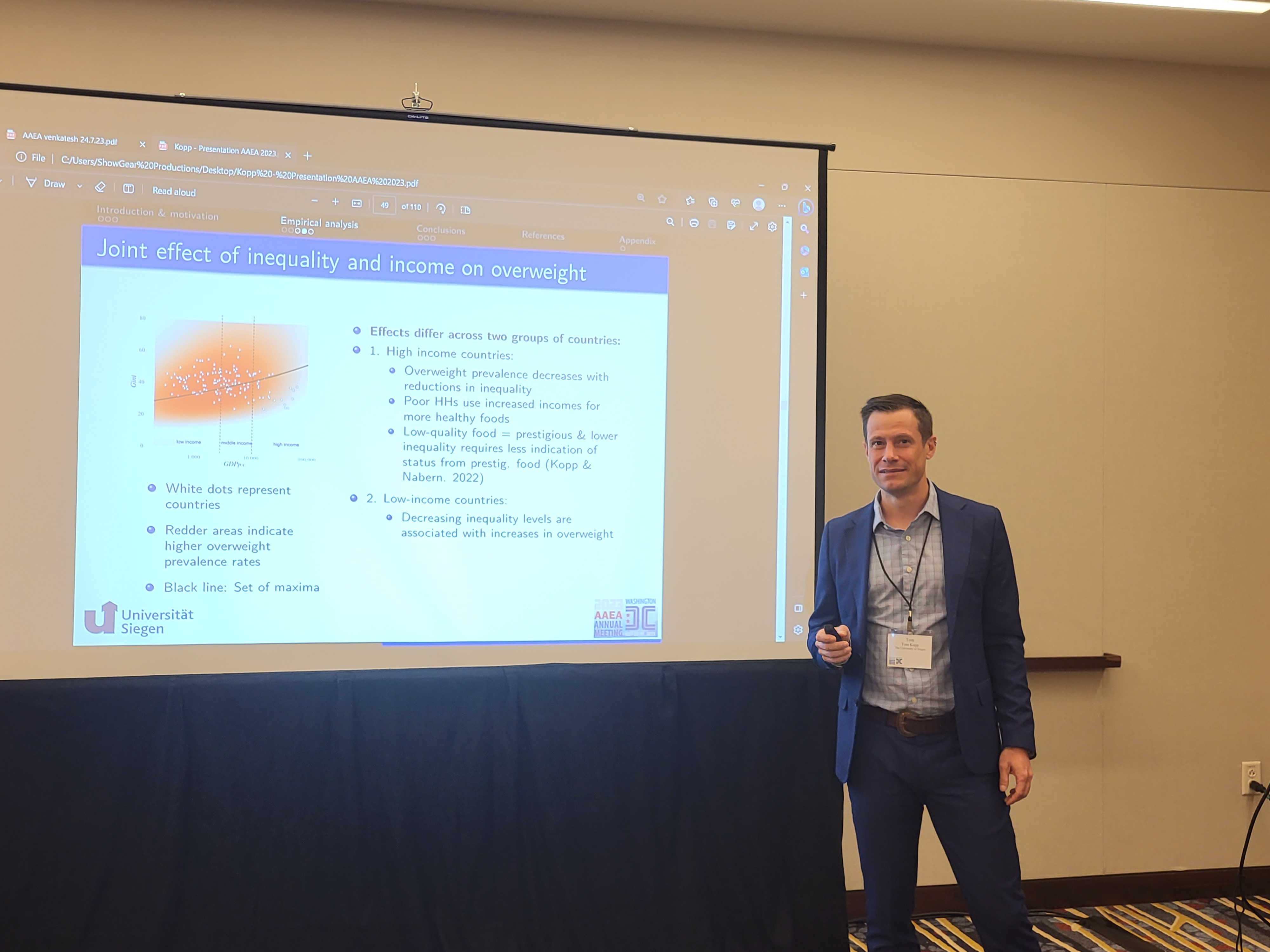
July 2023: PhD position in Siegen
The University of Siegen (Chair Prof. Kopp) is currently looking to fill a position of a PhD researcher (50% position over three years).
The person to be hired should be interested in analyses in the area of development or environmental economics and/or be interested in questions on income distribution.
The advertisement can be found under the following links:
Deutsch: https://jobs.uni-siegen.de/job/Wissenschaftlicher-Mitarbeiterin-Entwicklungs-oder-Umwelt%C3%B6konomik-57072/956654901/
English: https://jobs.uni-siegen.de/job/Researcher-Development-Economics-or-Environmental-Economics-57072/956655001/
The application deadline is on August 09, 2023.
Regular presence in Siegen is desired but not permanently required.
If you are in the final phase of your masters' program, please indicate from when on you will be approximately available (there is some flexibility regarding the start date of the position).
June 2023
Prof. Kopp attended the annual conference "IAMO Forum" in Halle/Saale to present the joint research with PhD student Markus Nabernegg. This study addresses the relation between income inequality and the consumption of animal protein produced on grazing land. The findings indicate that in low- and many middle- income countries, decreasing levels of inequality were in the past accompanied by decreasing consumption of animal protein. This can be problematic in contexts in which people are suffering from a lack of calories and micronutrients. In high-income countries, on the other hand, decreasing levels of inequality are associated with increasing levels of animal protein consumption - which is problematic both for environmental and nutritional outcomes, given high prevalence of overweight in those context. The session concluded with an interesting discussion on possible policy implications and further dimensions of upcoming research questions.
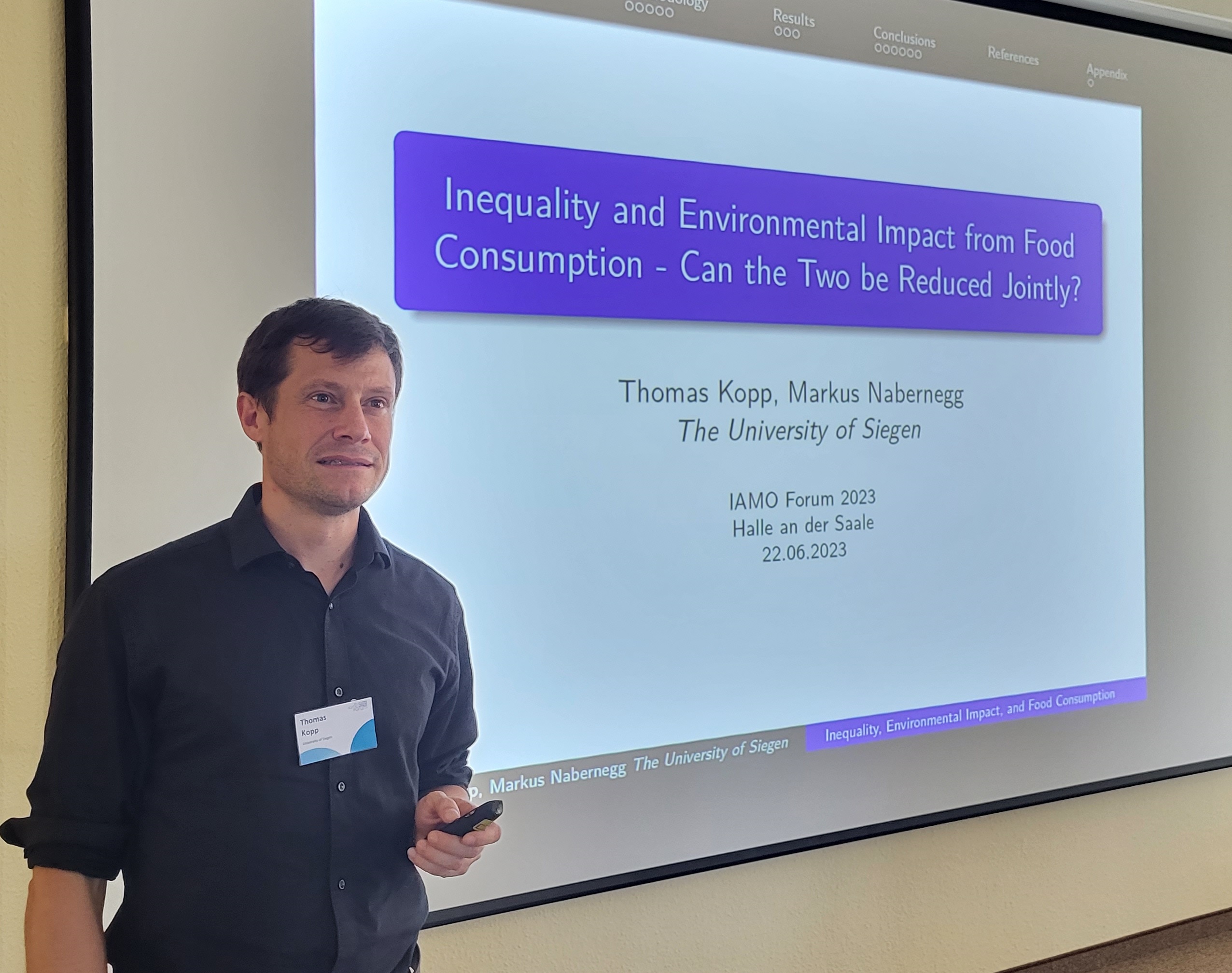
June 2023: New Discussion Paper
The article can be found under the following link .
Abstract
This paper develops a method to account for the emissions embodied in consumption for the upper tail of the income distribution, which is systematically underrepresented in household surveys. This method is first accounts for the income of the missing rich by integrating tax microdata to the structure of the income and expenditure survey. In a second step, consumption for these introduced rich households is predicted with income and demographic characteristics. Finally, emissions are mapped to the consumption of households with environmental input-output tables. The application to Ecuador, which is a good example for the underrepresentation of high income households in surveys. Results indicate that Environmentel Engel Curves that account for those households question the prevalence of a concave income-emission relationship. Further, the integration method increases income inequality measures sharply, but suggests a lower income-emission elasticity than the one stemming from uncorrected surveys.
June 2023: We are hiring!
Der Lehrstuhl für Wirtschaftswissenschaften und ihre Didaktik sucht zum nächstmöglichen Zeitpunkt eine studentische Hilfskraft zur Unterstützung des Projekts LATERNE.
Im Projekt "LATERNE" untersucht die Universität Siegen gemeinsam mit den Universitäten Münster und Osnabrück, wie sich Hochschulen zu mehr ökologischer und sozialer Nachhaltigkeit hin transformieren lassen.
Weitere Informationen zum Projekt finden sich hier.
Hier geht es zur Ausschreibung.
June 2023: Speech by Prof. Thomas Kopp at Graduation Ceremony
Prof. Kopp gave the commemorative speech at this year's graduation ceremony of the University of Siegen's School of Economic Disciplines. The speech gave insights in his empirical research on market power in agricultural value chains in the Global South, including insights from own field work. Both Prof. Kopp, as well as the introductory speech by the School's dean, Prof. Marc Hassenzahl, provided motivation to graduates to seek a career in science and research.
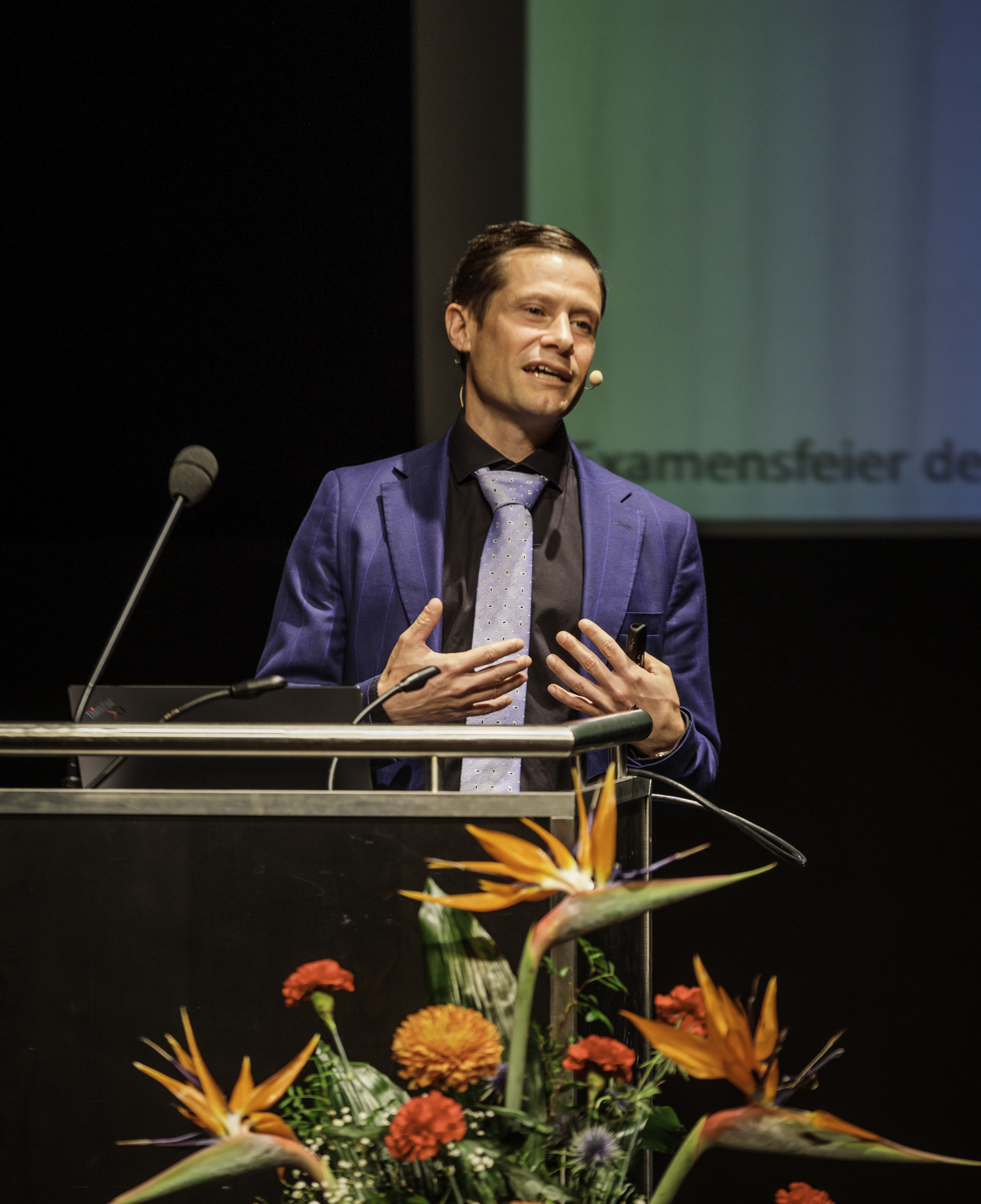
June 2023: LANTERN Porjetc kick-off symposium of funding line
The kick-off symposium of the funding line "Sustainability in Science", run by the Federal Ministry for Education and Research, took place in Berlin from July 05.-07., 2023. Our project "LANTERN" is one of the ten projects from all over Germany that were selected for funding and received a chance to present themselves. Three intensive days full of networking, planning, and co-creation .
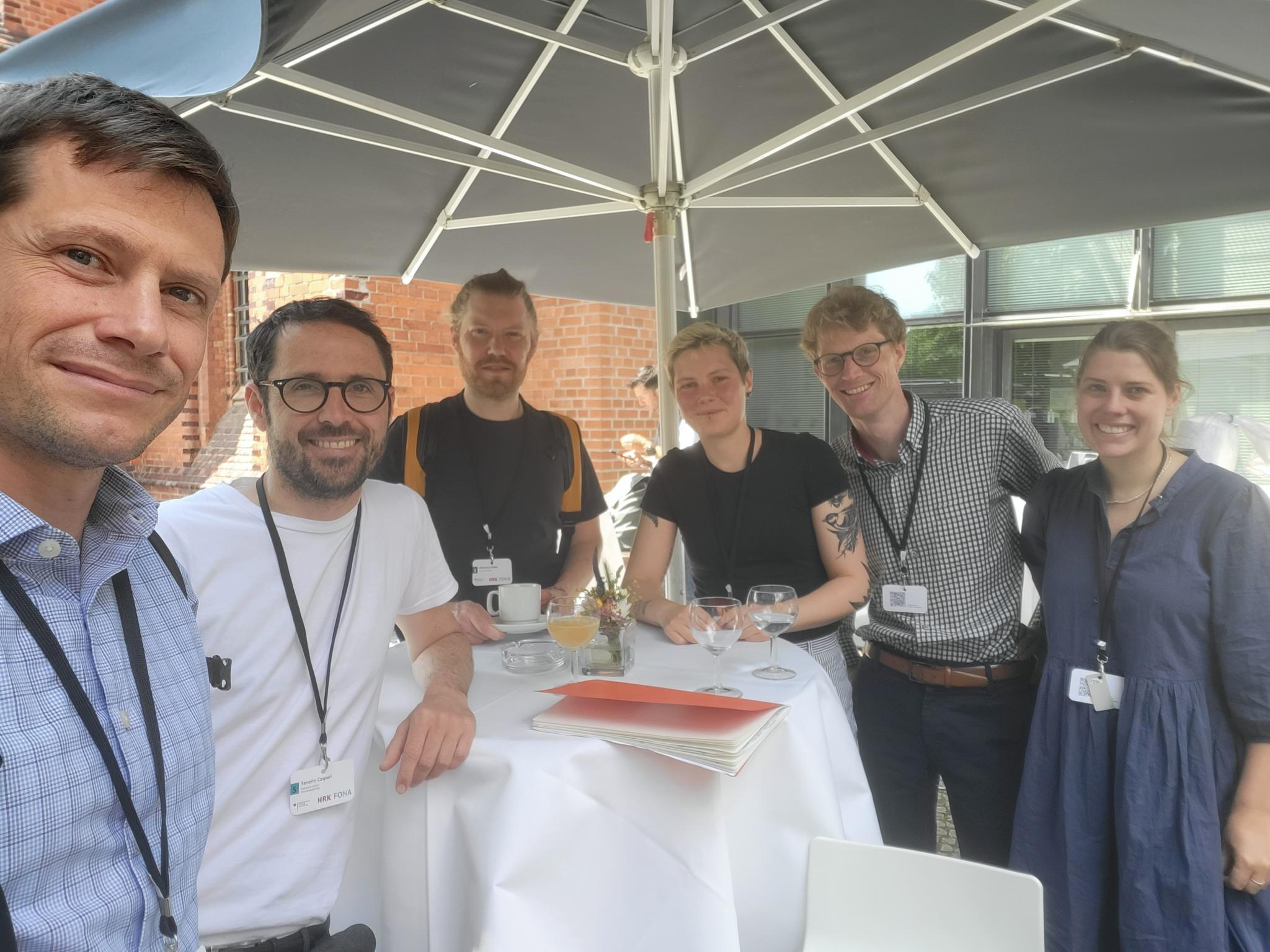
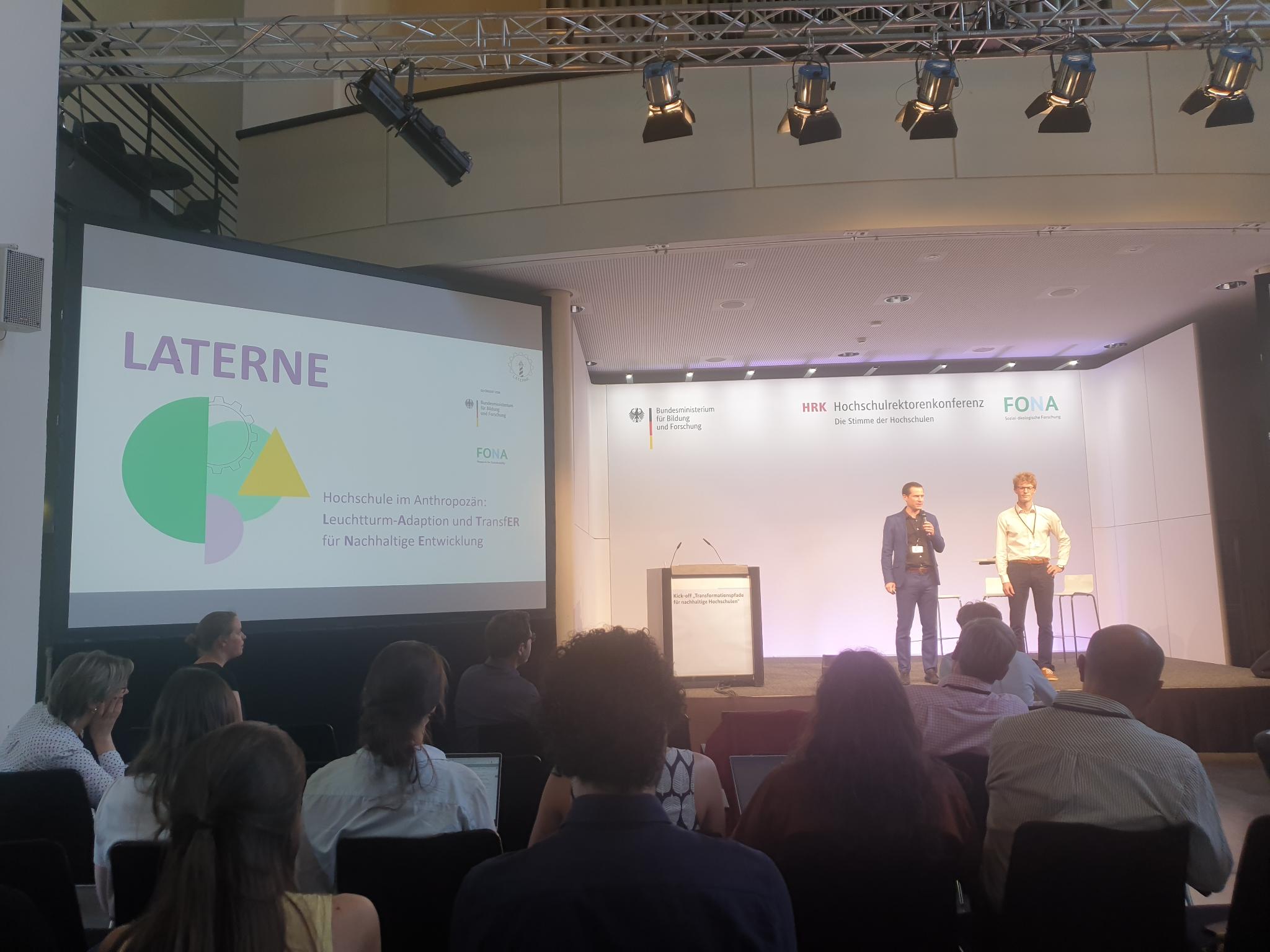
May 2023: Visit of project school in Zanzibar and research on seaweed value chain
Prof. Kopp visited our project partners at Haile Selassie School on Unguja Island in Tanzania's Zanzibar Archipelago to hand over the learning games developed in the project "International School Partnership". The games were also demonstrated at five other schools, as well as to the Ministry of Education.The visit further allowed for sharpening research questions on the seaweed value chain, an important contributor to household incomes in rural Zanzibar.
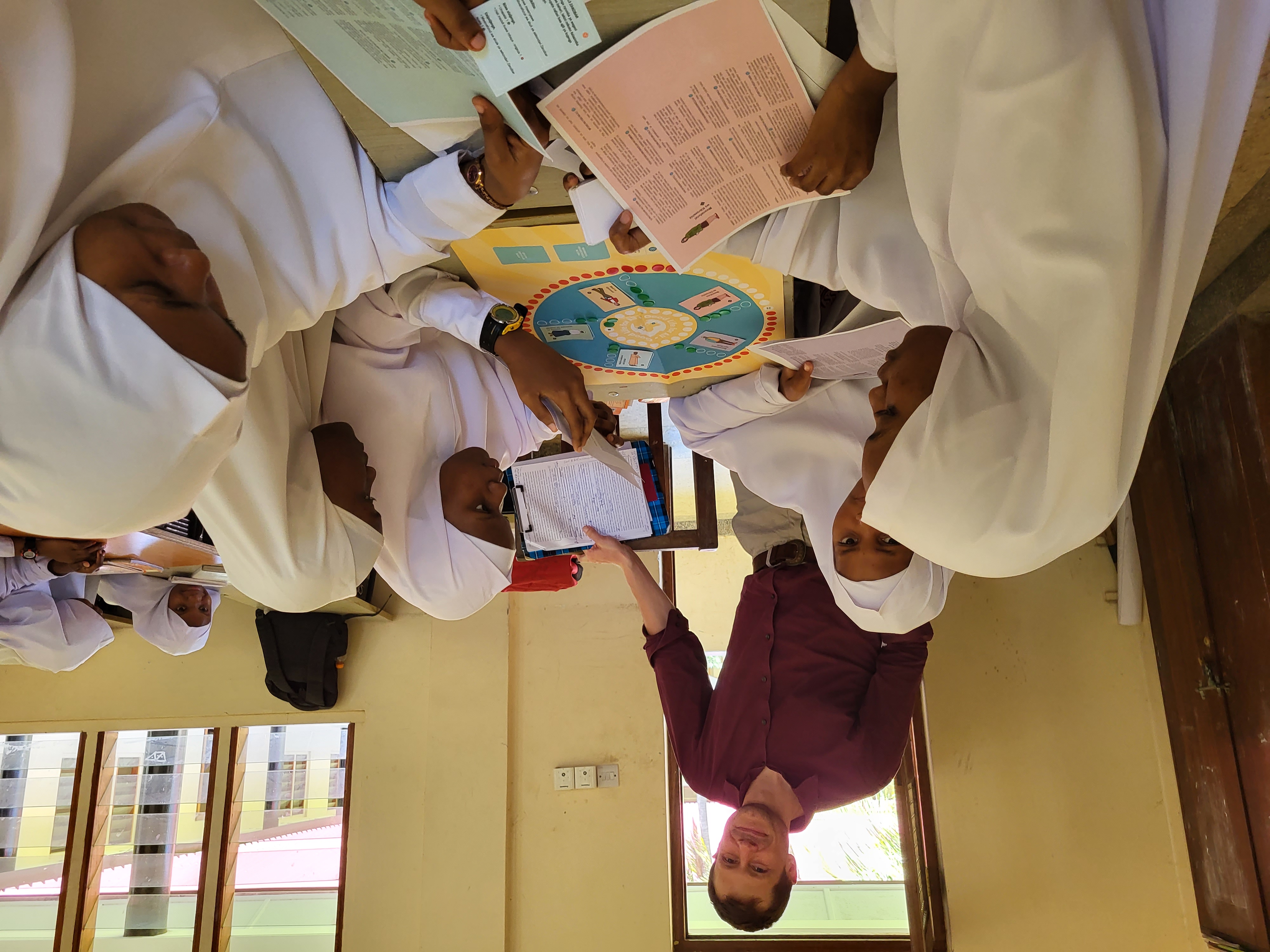
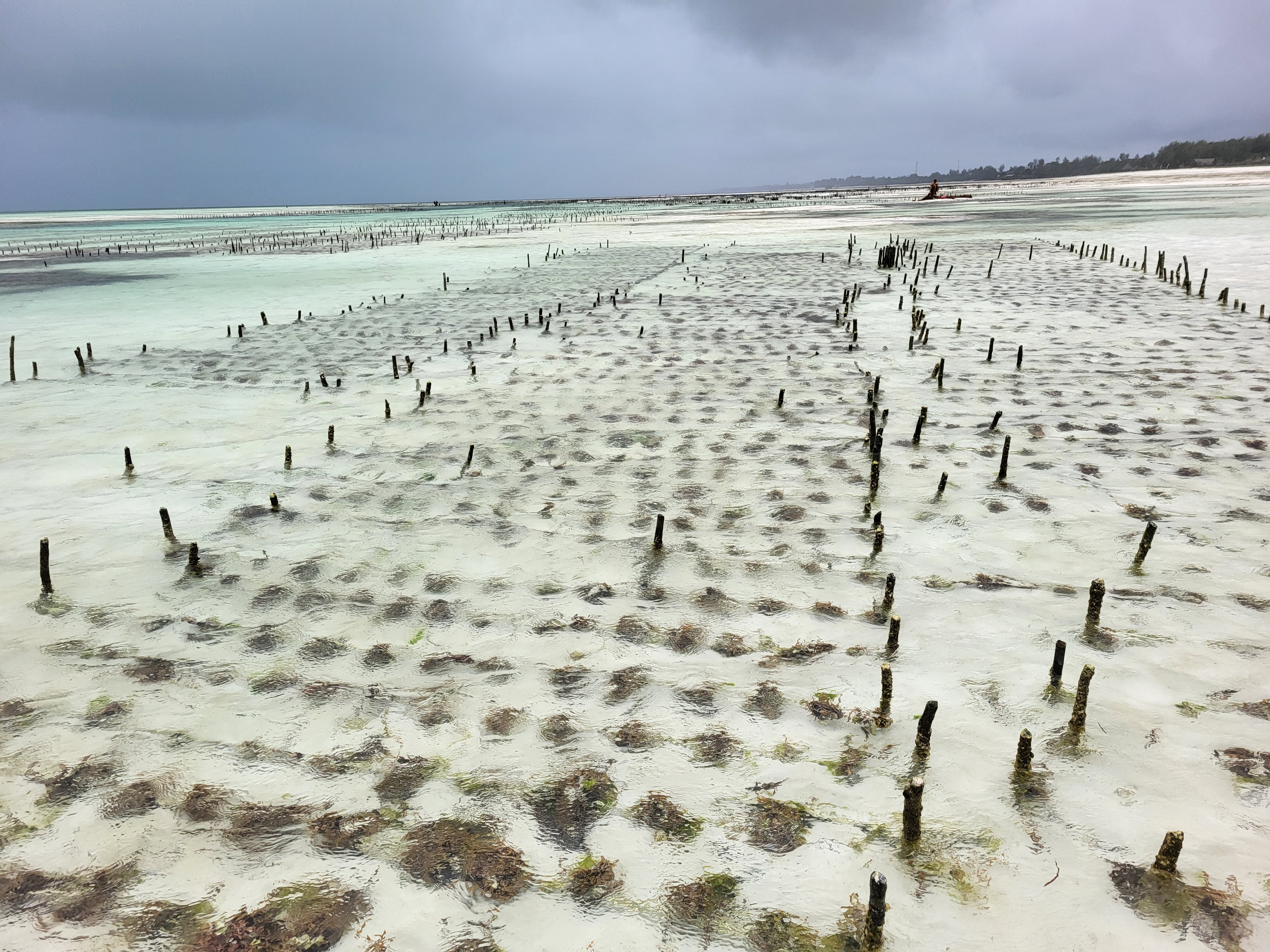
April 2023: Visit of chair members to INRAE in Paris
PhD student Markus Nabernegg and Prof. Kopp visited the French National Research Institute for Agriculture, Nutrition, and Environment (INRAE) in Paris, France. On the first day, Mr. Nabernegg presented his work on inter-household emission inequality within the institute's research seminar, followed by a lively discussion. Other highlights of the visit included bi- and trilateral meetings with local PhD researchers to discuss their projects and a tour of the research campus. The remainder of the time was used for the planning of current and future collaborative projects.

.jpg)
March 2023: KAUZ Multiplier event at the University of Vienna
On Friday, March 17th, a one-day networking event on political education took place at the University of Vienna. The event aimed to bring together practitioners from the field of political education and provide a collegial space for learning and exchange, as well as to discuss the potential of different approaches to critical, non-formal education. Over 50 people from various organizations connected and exchanged ideas on approaches and methodologies. During the lunch break, participants enjoyed Indian food together, and in the evening, they were treated to a fantastic performance of "Who cares?" by the Theater of the Oppressed Vienna.
The event was organized by KAUZ, a lab for climate justice that develops educational materials for socio-ecological transformation. KAUZ targets adult educators who can use the materials directly in their contexts. The KAUZ activities and materials include:
· Workshop concepts that are available to multipliers in German, English, Croatian, and Italian
· The KauzPod podcast, which is available in multiple languages, featuring good practice examples and expert interviews related to their topics
· Explanatory videos
· Microlearnings that provide brief learning opportunities and can be shared via social media
KAUZ has four partner organizations in Germany (the University of Siegen and Common Future eV), Austria (Kollektiv Periskop), Italy (Free University Bolzano), and Croatia (Skola Dante). KAUZ is funded by the European Union's Erasmus+ program in a three-year project (September 2020 – August 2023).
Learn more about KAUZ on the project's website: www.kauz-project.org
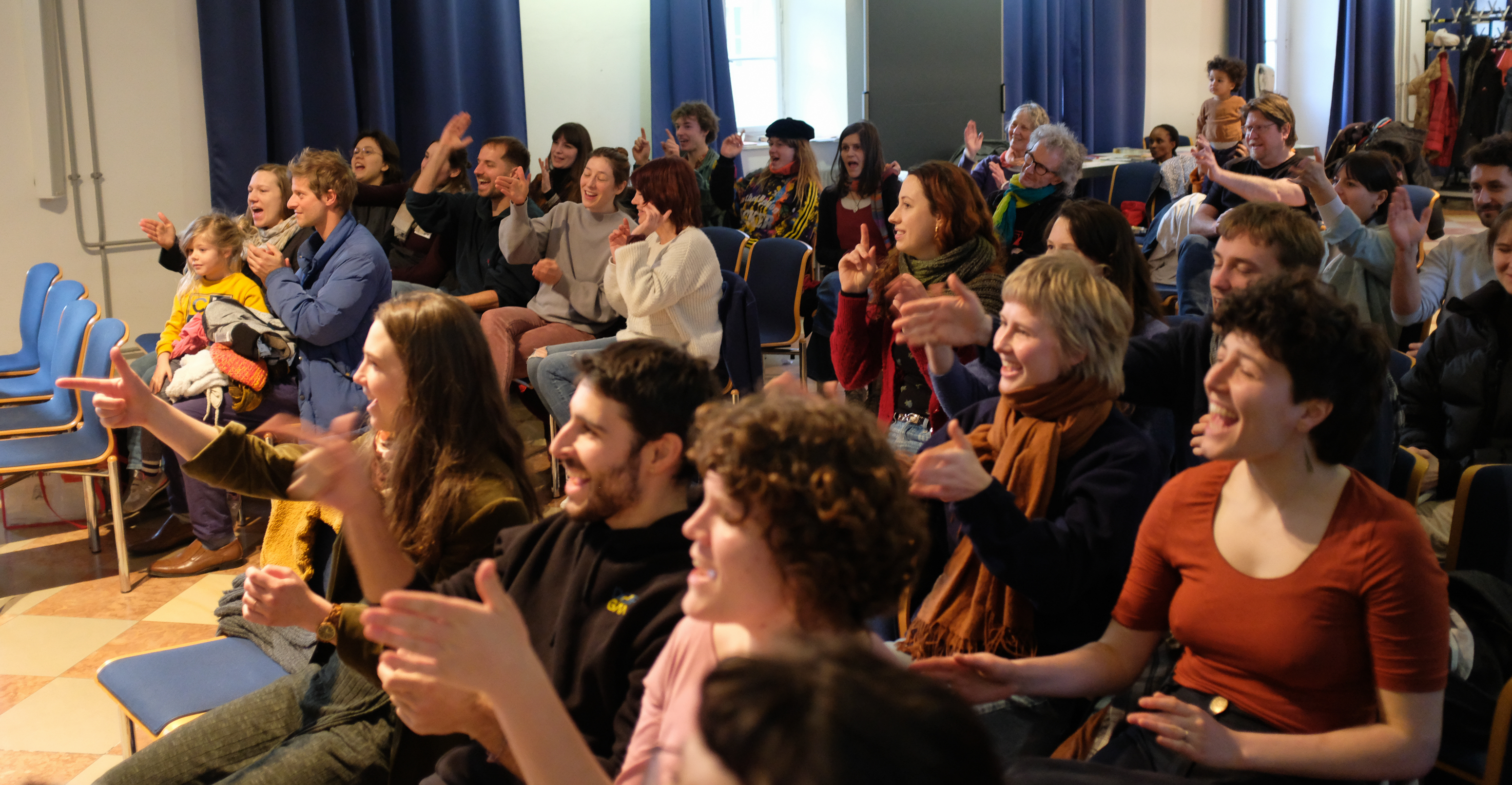
January 2023: EU Funding received for GREEN-PATHS project
Prof. Dr. Thomas Kopp has recently received funding for a new project titled “GREEN-PATHS: European Knowledge Hub on Just Transition Pathways” within the European Union's Horizon funding framework. The project is scheduled to begin in mid 2023.
Abstract
GREEN-PATHS addresses the complex and multi-dimensional nature of the planned, ecological transition. Based on an enhanced understanding of key issues and challenges influencing the transitions and an in-depth review and synthesis of the latest and most relevant research, GREEN-PATHS will enable the development and adoption of coherent and effective policy strategies and instruments, furthering the positive outcomes and reducing the negative impacts on environmental sustainability and social well-being. To improve the design, governance and implementation of transition strategies, GREEN-PATHS pays particular attention to the European Green Deal, the Fit for 55 package, and the actions funded by the Just Transition Fund and the European Social Fund+.
December 2022: Team meeting
The Chair of Jun.-Professorship Economics and Didactics had a team meeting on 1st and 2nd December. Members presented their current research projects and enjoyed a city tour together.
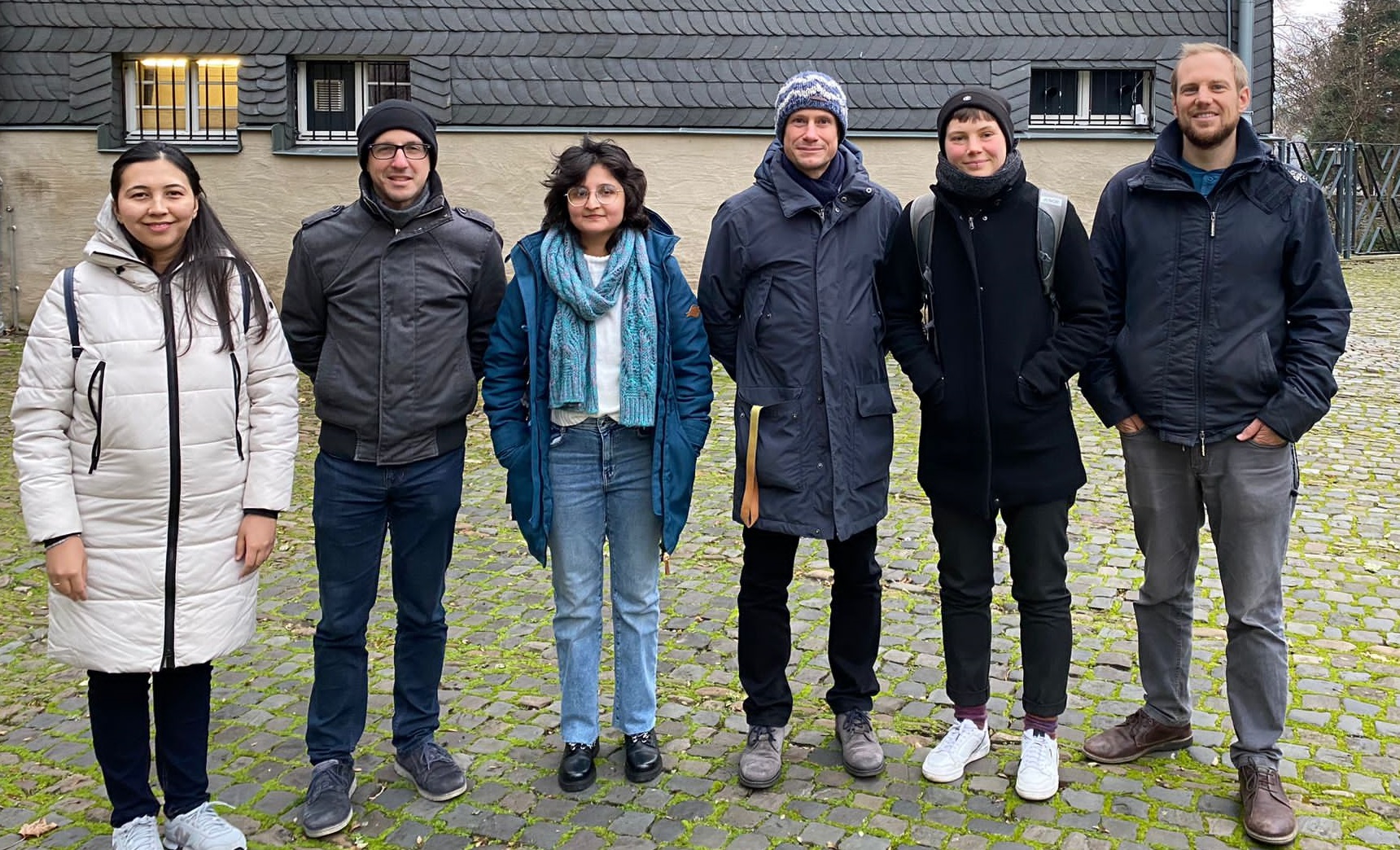
November 2022: New LANTERN Project
-
In the new project "University within the Anthropocene: Lighthouse-Adaption and Transfer for Sustainable Development (LANTERN)", the universities of Münster, Osnabrück, and Siegen have joined forces to identify the success factors of projects for sustainability transformation and the transfer of these factors. With the help of the Whole Institution Approach, new knowledge about the role of flagship projects will be generated. Based on the knowledge gained, sustainability workshops will then be held at all three locations with the aim of initiating new flagships projects. In this way LANTERN aims to establish the concerns for sustainability and global justice within universities.
October 2022: Award
Jun.-Prof. Dr. Thomas Kopp was selected as the winner of this year's Dr. Lange Science Award, awarded by the Association for the Promotion of the Scool of Economic Disciplines at the University of Siegen e.V.
The prize was awarded to recognize the scientific quality of the publication:
Kopp, Thomas and Sexton, Richard J. 2021: Farmers, Traders, and Processors: Buyer Market Power and Double Marginalization in Indonesia. American Journal of Agricultural Economics, 103(2): pp. 543-568.
The ceremony took place on 27.10.2022.
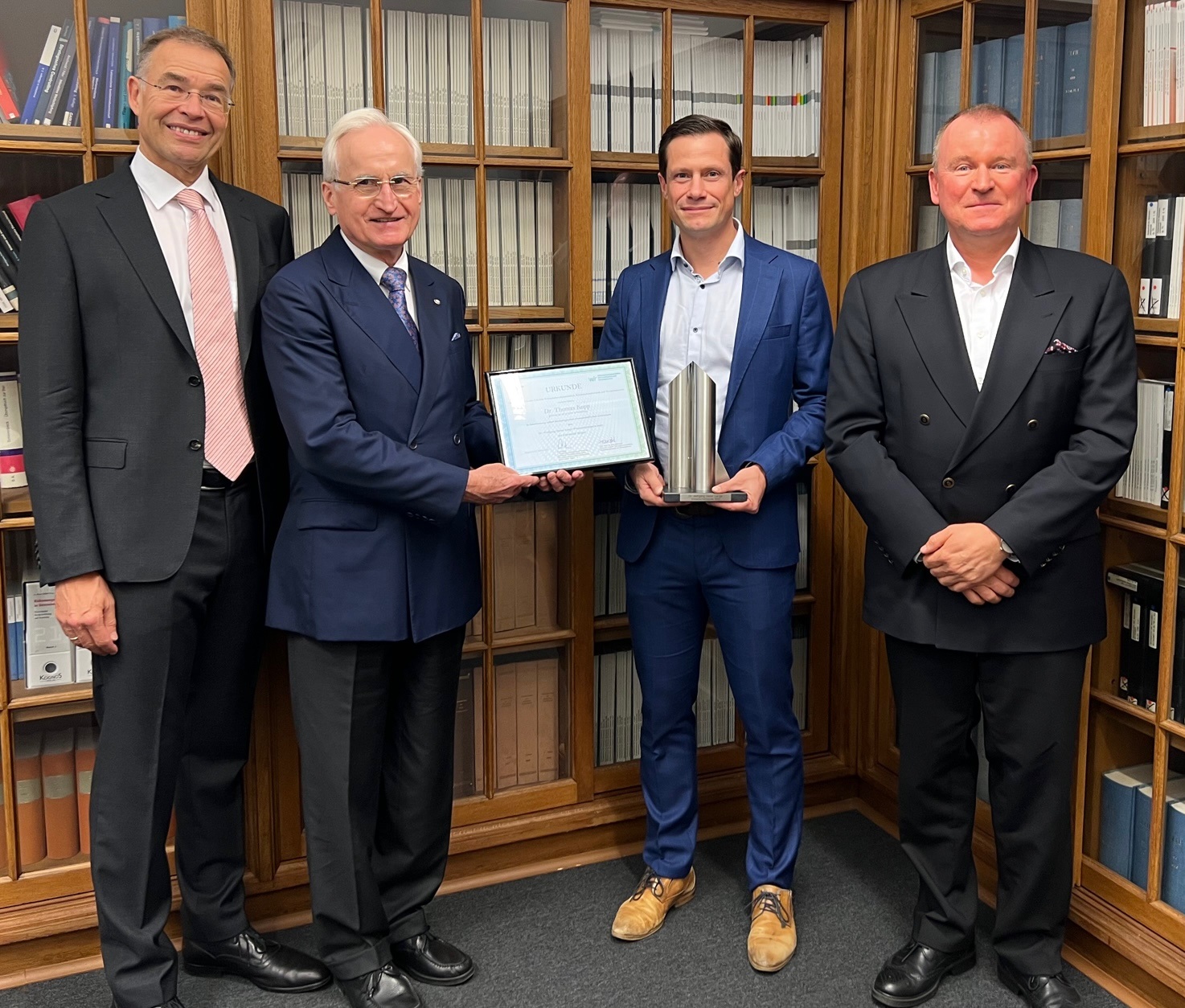
October 2022: New discussion paper
Kopp, T. (2022): "Welfare and Distributional Consequences from Market Power in Markets for Digital Services and Interlinked Food Retail Markets: A Conceptual Note".
The article can be found under the following link .
Abstract
Retailers of food and other consumption goods use households’ private data to exercise market power through personalised advertisement and price discrimination. These data are obtained in interlinked markets for digital services, such as social media platforms and search engines. Consumers incur no financial costs when using digital services but are required to reveal private information to use them. Those markets for digital services are characterised by market power, based on network effects and spiral effects, that can result in natural monopolies. Digital service providers can exploit this market power to extract more private information from their users than in a competitive setting. This increased amount of revealed private information then may result in financial disadvantages for households in the interlinked markets for food and other consumption goods.
Little conceptual or empirical work has been done so far to quantify the effects of this subtle yet drastic reshaping of many markets. No micro-economic model to date conceptualises the direct exchange of private information for digital services, and empirical work quantifying the welfare effects of market power exercised in digital service markets remains rare. This conceptional note lies the foundations for quantifying the welfare and distributional consequences of market power in food retail and interlinked markets for digital services.
While the literature provides some evidence on digital service providers’ market power and on market power exercised in agricultural value chains based on data, no work has been carried out combining the two spheres. Therefore, the objective of this note is to develop a micro-economic model to allow for suitable representation of key characteristics of the market environment and capture the dynamics of food retailers’ market power based on private household information.
October 2022: New publication
Prof. Dr. Thomas Kopp and PhD candidate, Markus Nabernegg, have recently published a research paper on the topic of "Inequality and Environmental Impact – Can the Two Be Reduced Jointly?" The article can be found under the following link .
Abstract
Deterioration of the natural environment and economic inequality are profound concerns in many societies. To avoid adverse environmental side effects when implementing policies to reduce inequality, an understanding of potential conflicts of objectives is required.
Different theoretical considerations suggest reducing effects of inequality on environmental impact, but also increasing ones. This paper provides empirical evidence on the environmental impact of inequality through a panel data set of 116 countries over 55 years. The multidimensionality of environmental impact is accounted for by relying on the six subindices of the Ecological Footprint.
Results are discussed based on an innovative, graphical approach that allows for the assessment of effects of inequality on environmental impact based on a country's initial location within the entire observed inequality and income range. They suggest that reducing inequality levels increases carbon footprints. For surface sealing and the use of forest land, a conflict of objectives exists only in relatively rich and egalitarian countries, while there is room for jointly reducing environmental impacts and inequality in relatively poor and initially unequal countries. All results are highly robust to the estimation procedure.
We conclude that, especially in richer countries, policy measures to reduce inequality need to be accompanied by policies that limit harmful environmental impacts of income redistribution in order to reduce inequality and environmental impact jointly.
July 2022: We are hiring!
PhD Researcher needed for Project LANTERN
The Project "University in the Anthropocene: Lighthouse Adaptation and TransfER for Sustainable Development" (LANTERN) targets to identify success criteria for transformational projects at universities and develop and implement new initiatives based on them. Collaborating with the universities of Osnabrück and Münster, the project will start in November.
As part of this project, the position of a PhD researcher will be filled on November 1st, 2022.
The job holder will deal with the identification of determinants of successful projects that contribute to a socio-ecological transformation in the sphere of influence of universities.
Further information on the call for applications and application documents and procedures can be found here: https://jobs.uni-siegen.de/job/Wissenständiger-Employee-Project-LATERNE-57072/830769901. The application period ends on August 16, 2022. The place of work is Siegen.
July 2022: We are hiring!
PhD Researcher needed for Project LANTERN
The Project "University in the Anthropocene: Lighthouse Adaptation and TransfER for Sustainable Development" (LANTERN) targets to identify success criteria for transformational projects at universities and develop and implement new initiatives based on them. Collaborating with the universities of Osnabrück and Münster, the project will start in November.
As part of this project, the position of a PhD researcher will be filled on November 1st, 2022.
The job holder will deal with the identification of determinants of successful projects that contribute to a socio-ecological transformation in the sphere of influence of universities.
Further information on the call for applications and application documents and procedures can be found here: https://jobs.uni-siegen.de/job/Wissenständiger-Employee-Project-LATERNE-57072/830769901. The application period ends on August 16, 2022. The place of work is Siegen.
July, 2022: We are hiring!
Student assistant needed for Project LANTERN
The Project "University in the Anthropocene: Lighthouse Adaptation and TransfER for Sustainable Development" (LANTERN) targets to identify success criteria for transformational projects at universities and develop and implement new initiatives based on them. Collaborating with the universities of Osnabrück and Münster, the project will start in November.
As part of this project, the position of a student assistant will be filled on November 1st, 2022 (13.5 hours per week). The position is limited to one year, with the possibility to extend to three years.
The student assistant will support the project with coordinating of deadlines and meetings, literature search, homepage supervision, and general support activities.
Further information on the call for applications and application documents and procedures can be found here:
The application period ends on August 25, 2022. The place of work is preferably in Siegen.
June, 2022: Visit of project partner in Siegen
From June 9th to June 29th the coordinator from the Zanzibari Haile Selassie School, Saleh Suleiman Ali, visited Germany as part of the project "Participatory Development of Learning Materials". He joined the UNESCO head teacher conference in Berlin, visited the German project school in Berlin and met with Jun.-Prof. Dr. Thomas Kopp and project coordinator Claudius Engeling at University of Siegen to discuss the upcoming project activities.
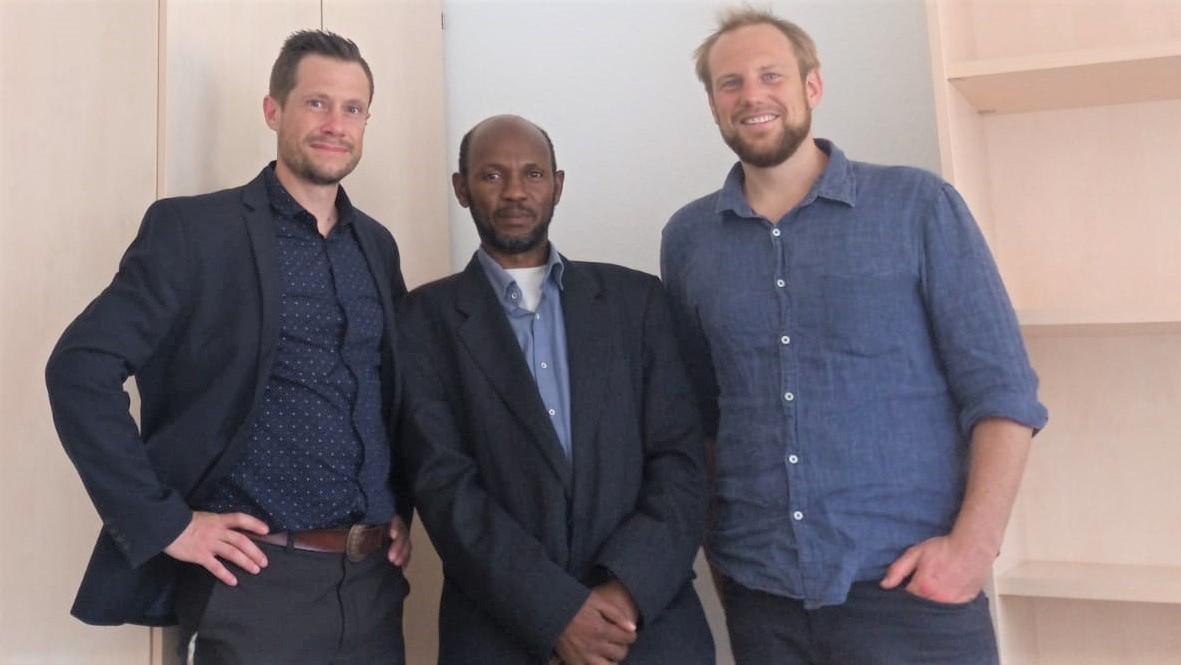
January, 2022: New publication
Prof. Dr. Thomas Kopp has recently published a research paper on the topic of "When switching costs cause market power: Rubber processing in Indonesia". The article can be found under the following link.
Abstract
Suppliers of agricultural output incur switching costs (SCs) when choosing new buyers, allowing buyers to exercise oligopsonistic market power, as SCs help buyers to mark down prices for incumbent suppliers. This article conceptualizes the idea of SCs and suggests an empirical strategy for quantifying them through an estimation of farm supply to specific buyers. The model incorporates price differences between buyers, revealing buyers' anticipations of suppliers' SCs. The approach is applied to the Indonesian rubber market, employing a data set of daily purchasing prices and less frequent quantities of individual sales instances. Results indicate that SCs exist and are at about 3% of the farm gate price, leading to substantial redistribution from suppliers to buyers of agricultural output.
January, 2022: We are hiring
The Chair for Economics and their Didactics is looking for a project assistant with didactics expertise for its third-party funded international education project "Participatory development of learning materials and educational opportunities on social-ecological challenges of the SDGs".
The advertisement can be found under the following link.
In case of question, please get back to thomas.kopp@uni-siegen.de
November, 2021: New international education project
Our working group is going to initiate a two-years project in December 2021 to develop a global school partnership between one high school in Germany and one in Tanzania. We are happy to collaborate with the civil society organizations Common Future e. V. (Germany), the Institute for Political Ecology (Croatia), and the Institut za ekologijo (Slovenia).
Project summary
The project partners will jointly develop and apply teaching materials for high school students and youth on the "Imperical Mode of living" and the "Good Life for All". The project will illustrate global interlinkages between Germany, Croatia, Slovenia, and Tanzania on dimensions of economic inequalities, colonial heritages, and environmental justice. It will make these topics relatable by following a participatory approach in developing the educational materials and by incorporating perspectives and expertise from all project regions.
November, 2021: New publication
Recently Prof. Dr. Thomas Kopp and Prof. Ashok K. Mishra (Arizona State University) published their research paper, "Perishability and market power in Nepalese food crop production", on the Journal of Agricultural Economics. The full paper is available here.
Abstract
This study provides empirical evidence for the relation between perishability in vertically coordinated supply chains and the market power exercised over smallholders in Nepal. Using survey data from small-scale farms of tomatoes, ginger, high-yielding variety paddy seeds, and lentils, we demonstrate how varying levels of perishability affect the degree of market power exercised by contractors and in cooperative farming. We show how much value-added is diverted from farmers, compared to the benchmark set by the least perishable good. Results indicate that more perishable crops are subject to a greater degree of market power. A subsequent scenario analysis reveals that the redistributive effects of market power based on crop perishability are substantial: smallholders’ farm profitability increase by 18% as crop perishability is reduced by 50%. We conclude by discussing policy measures to reduce power imbalances due to crop perishability.
October, 2021: We are hiring
Advertisement Student Assistant position.
The Chair for Economics and their Didactics is looking for a student assistant to support in various tasks in research, administration, and research.
One key priority will be the English language proofreading of manuscripts.
The advertisement can be found under this link.
(Required is the enrolement in a German university, but not necessarily in Siegen.)
In case of question, please get back to thomas.kopp@uni-siegen.de.
March, 2021: New project initiated
"Workshop Sustainability": For a culture of sustainability at the University of Siegen.
People who initiate change in their social and professional environment play a key role in transformation processes. The Workshop Sustainability enables employees of all status groups at the University of Siegen and students to get involved in sustainable development in their work context. The Workshop Sustainability creates a space in which the participants can jointly develop sustainability projects and give the the tools they need to implement them. More information is provided on the "Projects" section.
December 2, 2020: New publication
Recently, Prof. Dr. Kopp and Prof. Dr. Lauren Chenarides (Arizona State University) published their research paper, "Don't Bite the Hand That Feeds You: Food Pantries and Food Retailer Profitability" on SSRN. Here is the link
Abstract
This paper examines the extent to which the presence of food pantries diverts food sales from retail grocers. Hunger-relief programs, such as food services provided through food banks, serve as emergency assistance to meet households' temporary food needs, yet a growing population in the United States regularly relies on these services.
There is little empirical research that examines just how individuals factor hunger-relief programs into their planning horizons, whether the presence of these organizations diverts sales from grocers, and how that affects food retailer's revenues and profits.
Further, the presence of multiple grocers in one market constitutes a common good problem, given that the savings in food waste disposal fees occur for each retailer privately, while a potential reduction of total demand affects all retailer's sales.
Using data on the location of food pantries and annual sales volume from retail grocers in Arizona, we measure the statistical relationships between food pantry density and retail grocers' annual sales volume. Preliminary results show that food pantry presence does not statistically significantly affect retailers' revenues, suggesting that food pantries and food retailers do not directly compete for market share.
October, 2020: Award
Jung. Prof. Dr. Thomas Kopp was selected as a winner of this year's Promotional Award for Young Academics , awarded by the Association for the Promotion of the Scool of Economic Disciplines at the University of Siegen e.V.
The ceremony took place on 19.10.2020. The recording of the live stream can be found here.
October, 2020: Award
Jung. Prof. Dr. Thomas Kopp was selected as a winner of this year's Promotional Award for Young Academics , awarded by the Association for the Promotion of the Scool of Economic Disciplines at the University of Siegen e.V.
The ceremony took place on 19.10.2020. The recording of the live stream can be found here.
October 20, 2020: New Project Initiated
Our working group has recently started work on "KAUZ - Klima, Arbeit und Zukunft" - an international, joint project with the University of Bolzano (Italy) and the NGOs Common Future e.V. (Germany), Periskop (Austria) and Dante (Croatia), funded through the European Union's Erasmus PLUS programme.
Project Summary
A network between three different institutions in Italy, Austria and Germany (the Free University of Bozen-Bolzano, Periskop and Common Future) will be established, all having experience working with the concept of imperial mode of living. The team is comprised of experienced project-managers as well as young scientists and activists from these countries with plenty of experience in education and NGO work.
The project will produce and disseminate reusable learning material for blended learning with workshops, podcast-series, short videos, and microlearning, as described in the following paragraphs.
A profound education will be offered through three workshop programs focused on intensive training in cooperation with various organizations of civil society. The first workshop will introduce participants to the concepts of the imperial and solidary mode of living, the second one will discuss global value chains and the topic of the third one will be later decided with participants of the first workshop. By bringing people together in workshops we aim to develop alternatives and incite active citizenship.
October 05, 2020: New Publication
Recently, Prof. Dr. Kopp and Richard J. Sexton (UC Davis) published their research paper, “Farmers, Traders, and Processors: Buyer Market Power and Double Marginalization in Indonesia”, on Early View in the American Journal of Agricultural Economics. Here is the link to the website
Abstract:
Buyer market power can significantly reduce farm prices and incomes, making curtailment of such power a key strategy to improve rural livelihoods in emerging economies. A “double marginalization problem” occurs when market power is exercised at multiple stages in a supply chain. Although double marginalization has been studied extensively from a seller‐power perspective, the corresponding problem on the buyer‐power side has received scant attention. This paper addresses that lacuna through developing a vertical market model that allows buyer power to be exercised in local farmer–trader markets and also downstream at the trader–processor stage. We derive equilibrium results for output, prices, and economic welfare under alternative competition scenarios. The model is applied to the Indonesian rubber value chain by estimating the magnitude of buyer market power in farmer–trader and trader–processor interactions and quantifying the extent of welfare loss and redistribution of income among market participants due to double marginalization. Standard theory for seller double marginalization posits that it should be eliminated through vertical coordination within the supply chain. We conclude by discussing why such coordination may not occur within emerging‐economy supply chains and considering policy innovations to facilitate better coordination.
Suggested citation:
Kopp, Thomas and Richard Sexton, 2020: Farmers, Traders, and Processors: Buyer Market Power and Double Marginalization in Indonesia. American Journal of Agricultural Economics, Early View, p. 1-26.
September 01, 2020: Conference participation
At this year's GeWiSoLa (German association of agricultural economists) conference, two papers of our group will be presented;
- 23.09.2020, 09:00 - 12:15: Pre-conference Workshop: Don't bite the hand that feeds you: The Cannibalization of Food Pantries on Grocery Retailers (by Prof. Dr.Thomas Kopp);
- 25.09.2020, 08:30 - 10:00: Don't bite the hand that feeds you: The Cannibalization of Food Pantries on Grocery Retailers (by Prof. Dr.Thomas Kopp).
Participation in this conference is free and open to all. To register, please visit the website
August 15, 2020: New team member
Mrs. Nurmukhanmatova joins our team as a student assistant. Her responsibilities include data collection and cleaning, homepage maintenance, literature review and proofreading.
August 01, 20202: New publication
The Journal for Economic Dynamics and Control published the following paper:
Kopp and Salecker: How traders influence their neighbours: Modelling social evolutionary processes and peer effects in agricultural trade networks.
https://www.sciencedirect.com/science/article/abs/pii/S0165188920301123
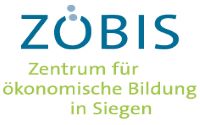

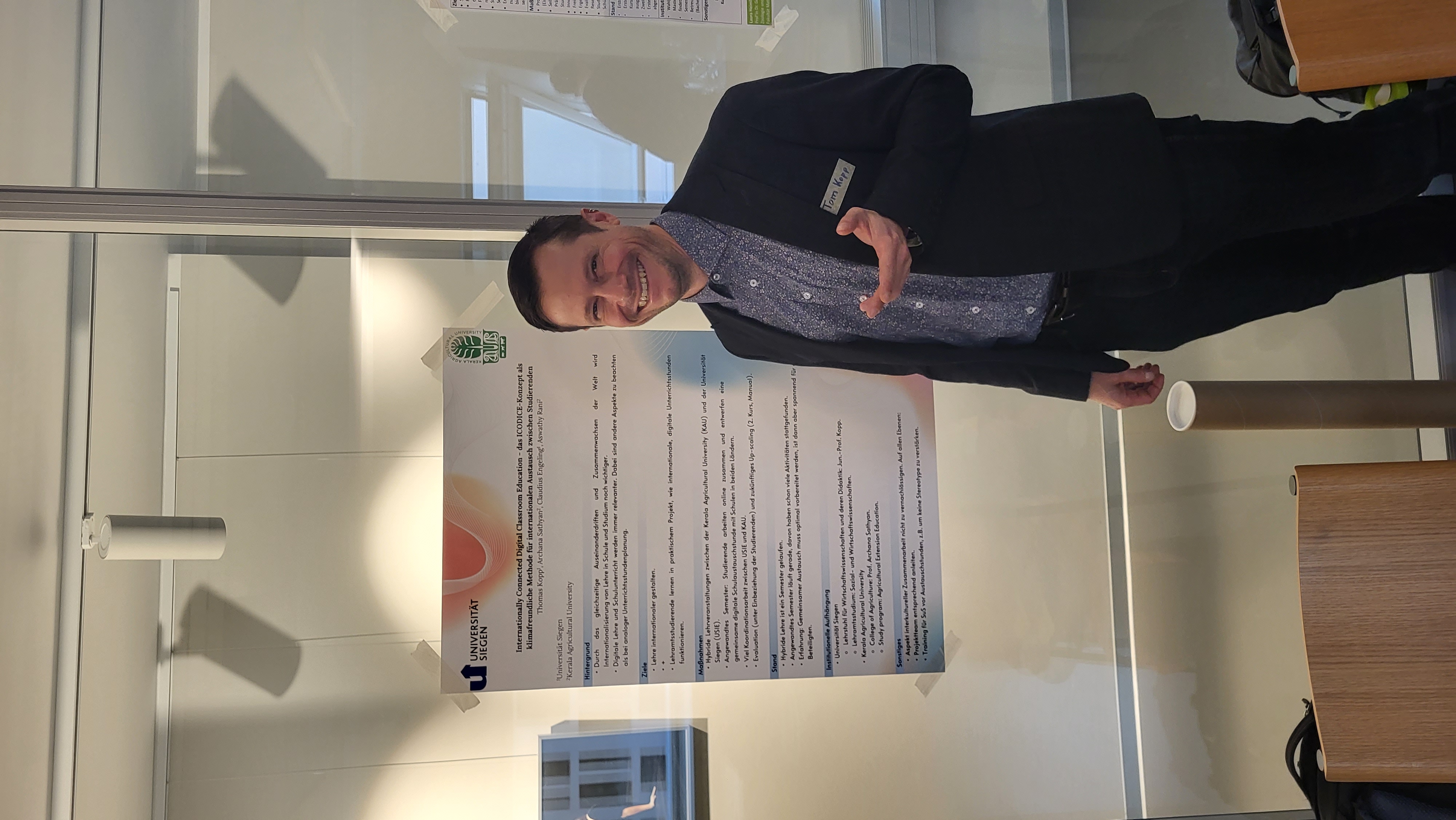
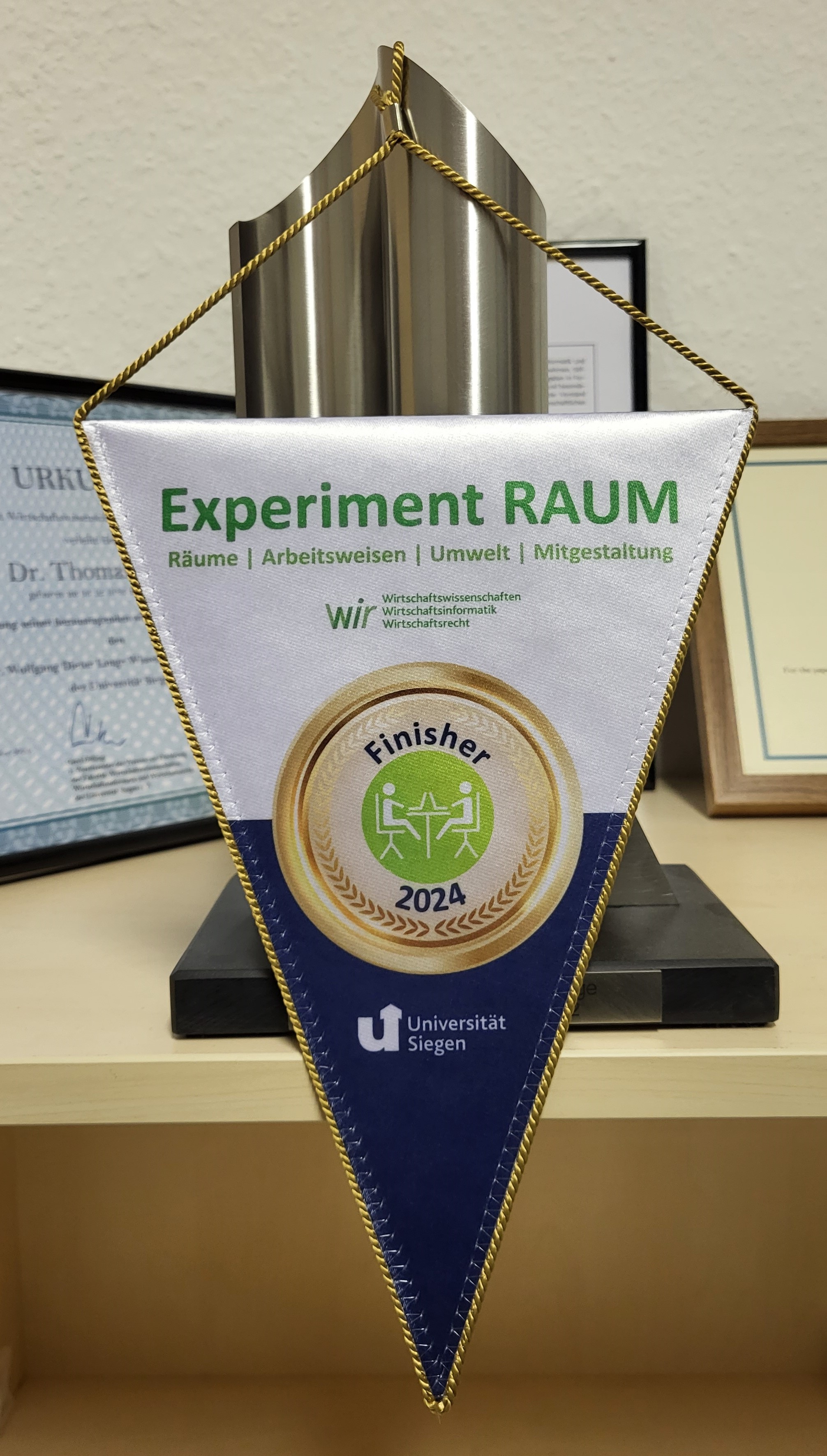


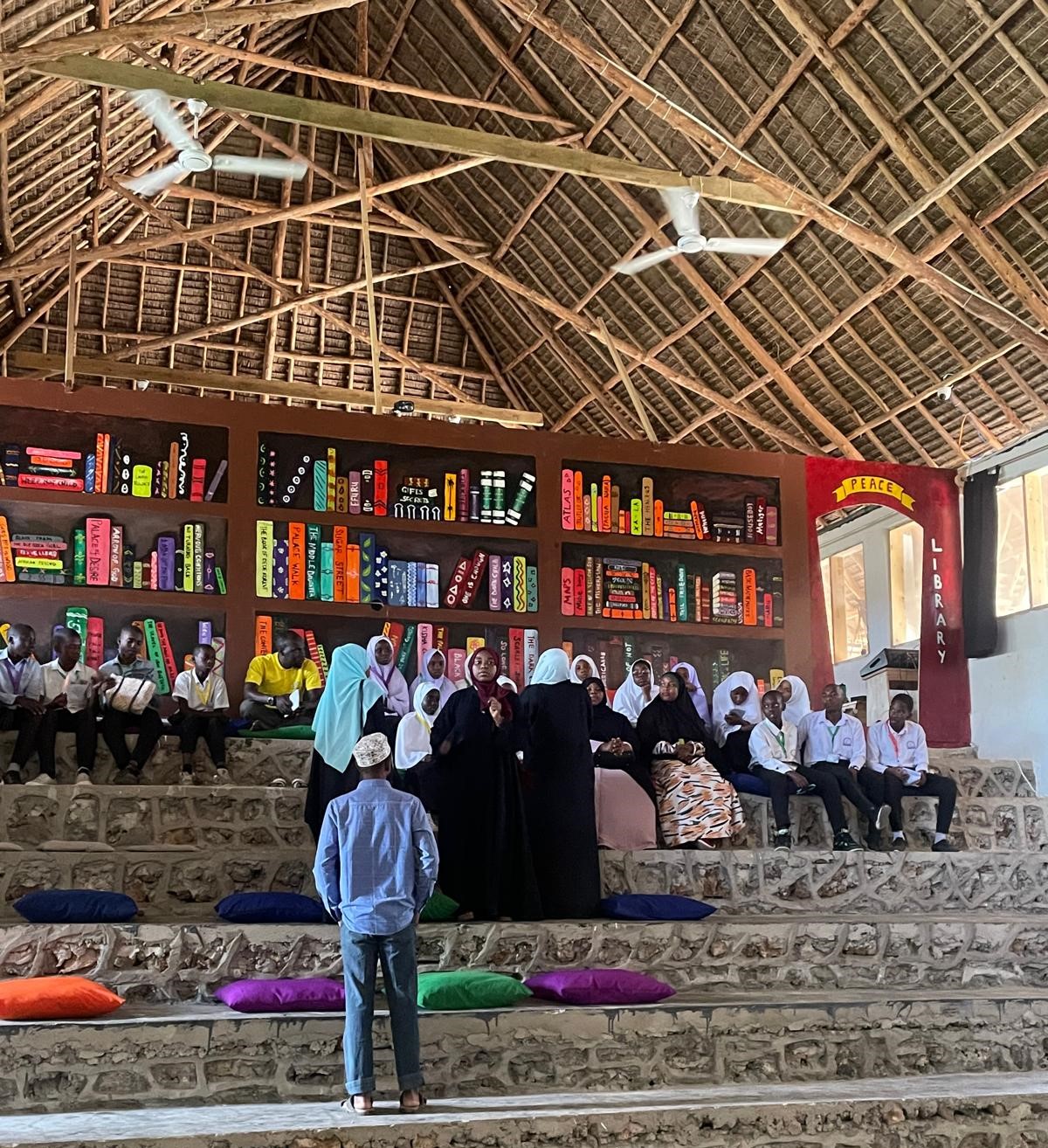
.jpg)
.jpg)
.jpg)
.jpg)
.jpg)
